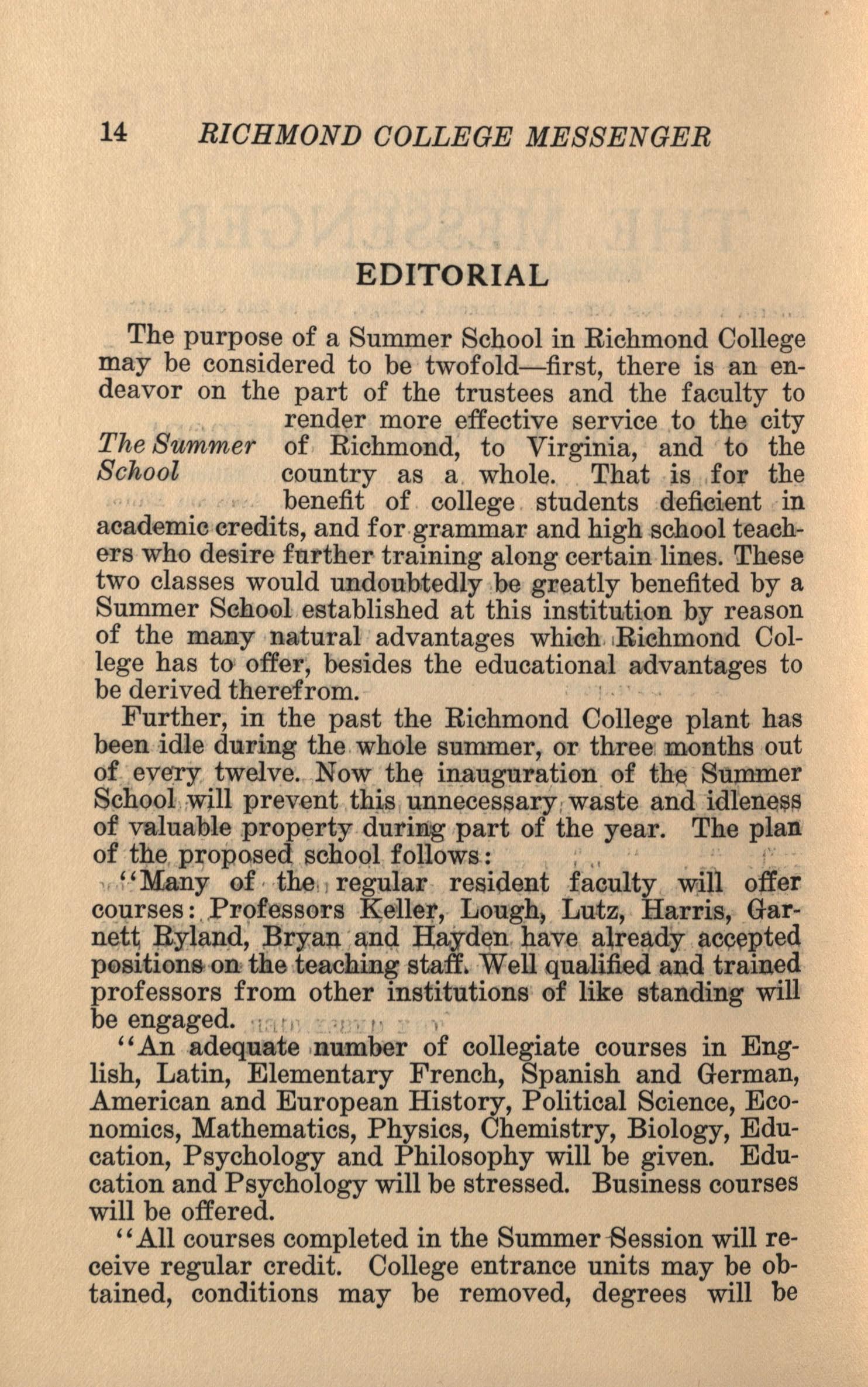

RICHMOND COLLEGE MESSENGER
EDITORIAL
The purpose of a Summer School in Richmond College may be considered to be twofold-first, there is an endeavor on the part of the trustees and the faculty to , render more effective service to the city The Summer of Richmond, to Virginia, and to the School country as a . whole . . That is ,for the , , ·. benefit of . college students deficient in academic credits, and for .grammar and high school teachers who desire fntther training along ce:r-tainlines. U:hese two classes would undouhtedly ,be g:r.eatly benefited by a Summer Scho@l,established at this institution b~ reason of the many natural advantages which , ,Richmond College has to 1 offer, besides the educational advantages to be derived therefrom.
Further, in the past the Richmond College plant has been idle dall'ing the .whole summer, or three 1,months out of eye:ry, twelve. ,Now th() in_auguration . of th!cl Summer S~hookwill prev .ent ,th~s, unn~ces1;1ary 1waste and idlen~fil~ of valuable ,prop~rty during part of the year. The plan of the , p:r;opqsed .schoQl follows .: ; .. · i:· ,, .f.'Many of , -the,, regJilaJI resident ~aculty , W]i.11offer courses: .,PF9fe-s~@rs~ellet, Lough) Lutz, H~rris, Garnet~ ~ylan~, ~r,y;an ·a,nq ~d~11. .µave alre~dy acv~pted p0sition& •OD.1the teaching -stafl\ Well qualified aiad trained professors from other institutions of like standing will be engaged. •t ,ri .·! , ,, ·,
"An adequate ,number of collegiate courses in English, Latin, Elementary French, Spanish and German, American and European History, Political Science, Economics, Mathematics, Physics, Chemistry, Biology, Education, Psychology and Philosophy will be given. Education and Psychology will be stressed. Business courses will be offered.
'' All courses completed in the Summer-Session will receive regular credit. College entrance units may be obtained, conditions may be removed, degrees will be
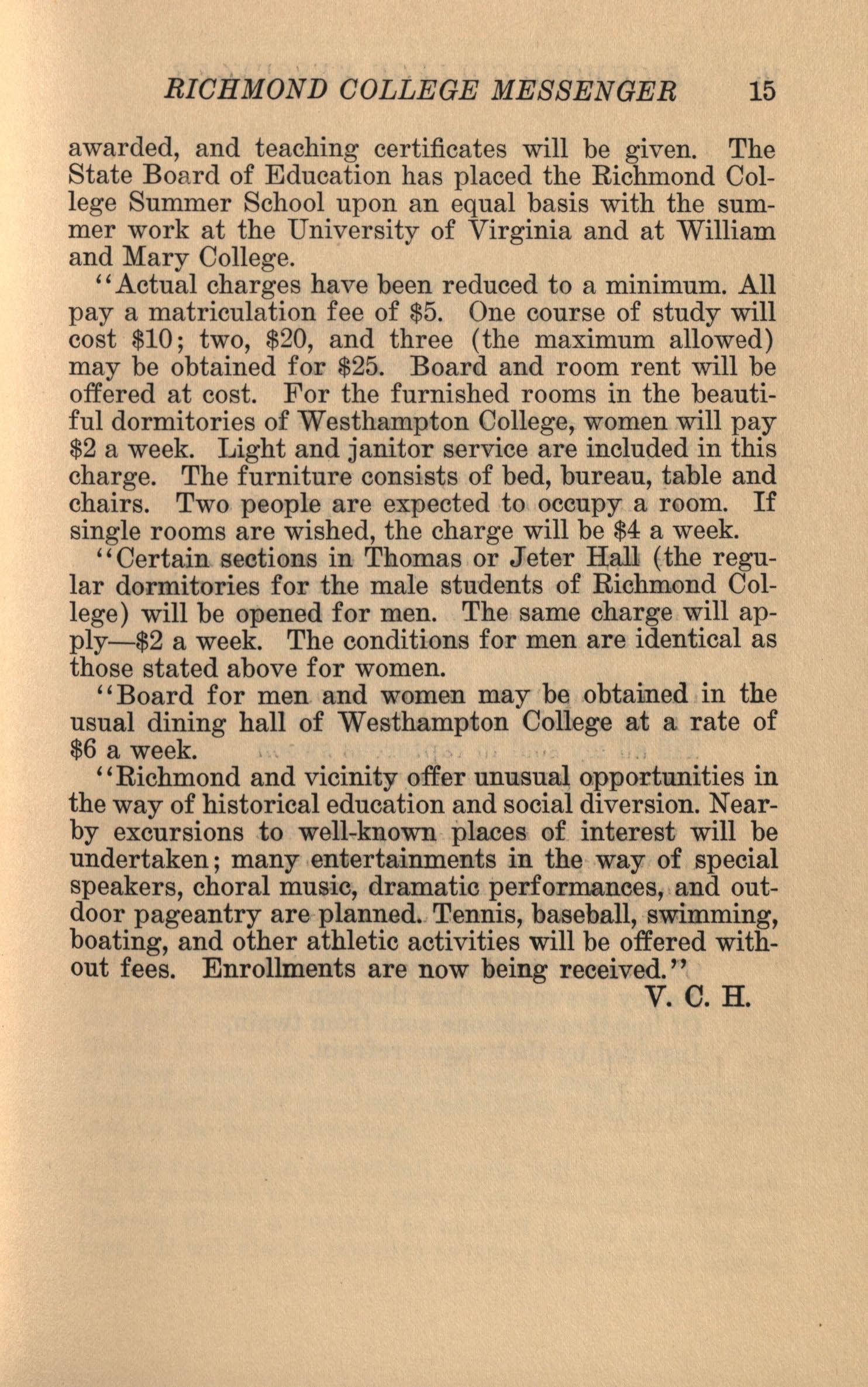
awarded, and teaching certificates will be given. The State Bo a rd of Education has placed the Richmond College Summer School upon an equal basis with the summer work at the University of Virginia and at William and Mary College.
'' Actual charges have been reduced to a minimum. All pay a matriculation fee of $5. One course of study will cost $10; two, $20, and three (the maximum allowed) may be obtained for $25. Board and room rent will be offered at cost. For the furnished rooms in the beautiful dormitories of Westhampton College, women will pay $2 a week. Light and janitor service are included in this charge. The furniture consists of bed, bureau, table and chairs. Two people are expected to occupy a r@om. If single rooms are wished, the charge will be $4 a week.
'' Certain sections in Thomas or Jeter H;al1 (the regular dormitories for the male students of Richmond College) will be opened for men. The same charge will apply-$2 a week. The conditions for men are identical as those stated above for women.
"Board for men and women may be obta:im.edin the usual dining hall of Westhampton College at a rate of $6 a week. . ,
'' Richmond and vicinity offer unusua\ 0:ppo:rtunities in the way of historical education and social diversion. Nearby excursions .to well-known places of interest will be undertaken; many ,entertainments in the way of special speakers, choral music, dramatic performances, ,and outdoor pageantry are planned .. Tennis, baseball, -swimming, boating, and other athletic activities will be offered without fees. Enrollments are now being receiv:ed."
V.C.H.
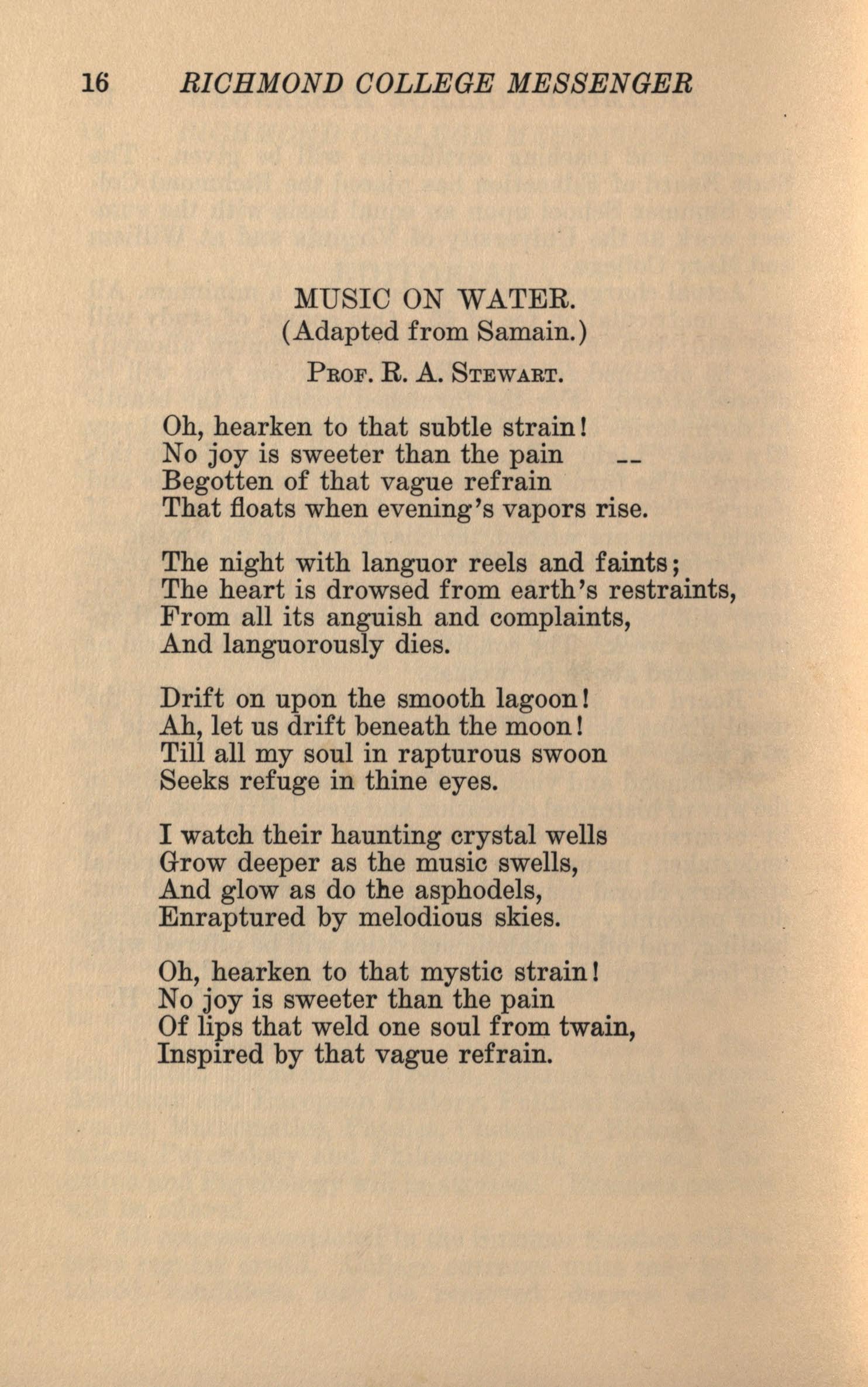
MUSIC ON WATER. (Adapted from Samain.)
PROF. R. A. STEWART.
Oh, hearken to that subtle strain! No joy is sweeter than the pain
Begotten of that vague refrain That floats when evening's vapors rise.
The night with languor reels and faints; The heart is drowsed from earth's restraints, From all its anguish and complaints, And languorously dies.
Drift on upon the smooth lagoon! Ah, let us drift beneath the moon! Till all my soul in rapturous swoon
Seeks refuge in thine eyes.
I watch their haunting crystal wells Grow deeper as the music swells, And glow as do the asphodels, Enraptured by melodious skies.
Oh, hearken to that mystic strain! No joy is sweeter than the pain Of lips that weld one soul from twain, Inspired by that vague refrain.
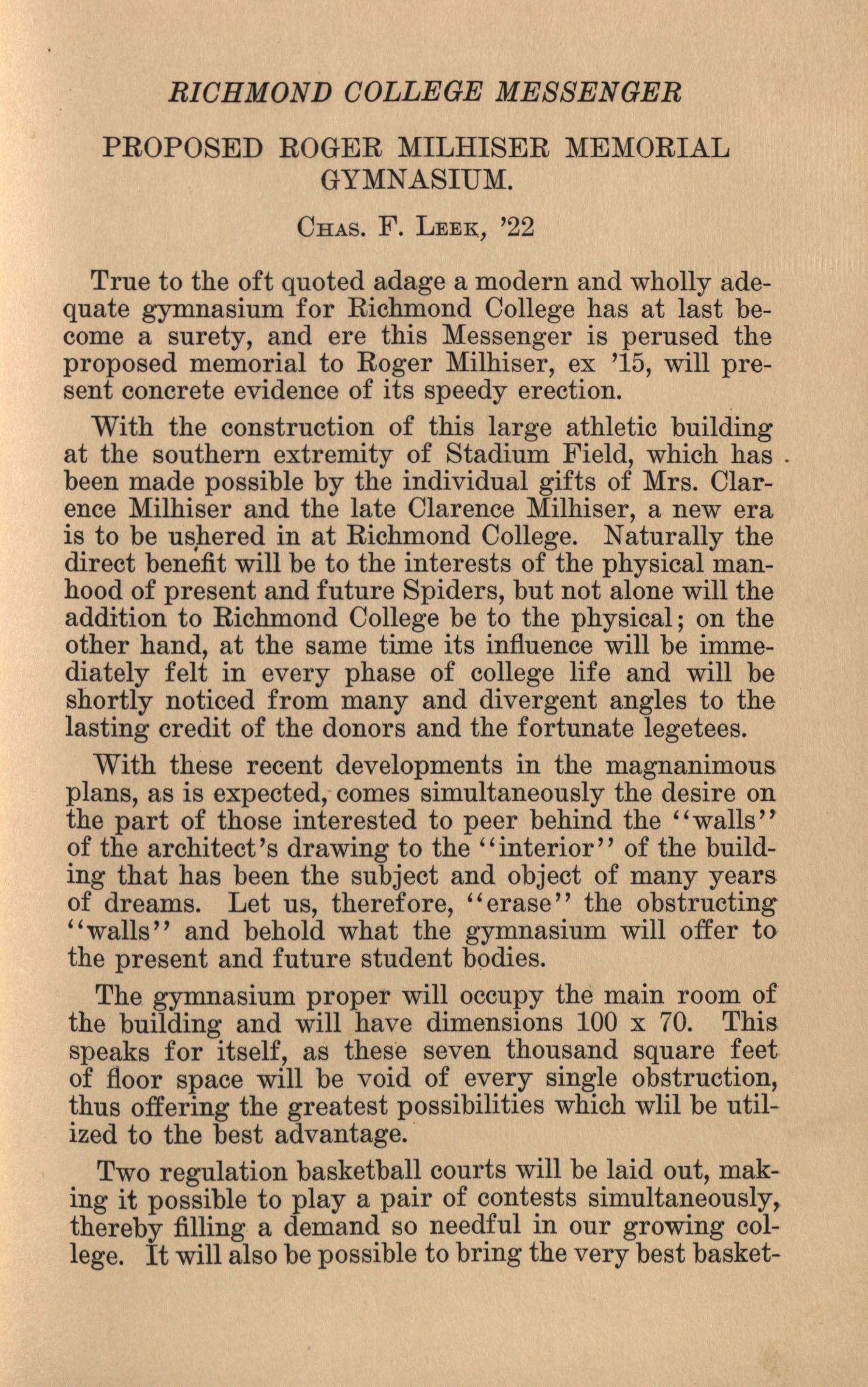
RICHMOND COLLEGE MESSENGER
PROPOSED ROGER MILHISER MEMORIAL GYMNASIUM.
CHAS. F. LEEE:, '22
True to the oft quoted adage a modern and wholly adequate gymnasium for Richmond College has at last become a surety, and ere this Messenger is perused the proposed memorial to Roger Milhiser, ex '15, will present concrete evidence of its speedy erection.
With the construction of this large athletic building at the southern extremity of Stadium Field, which has . been made possible by the individual gifts of Mrs. Clarence Milhiser and the late Clarence Milhiser, a new era is to be us,hered in at Richmond College. Naturally the direct benefit will be to the interests of the physical manhood of present and future Spiders, but not alone will the addition to Richmond College be to the physical; on the other hand, at the same time its influence will be immediately felt in every phase of college life and will be shortly noticed from many and divergent angles to the lasting credit of the donors and the fortunate legetees.
With these recent developments in the magnanimous plans, as is expected, comes simultaneously the desire on the part of those interested to peer behind the ''walls'' of the architect's drawing to the "interior" of the building that has been the subject and object of many years of dreams. Let us, therefore, ''erase'' the obstructing "walls" and behold what the gymnasium will offer to the present and future student bodies.
The gymnasium proper will occupy the main room of the building and will have dimensions 100 x 70. This speaks for itself, as these seven thousand square feet of floor space will be void of every single obstruction, thus offering the greatest possibilities which wlil be utilized to the best advantage. ·
Two regulation basketball courts will be laid out, making it possible to play a pair of contests simultaneously, thereby filling a demand so needful in our growing college. It will also be possible to bring the very best basket-
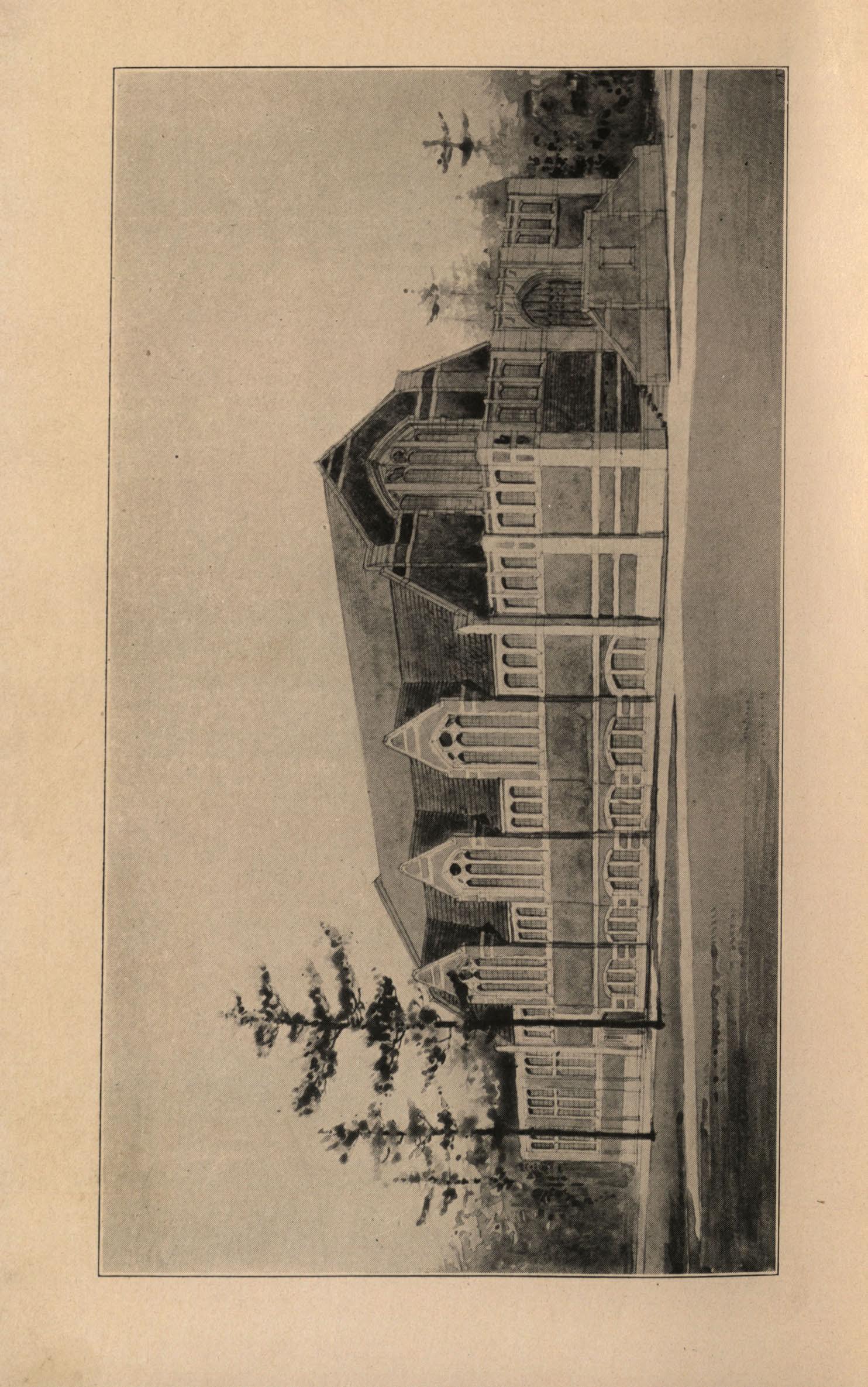
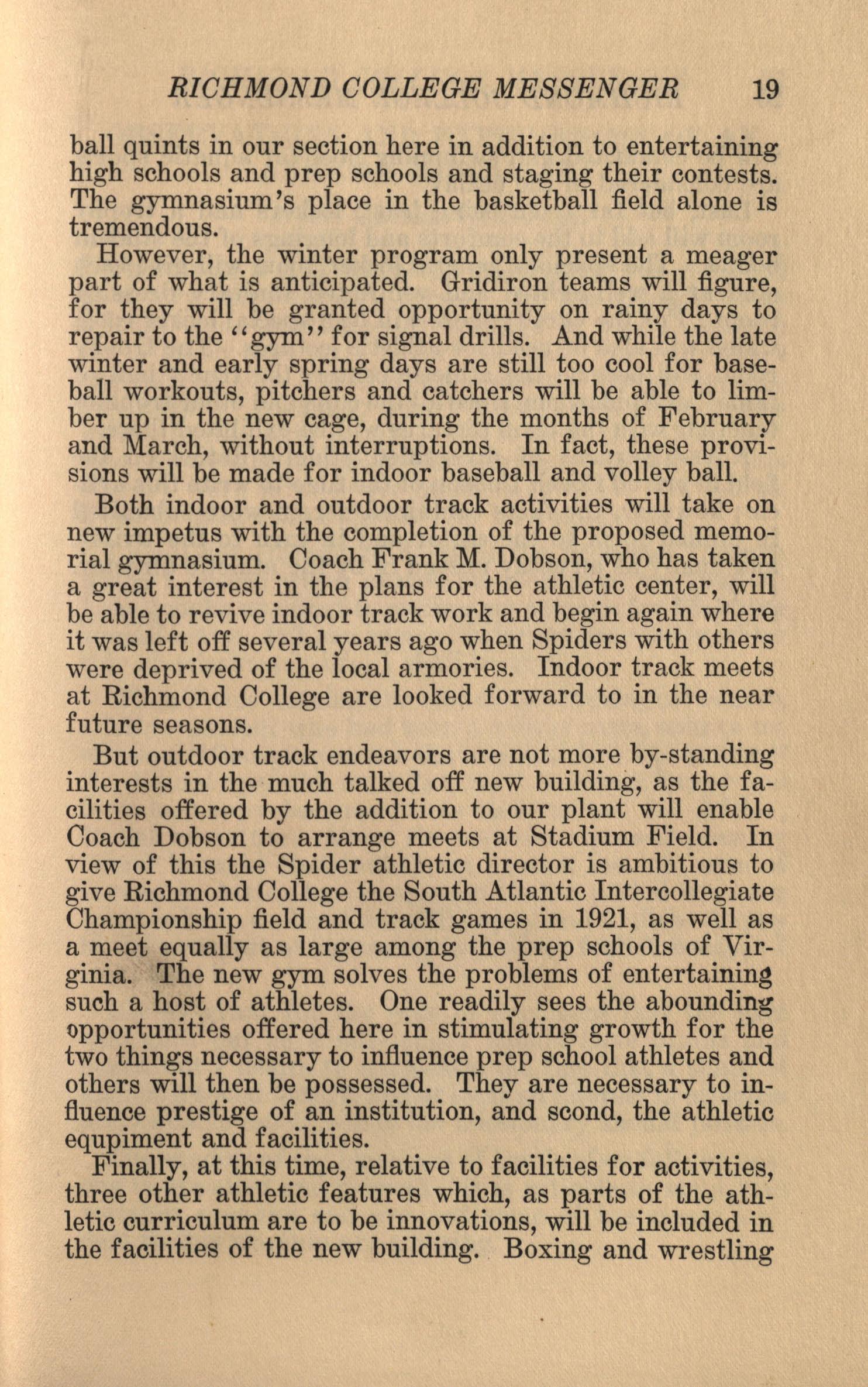
ball quints in our section here in addition to entertaining high schools and prep schools and staging their contests. The gymnasium's place in the basketball field alone is tremendous.
However, the winter program only present a meager part of what is anticipated. Gridiron teams will figure, for they will be granted opportunity on rainy days to repair to the" gym" for signal drills. And while the late winter and early spring days are still too cool for baseball workouts, pitchers and catchers will be able to limber up in the new cage, during the months of February and March, without interruptions. In fact, these provisions will be made for indoor baseball and volley ball.
Both indoor and outdoor track activities will take on new impetus with the completion of the proposed memorial gymnasium.
Coach Frank M. Dobson, who has taken a great interest in the plans for the athletic center, will be able to revive indoor track work and begin again where it was left off several years ago when Spiders with others were deprived of the local armories. Indoor track meets at Richmond College are looked forward to in the near future seasons.
But outdoor track endeavors are not more by-standing interests in the much talked off new building, as the facilities offered by the addition to our plant will enable Coach Dobson to arrange meets at Stadium Field. In view of this the Spider athletic director is ambitious to give Richmond College the South Atlantic Intercollegiate Championship field and track games in 1921, as well as a meet equally as large among the prep schools of Virginia. The new gym solves the problems of entertaining such a host of athletes. One readily sees the abounding opportunities offered here in stimulating growth for the two things necessary to influence prep school athletes and others will then be possessed. They are necessary to influence prestige of an institution, and scond, the athletic equpiment and facilities.
Finally, at this time, relative to facilities for activities, three other athletic features which, as parts of the athletic curriculum are to be innovations, will be included in the facilities of the new building . . Boxing and wrestling
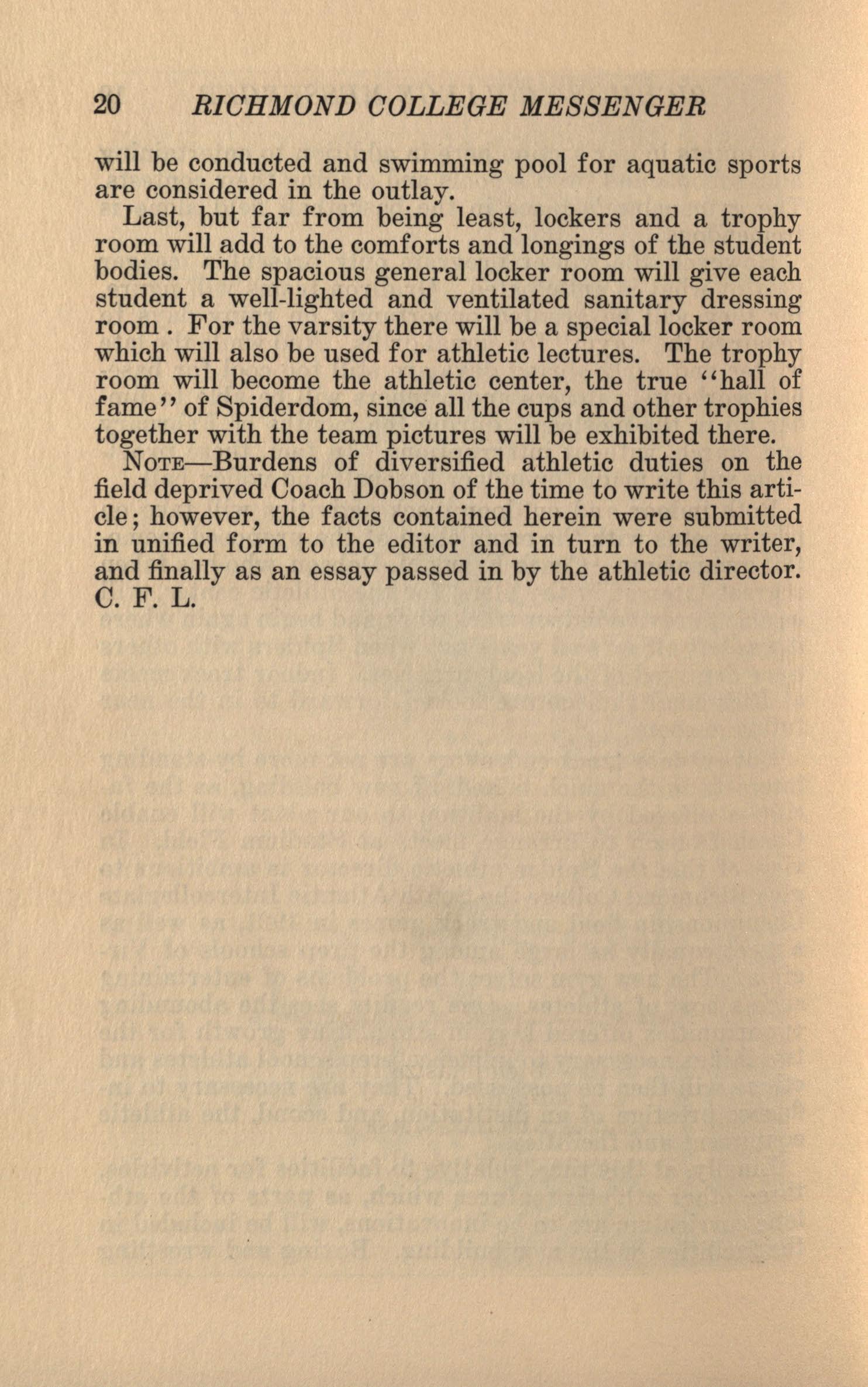
20 RICHMOND COLLEGE MESSENGER
will be conducted and swimming pool for aquatic sports are considered in the outlay.
Last, but far from being least, lockers and a trophy room will add to the comforts and longings of the student bodies. The spacious general locker room will give each student a well-lighted and ventilated sanitary dressing room . For the varsity there will be a special locker room which will also be used for athletic lectures. The trophy room will become the athletic center, the true "hall of fame'' of Spiderdom, since all the cups and other trophies together with the team pictures will be exhibited there.
NoTE-Burdens of diversified athletic duties on the field deprived Coach Dobson of the time to write this article; however, the facts contained herein were submitted in unified form to the editor and in turn to the writer, and :finally as an essay passed in by the athletic director. C. F. L.
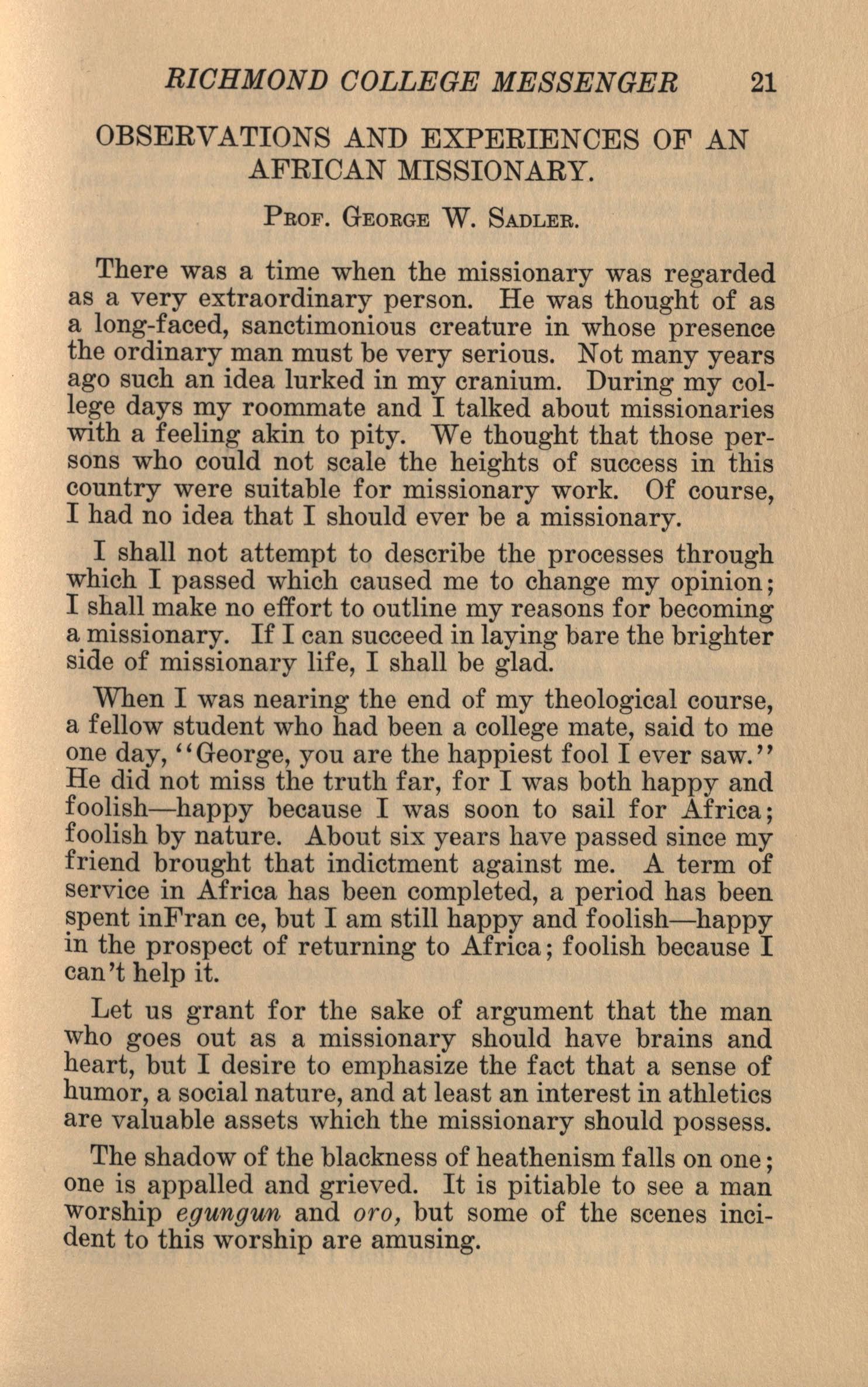
OBSERVATIONS AND EXPERIENCES OF AN AFRICAN MISSIONARY.
PROF. GEORGE w. SADLER.
There was a time when the missionary was regarded as a very extraordinary person. He was thought of as a long-faced, sanctimonious creature in whose presence the ordinary man must be very serious. Not many years ago such an idea lurked in my cranium. During my college days my roommate and I talked about missionaries with a feeling akin to pity. We thought that those persons who could not scale the heights of success in this country were suitable for missionary work. Of course, I had no idea that I should ever be a missionary.
I shall not attempt to describe the processes through which I passed which caused me to change my opinion; I shall make no effort to outline my reasons for becoming a missionary. If I can succeed in laying bare the brighter side of missionary life, I shall be glad.
When I was nearing the end of my theological course, a fell ow student who had been a college mate, said to me one day, "George, you are the happiest fool I ever saw." He did not miss the truth far, for I was both happy and foolish-happy because I was soon to sail for Africa; foolish by nature. About six years have passed since my friend brought that indictment against me. A term of service in Africa has been completed, a period has been spent inFran ce, but I am still happy and foolish-happy in the prospect of returning to Africa; foolish because I can't help it.
Let us grant for the sake of argument that the man who goes out as a missionary should have brains and heart, but I desire to emphasize the fact that a sense of humor, a social nature, and at least an interest in athletics are valuable assets which the missionary should possess.
The shadow of the blackness of heathenism falls on one; one is appalled and grieved. It is pitiable to see a man worship egungun and oro, but some of the scenes incident to this worship are amusing.
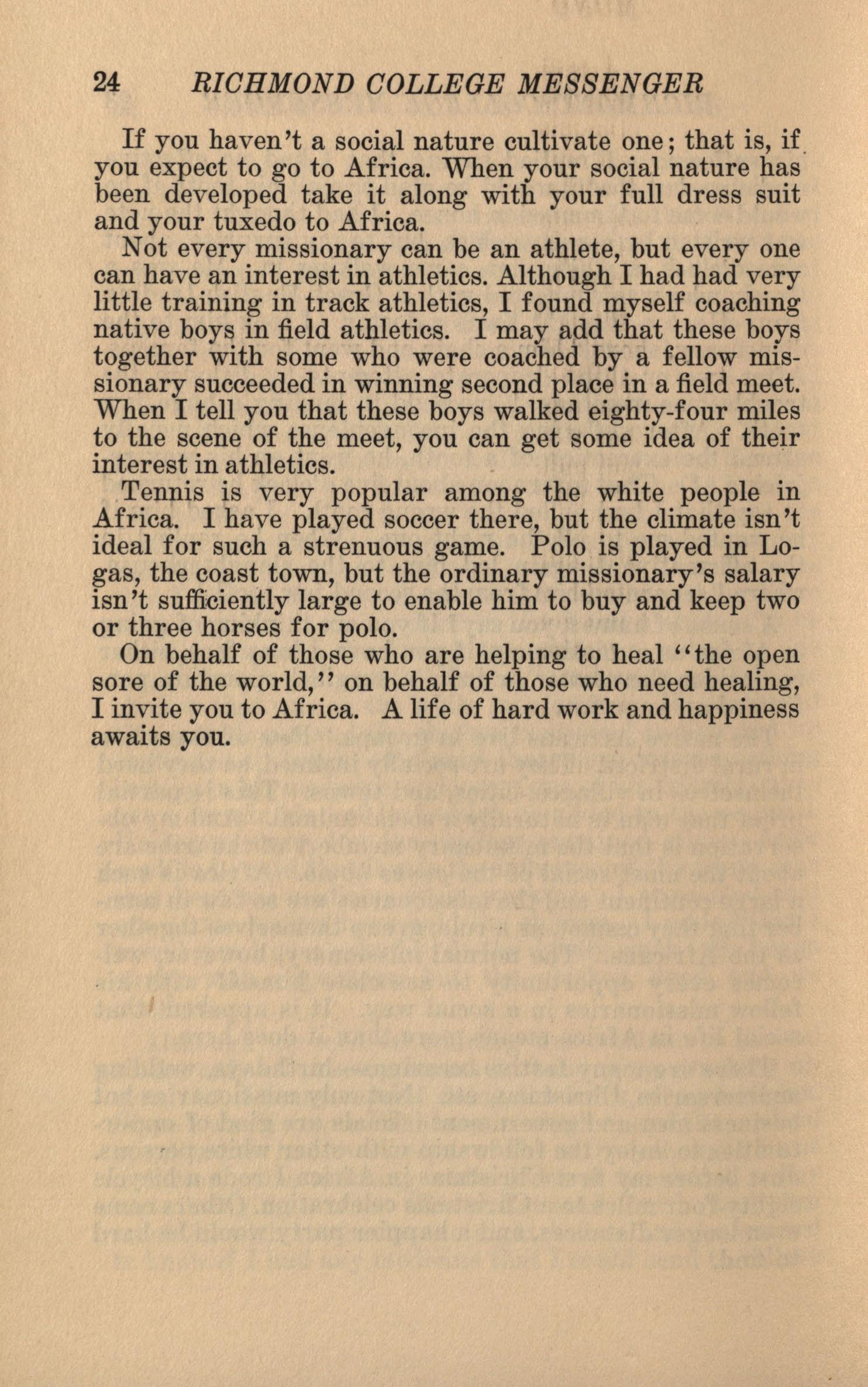
24 RICHMOND COLLEGE MESSENGER
If you haven't a social nature cultivate one; that is, if . you expect to go to Africa. When your social nature has been developed take it along with your full dress suit and your tuxedo to Africa.
Not every missionary can be an athlete, but every one can have an interest in athletics. Although I had had very little training in track athletics, I found myself coaching native boys in field athletics. I may add that these boys together with some who were coached by a fell ow missionary succeeded in winning second place in a field meet. When I tell you that these boys walked eighty-four miles to the scene of the meet, you can get some idea of their interest in athletics.
Tennis is very popular among the white people in Africa. I have played soccer there, but the climate isn't ideal for such a strenuous game. Polo is played in Logas, the coas~ town, but the ordinary missionary's salary isn't sufficiently large to enable him to buy and keep two or three horses for polo.
On behalf of those who are helping to heal "the open sore of the world,'' on behalf of those who need healing, I invite you to Africa. A life of hard work and happiness awaits you.
ROLL OF HONOR-WINTER TERM, 1920.
5 A's.
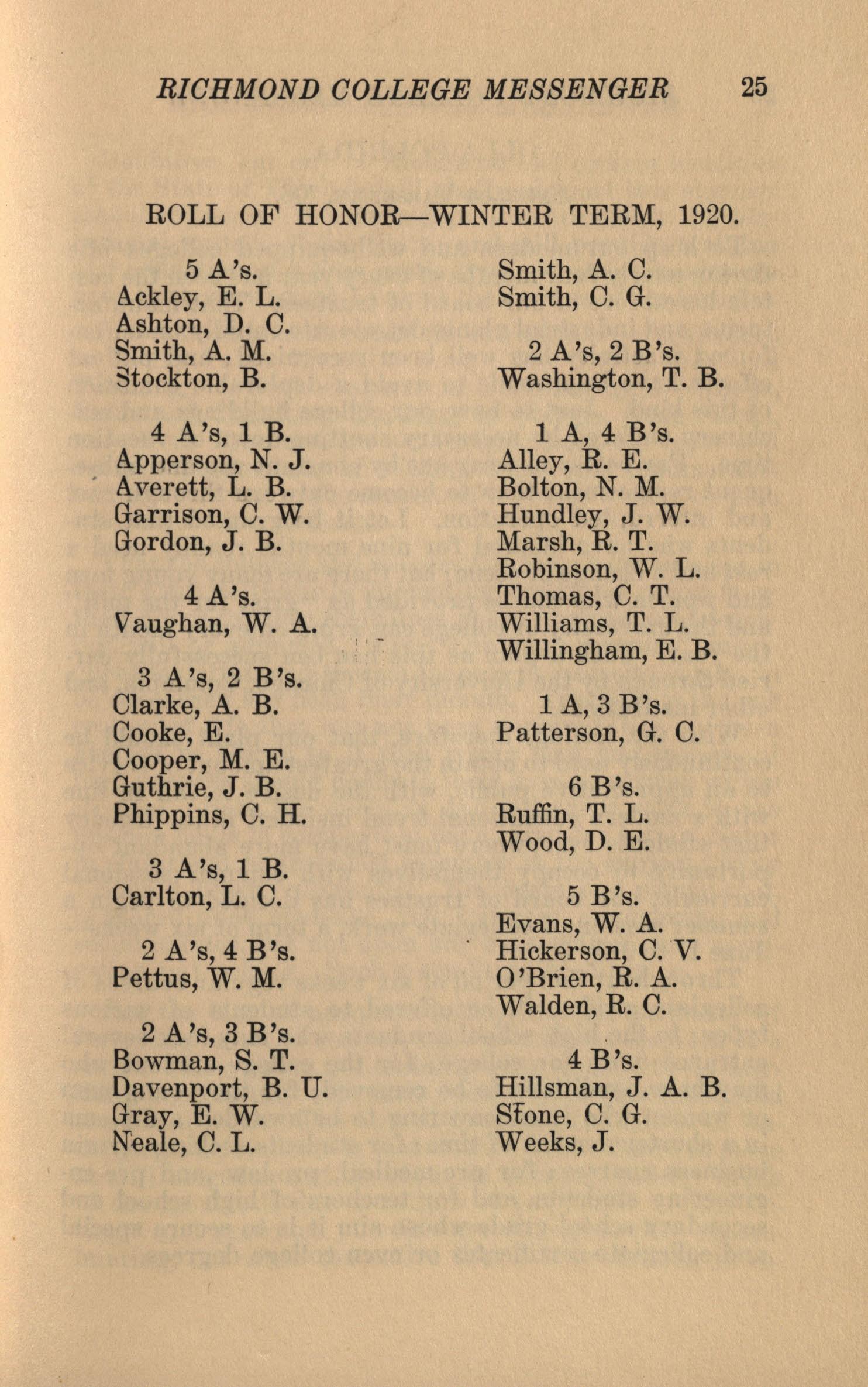
Smith, A. C.
Ackley, E. L. Smith, C. G. Ashton, D. C.
Smith, A. M.
2 A's, 2 B's. Stockton, B. Washington, T. B.
4 A's, 1 B.
1 A, 4 B's. Apperson, N. J. Alley, R. E. Averett, L. B. Bolton, N. M. Garrison, C. W. Hundley, J. W. Gordon, J. B. Marsh, R. T. Robinson, W. L.
4A's. Thomas, C. T. Vaughan, W. A. · Williams, T. L. Willingham, E. B.
3 A's, 2 B's.
Clarke, A. B.
1 A, 3 B's. Cooke, E. Patterson, G. C. Cooper, M. E. Guthrie, J. B.
6 B's. Phippins, C. H. Ruffin, T. L. Wood, D. E.
3 A's, 1 B. Carlton, L. C.
5 B's. Evans, W. A.
2 A's, 4 B's. Hickerson, C. V. Pettus, W. M. 0 'Brien, R. A. Walden, R. C.
2 A's, 3 B's. Bowman, S. T.
4 B's. Davenport, B. U. Hillsman, J. A. B. Gray, E.W. Stone, C. G. N'eale, C. L. Weeks, J.
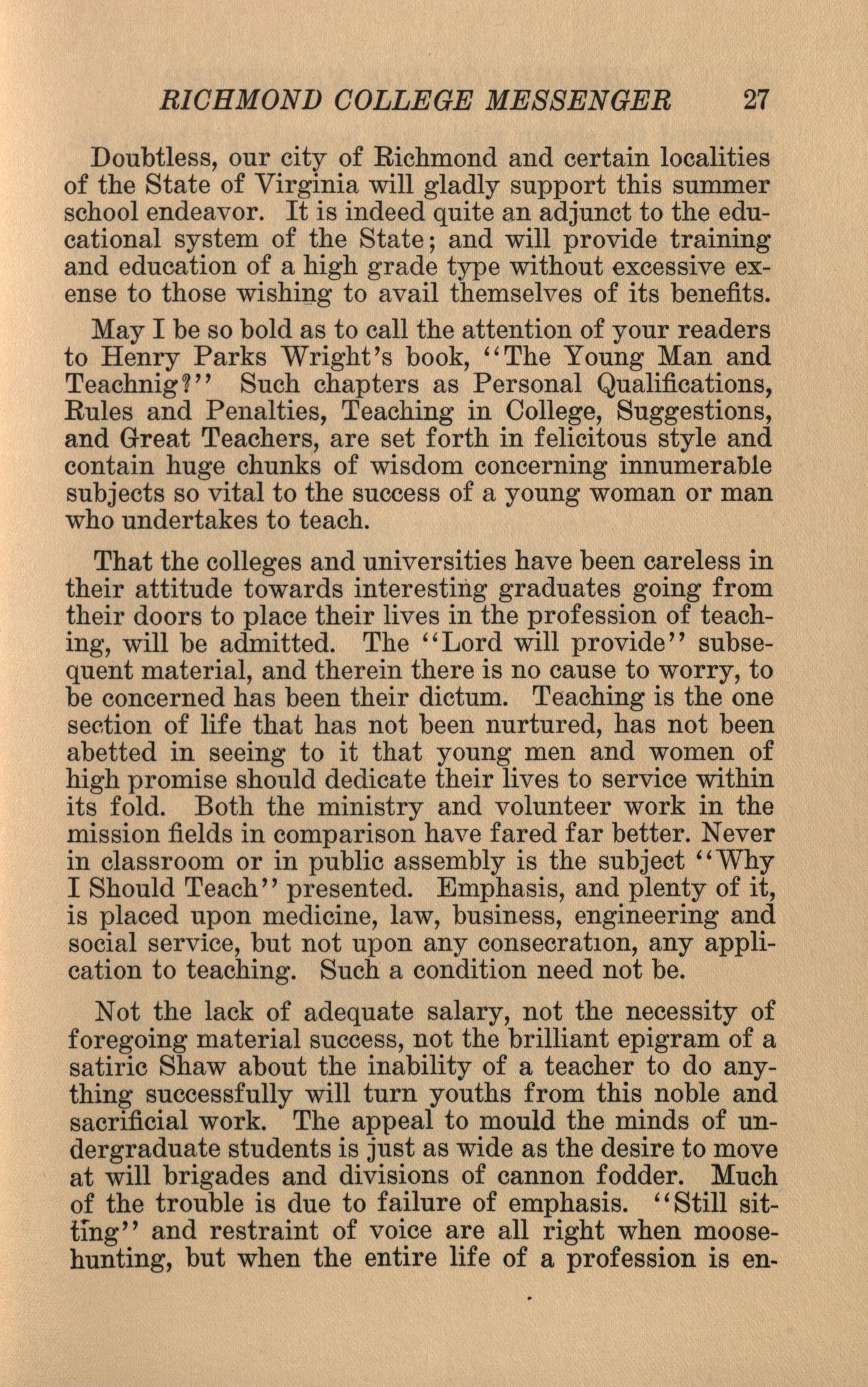
Doubtless, our city of Richmond and certain localities of the State of Virginia will gladly support this summer school endeavor. It is indeed quite an adjunct to the educational system of the State; and will provide training and education of a high grade type without excessive exense to those wiship_g to avail themselves of its benefits.
May I be so bold as to call the attention of your readers to Henry Parks Wright's book, "The Young Man and Teachnig 1" Such chapters as Personal Qualifications, Rules and Penalties, Teaching in College, Suggestions, and Great Teachers, are set forth in felicitous style and contain huge chunks of wisdom concerning innumerable subjects so vital to the success of a young woman or man who undertakes to teach.
That the colleges and universities have been careless in their attitude towards interesting graduates going from their doors to place their lives in the profession of teaching, will be admitted. The '' Lord will provide'' subsequent material, and therein there is no cause to worry, to be concerned has been their dictum. Teaching is the one section of life that has not been nurtured, has not been abetted in seeing to it that young men and women of high promise should dedicate their lives to service within its fold. Both the ministry and volunteer work in the mission fields in comparison have fared far better. Never in classroom or in public assembly is the subject "Why I Should Teach'' presented. Emphasis, and plenty of it, is placed upon medicine, law, business, engineering and social service, but not upon any consecration, any application to teaching. Such a condition need not be.
Not the lack of adequate salary, not the necessity of foregoing material success, not the brilliant epigram of a satiric Shaw about the inability of a teacher to do anything successfully will turn youths from this noble and sacrificial work. The appeal to mould the minds of undergraduate students is just as wide as the desire to move at will brigades and divisions of cannon fodder. Much of the trouble is due to failure of emphasis. '' Still sitting" and restraint of voice are all right when moosehunting, but when the entire life of a profession is en-
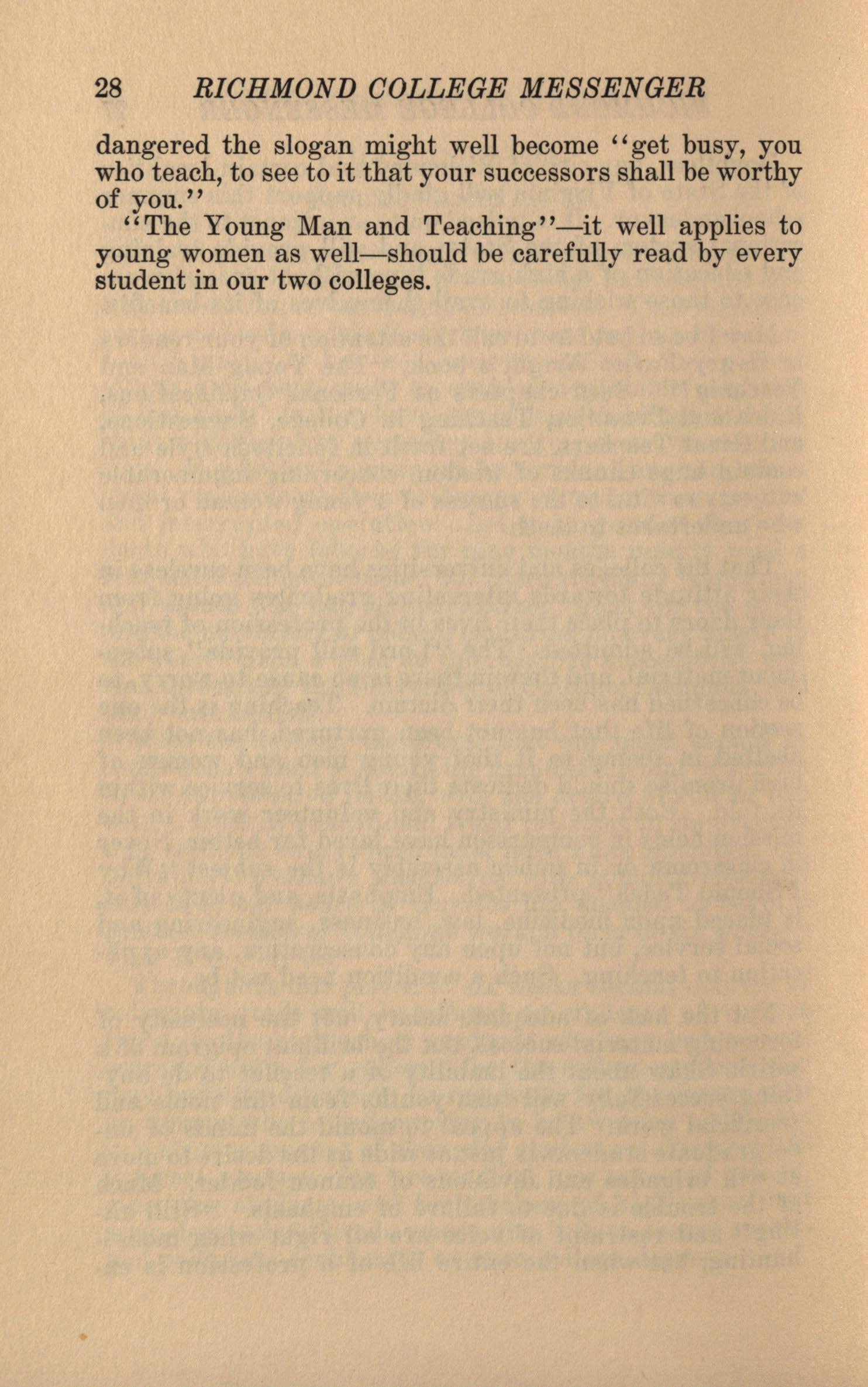
28 RICHMOND COLLEGE MESSENGER
dangered the slogan might well become '' get busy, you who teach, to see to it that your successors shall be worthy of you.''
"The Young Man and Teaching"-it well applies to young women as well-should be carefully read by every student in our two colleges.
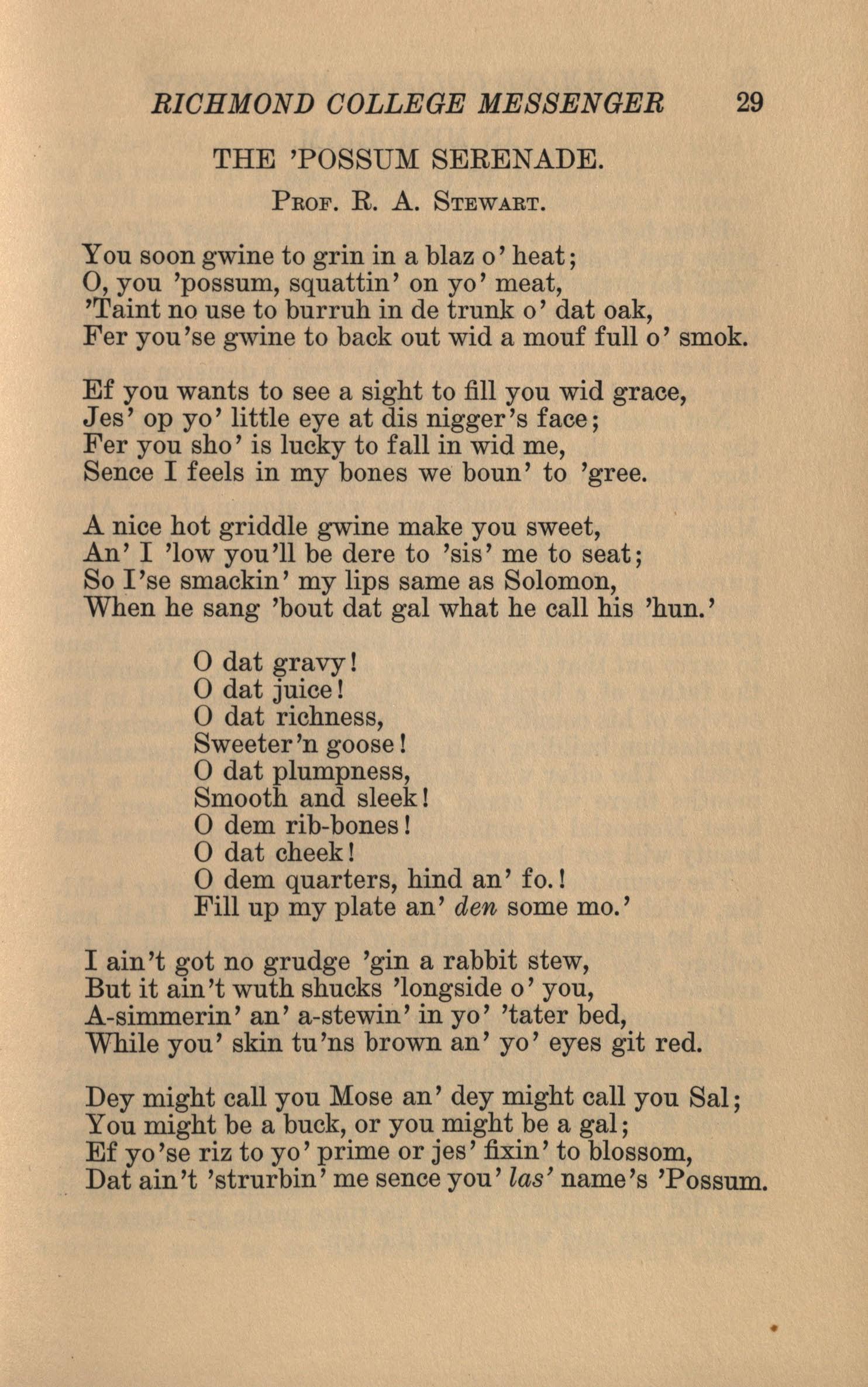
THE 'POSSUM SERENADE.
PROF. R. A. STEW ART.
You soon gwine to grin in a blaz o' heat; 0, you 'possum, squattin' on yo' meat, 'Taint no use to burruh in de trunk o' dat oak, Fer you 'se gwine to back out wid a mouf full o' smok.
Ef you wants to see a sight to fill you wid grace, Jes' op yo' little eye at dis nigger's face ; Fer you sho' is lucky to fall in wid me, Sence I feels in my bones we boun' to 'gree.
A nice hot griddle gwine make you sweet, An' I 'low you '11be dere to 'sis' me to seat; So l'se smackin' my lips same as Solomon, When he sang 'bout dat gal what he call his 'hun.'
0 dat gravy!
0 dat juice!
0 dat richness, Sweeter 'n goose !
0 dat plumpness, Smooth and sleek!
0 dem rib-bones !
0 dat cheek!
0 dem quarters, hind an' fo. ! Fill up my plate an' den some mo.'
I ain't got no grudge 'gin a rabbit stew, But it ain't wuth shucks 'longside o' you, A-simmerin' an' a-stewin' in yo' 'tater bed, While you' skin tu 'ns brown an' yo' eyes git red.
Dey might call you Mose an' dey might call you Sal; You might be a buck, or you might be a gal; Ef yo 'se riz to yo' prime or jes' :fixin' to blossom, Dat ain't 'strurbin' me sence you' las' name's 'Possum .
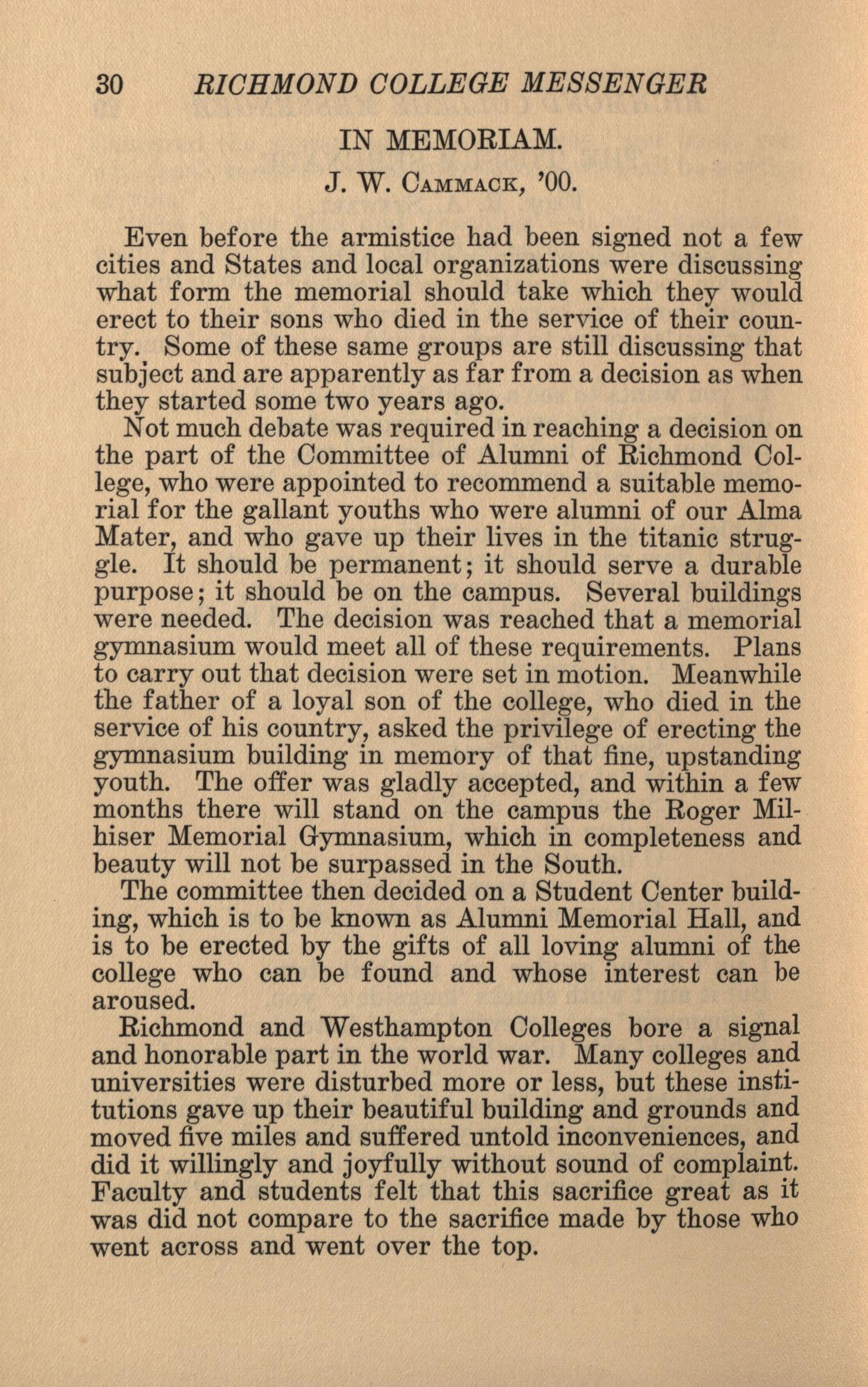
30 RICHMOND COLLEGE MESSENGER
IN MEMORIAM.
J. w. CAMMACK, '00.
Even before the armistice had been signed not a few cities and States and local organizations were discussing what form the memorial should take which they would erect to their sons who died in the service of their country. Some of these same groups are still discussing that subject and are apparently as far from a decision as when they started some two years ago.
Not much debate was required in reaching a decision on the part of the Committee of Alumni of Richmond College, who were appointed to recommend a suitable memorial for the gallant youths who were alumni of our Alma Mater, and who gave up their lives in the titanic struggle. It should be permanent; it should serve a durable purpose; it should be on the campus. Several buildings were needed. The decision was reached that a memorial gymnasium would meet all of these requirements. Plans to carry out that decision were set in motion. Meanwhile the father of a loyal son of the college, who died in the service of his country, asked the privilege of erecting the gymnasium building in memory of that fine, upstanding youth. The offer was gladly accepted, and within a few months there will stand on the campus the Roger Milhiser Memorial Gymnasium, which in completeness and beauty will not be surpassed in the South.
The committee then decided on a Student Center building, which is to be known as Alumni Memorial Hall, and is to be erected by the gifts of all loving alumni of the college who can be found and whose interest can be aroused.
Richmond and Westhampton Colleges bore a signal and honorable part in the world war. Many colleges and universities were disturbed more or less, but these institutions gave up their beautiful building and grounds and moved five miles and suffered untold inconveniences, and did it willingly and joyfully without sound of complaint. Faculty and students felt that this sacrifice great as it was did not compare to the sacrifice made by those who went across and went over the top.
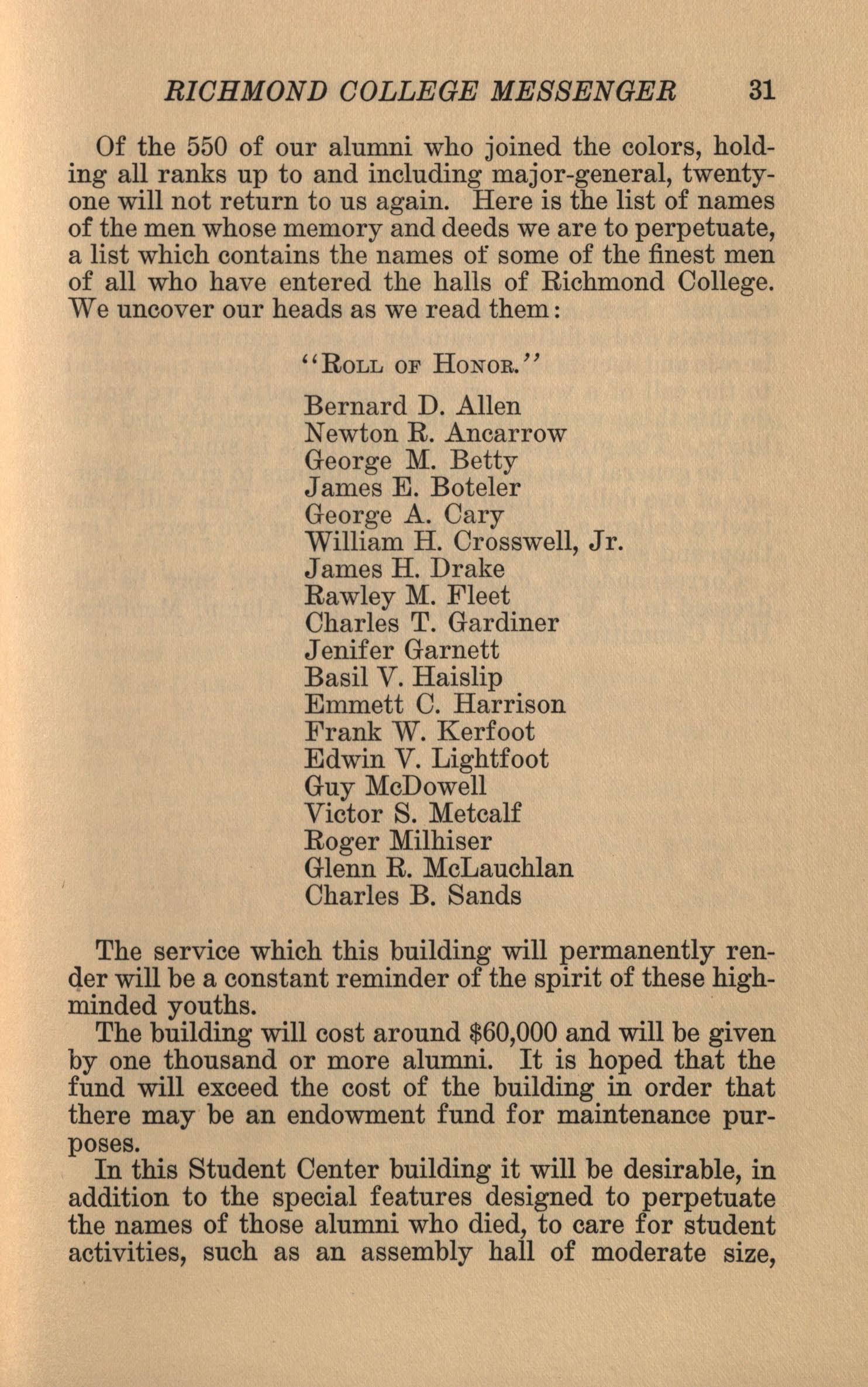
RICHMOND COLLEGE MESSENGER
Of the 550 of our alumni who joined the colors, holding all ranks up to and including major-general, twentyone will not return to us again. Here is the list of names of the men whose memory and deeds we are to perpetuate, a list which contains the names of some of the :finest men of all who have entered the halls of Richmond College. We uncover our heads as we read them:
'' ROLL OF HONOR.''
Bernard D. Allen
Newton R. Ancarrow
George M. Betty
James E. Boteler
George A. Cary
William H. Crosswell, Jr.
James H. Drake
Rawley M. Fleet
Charles T. Gardiner
Jenifer Garnett
Basil V. Haislip
Emmett C. Harrison
Frank W. Kerfoot
Edwin V. Lightfoot
Guy McDowell
Victor S. Metcalf
Roger Milhiser
Glenn R. McLauchlan
Charles B. Sands
The service which this building will permanently renq.er will be a constant reminder of the spirit of these highminded youths.
The building will cost around $60,000 and will be given by one thousand or more alumni. It is hoped that the fund will exceed the cost of the building in order that there may be an endowment fund for maintenance purposes.
In this Student Center building it will be desirable, in addition to the special features designed to perpetuate the names of those alumni who died, to care for student activities, such as an assembly hall of moderate size,
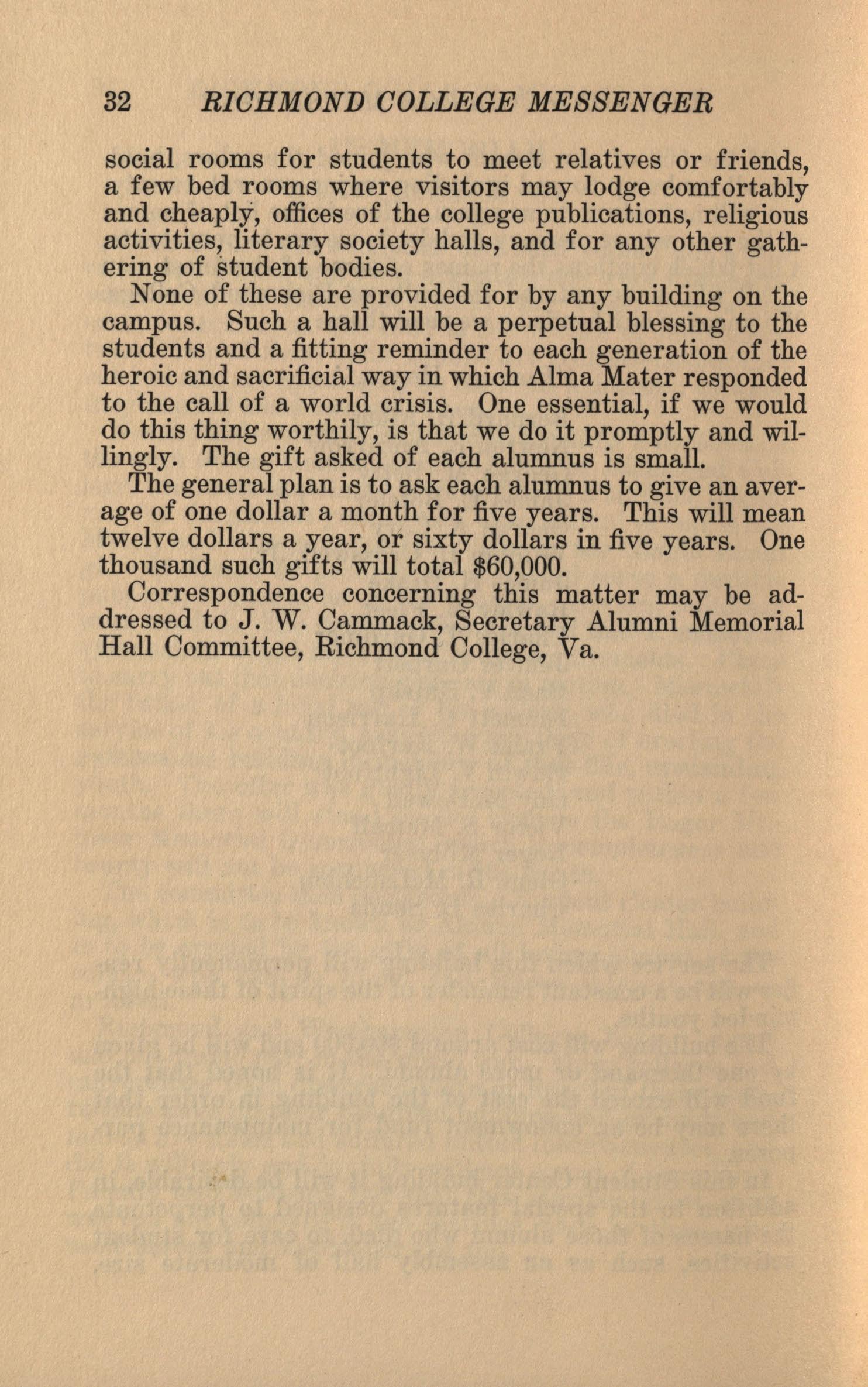
32 RICHMOND COLLEGE MESSENGER
social rooms for students to meet relatives or friends, a few bed rooms where visitors may lodge comfortably and cheaply, offices of the college publications, religious activities, literary society halls, and for any other gathering of student bodies.
None of these are provided for by any building on the campus. Such a hall will be a perpetual blessing to the students and a fitting reminder to each generation of the heroic and sacrificial way in which Alma Mater responded to the call of a world crisis. One essential, if we would do this thing worthily, is that we do it promptly and willingly. The gift asked of each alumnus is small.
The general plan is to ask each alumnus to give an average of one dollar a month for five years. This will mean twelve dollars a year, or sixty dollars in five years. One thousand such gifts will total $60,000.
Correspondence concerning this matter may be addressed to J. W. Cammack, Secretary Alumni Memorial Hall Committee, Richmond College, Va.
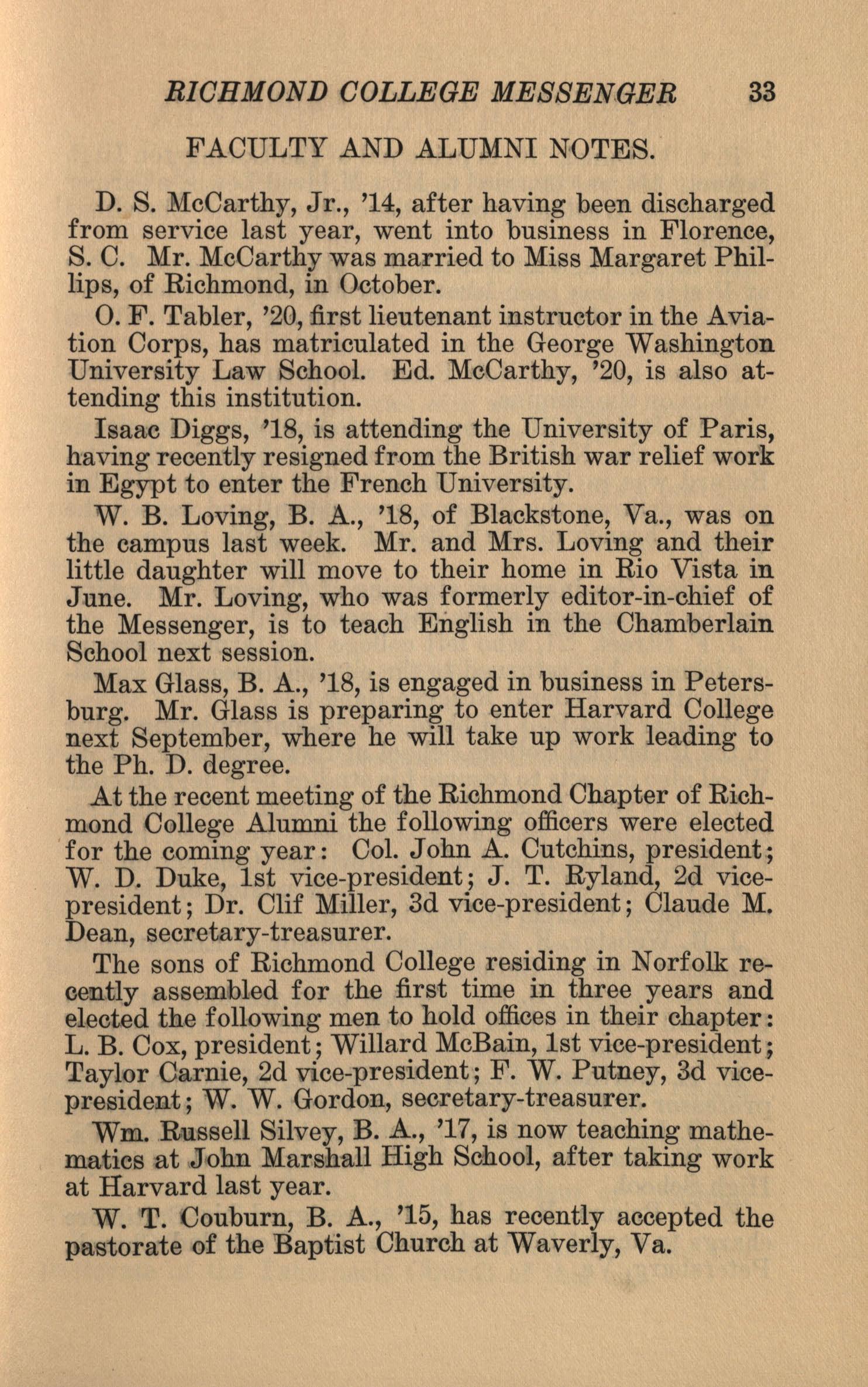
FACULTY AND ALUMNI NOTES.
D. S. McCarthy, JT., '14, after having been discharged from service last year, went into business in Florence, S. C. Mr. McCarthy was married to Miss Margaret Phillips, of Richmond, in October.
0. F. Tabler, '20, first lieutenant instructor in the Aviation Corps, has matriculated in the George Washington University Law School. Ed. McCarthy, '20, is also attending this institution.
Isaac Diggs, '18, is attending the University of Paris, having recently resigned from the British war relief work in Egypt to enter the French University.
W. B. Loving, B. A., '18, of Blackstone, Va., was on the campus last week. Mr. and Mrs. Loving and their little daughter will move to their home in Rio Vista in June. Mr. Loving, who was formerly editor-in-chief of the Messenger, is to teach English in the Chamberlain School next session.
Max Glass, B. A., '18, is engaged in business in Petersburg. Mr. Glass is preparing to enter Harvard College next September, where he will take up work leading to the Ph.D. degree.
At the recent meeting of the Richmond Chapter of Richmond College Alumni the following officers were elected for the coming year: Col. John A. Cutchins, president; W. D. Duke, 1st vice-president; J. T. Ryland, 2d vicepresident; Dr. Clif Miller, 3d vice-president; Claude M. Dean, secretary-treasurer.
The sons of Richmond College residing in Norfolk recently assembled for the first time in three years and elected the following men to hold offices in their chapter: L. B. Cox, president; Willard McBain, 1st vice-president; Taylor Carnie, 2d vice-president; F. W. Putney, 3d vicepresident; W. W. Gordon, secretary-treasurer.
Wm . .Russell Silvey, B. A., '17, is now teaching mathematics at "fohn Marshall High School, after taking work at Harvard last year.
W. T. Couburn, B. A., '15, has recently accepted the pastorate of the Baptist Church at Waverly, Va.
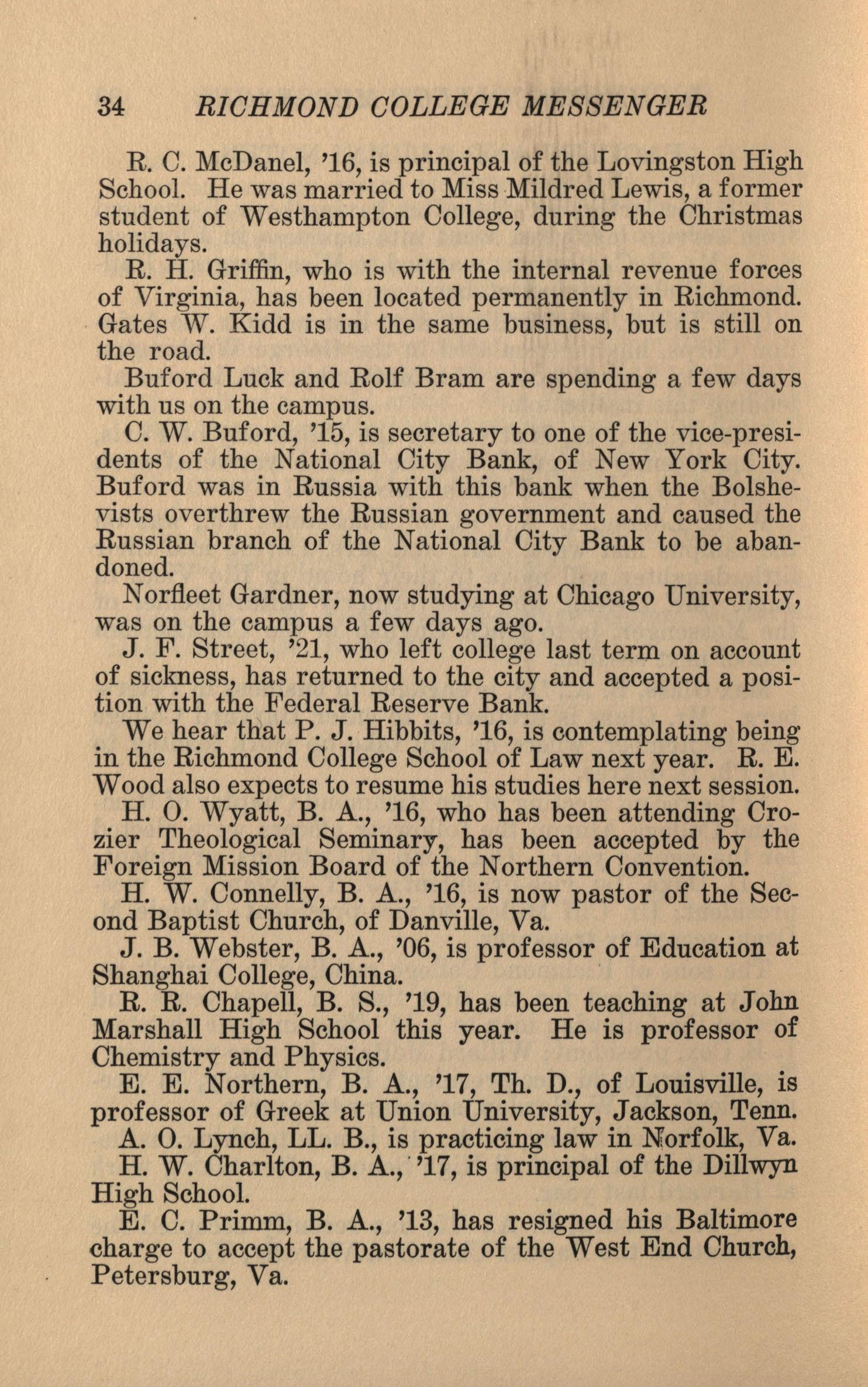
RICHMOND COLLEGE MESSENGER
R. C. McDanel, '16, is principal of the Lovingston High School. He was married to Miss Mildred Lewis, a former student of Westhampton College, during the Christmas holidays.
R. H. Griffin, who is with the internal revenue forces of Virginia, has been located permanently in Richmond. Gates W. Kidd is in the same business, but is still on the road.
Buford Luck and Rolf Bram are spending a few days with us on the campus.
C. W. Buford, '15, is secretary to one of the vice-presidents of the National City Bank, of New York City. Buford was in Russia with this bank when the Bolshevists overthrew the Russian government and caused the Russian branch of the National City Bank to be abandoned.
Norfleet Gardner, now studying at Chicago University, was on the campus a few days ago.
J. F. Street, '21, who left college last term on account of sickness, has returned to the city and accepted a position with the Federal Reserve Bank.
We hear that P. J. Hibbits, '16, is contemplating being in the Richmond College School of Law next year. R. E. Wood also expects to resume his studies here next session.
H. 0. Wyatt, B. A., '16, who has been attending Crozier Theological Seminary, has been accepted by the Foreign Mission Board of the Northern Convention.
H. W. Connelly, B. A., '16, is now pastor of the Second Baptist Church, of Danville, Va.
J. B. Webster, B. A., '06, is professor of Education at Shanghai College, China. ·
R. R. Chapell, B. S., '19, has been teaching at John Marshall High School this year. He is professor of Chemistry and Physics.
E. E. Northern, B. A., '17, Th. D., of Louisville, is professor of Greek at Union University, Jackson, Tenn.
A. 0. Lynch, LL. B., is practicing law in N(orfolk, Va.
H. W. Charlton, B. A.,· '17, is principal of the Dillwyn High School.
E. C. Primm, B. A., '13, has resigned his Baltimore charge to accept the pastorate of the West End Church, Petersburg, Va.
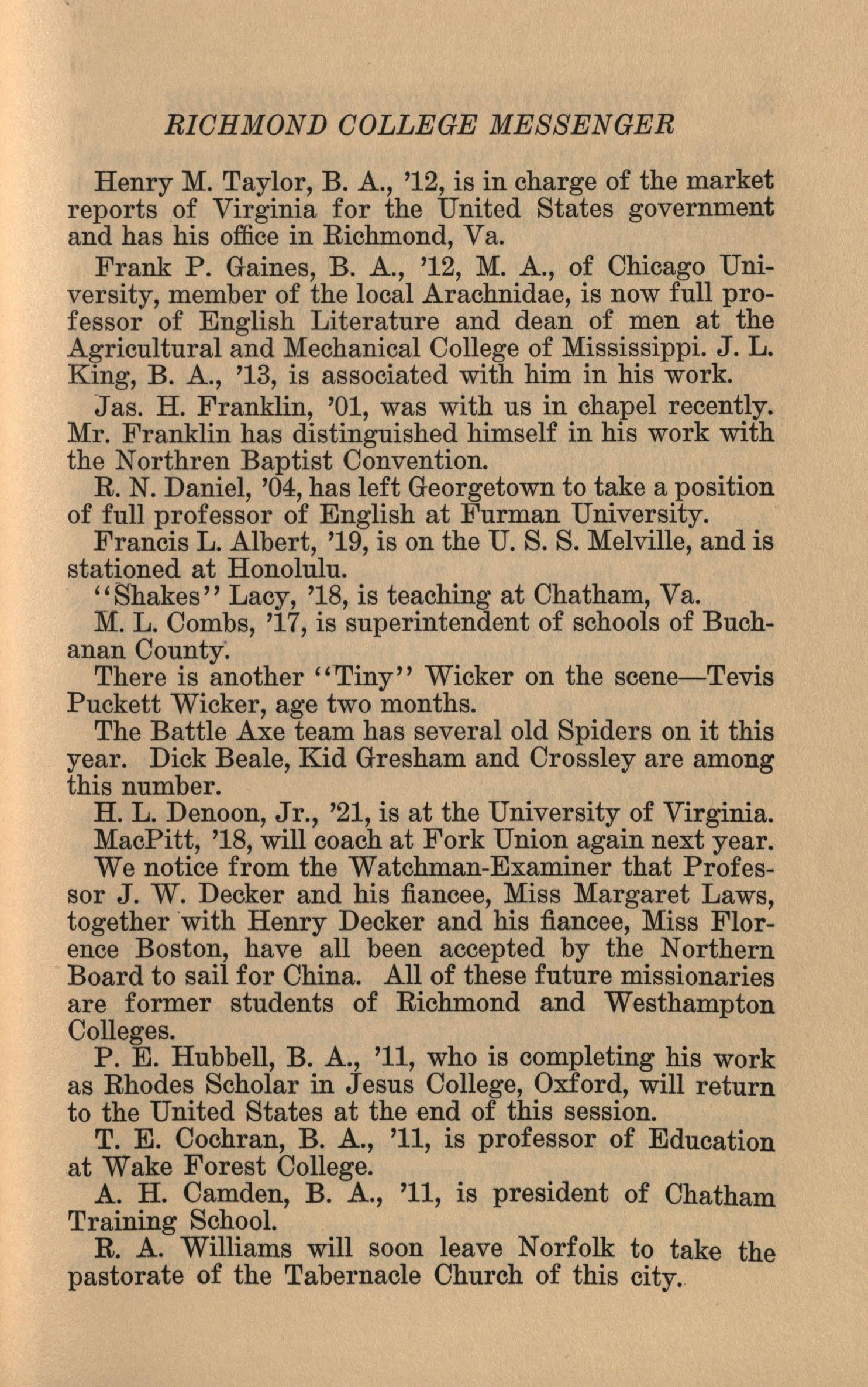
RICHMOND COLLEGE MESSENGER
Henry M. Taylor, B. A., '12, is in charge of the market reports of Virginia for the United States government and has his office in Richmond, Va.
Frank P. Gaines, B. A., '12, M. A., of Chicago University, member of the local Arachnidae, is now full professor of English Literature and dean of men at the Agricultural and Mechanical College of Mississippi. J. L. King, B. A., '13, is associated with him in his work.
J as. H. Franklin, '01, was with us in chapel recently. Mr. Franklin has distinguished himself in his work with the N orthren Baptist Convention.
R. N. Daniel, '04, has left Georgetown to take a position of full professor of English at Furman University.
Francis L. Albert, '19, is on the U. S. S. Melville, and is stationed at Honolulu.
· ''Shakes'' Lacy, '18, is teaching at Chatham, Va.
M. L. Combs, '17, is superintendent of schools of Buchanan County'.
There is another ""Tiny" Wicker on the scene-Tevis Puckett Wicker, age two months.
The Battle Axe team has several old Spiders on it this year. Dick Beale, Kid Gresham and Crossley are among this number.
H. L. Denoon, Jr., '21, is at the University of Virginia. MacPitt, '18, will coach at Fork Union again next year.
We notice from the Watchman-Examiner that Professor J. W. Decker and his :fiancee, Miss Margaret Laws, together ·with Henry Decker and his :fiancee, Miss Florence Boston, have all been accepted by the Northern Board to sail for China. All of these future missionaries are former students of Richmond and Westhampton Colleges.
P. E. Hubbell, B. A., '11, who is completing his work as Rhodes Scholar in Jesus College, Oxford, will return to the United States at the end of this session.
T. E. Cochran, B. A., '11, is professor of Education at Wake Forest College.
A. H. Camden, B. A., '11, is president of Chatham Training School.
R. A. Williams will soon leave Norfolk to take the pastorate of the Tabernacle Church of this city.
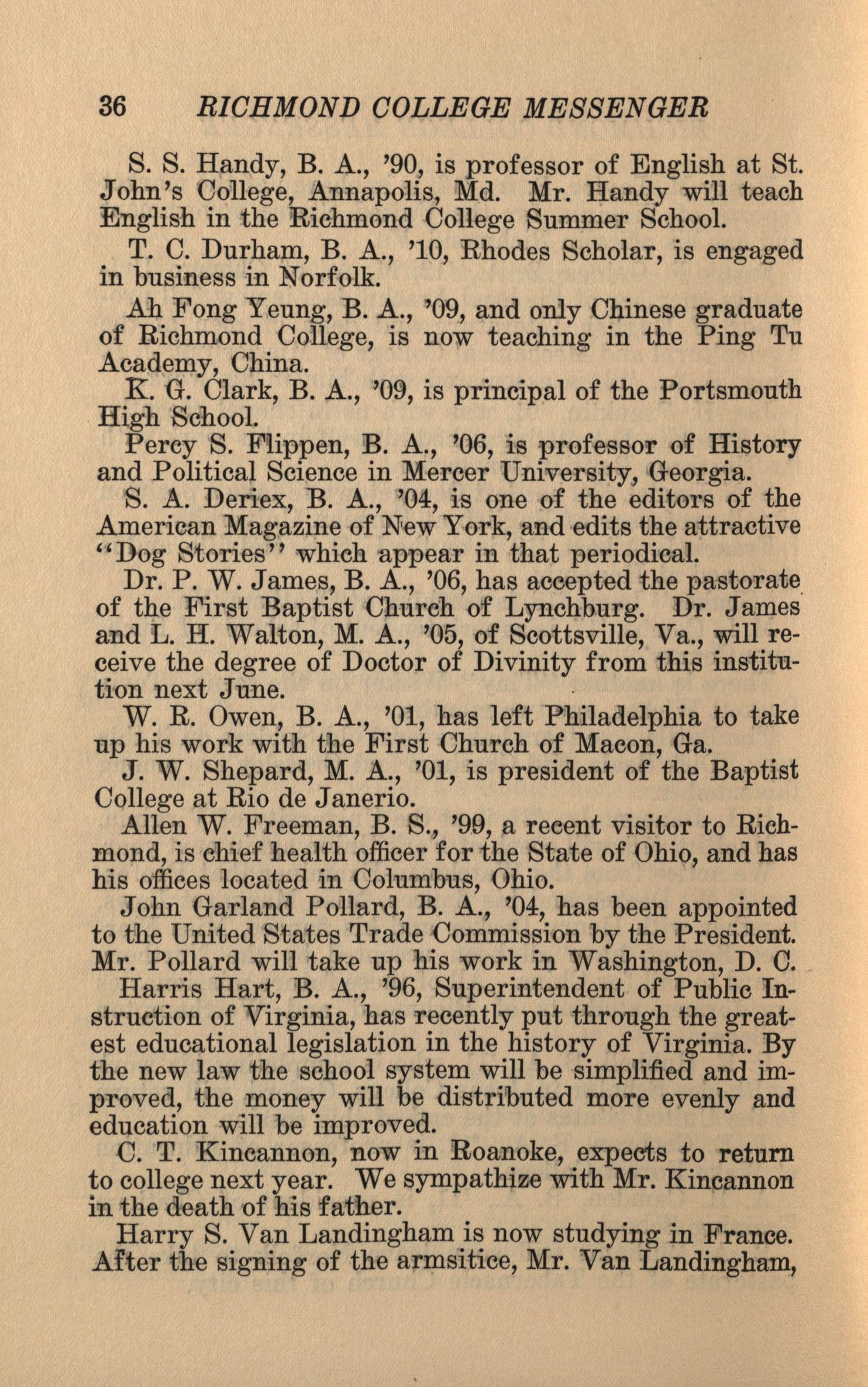
RICHMOND COLLEGE MESSENGER
S. S. H.andy, B. A., '90, is professor of English at St. 3 ohn 's 'College, Annapolis, Md. Mr. I;[a:ndy will teach English in the Richmond College Summer School.
T. C. Durham, B. A., 'lOJ Rhodes Scholar, is engaged in business in N'orfolk.
Ah Fong Y .eung, B. A., '09, and only Chinese graduate of Richmond College, is now teaching in the Ping Tu Academy, China.
K. G. Clark, B. A., '0~, is principal of the Portsmouth Higb School.
Percy 'S. F4ippen, B. A., '06, is professor of History and Political Science in Mercer UniversityJ Georgia.
S. A. Deriex, B. A., '04, is one of the editors of the American Magazine of New York, and ·edits the attractive "Dog StoTies" which appear il'l that periodical.
Dr. P. W. James, B. A., '06, has accepted the pastorate of the First Baptist C):mrch of Lynchburg. Dr. James and L. H. Walton, M. A., '05, of Scottsville, Va., will receive the degree of Doctor of Divinity from this institu.tion next June.
W. R. Owen, B. A., '01, has left Philadelphia to take up his work with the First Church of Macon, Ga.
J. W. Shepard, M. A., '01, is president of the Baptist College at Rio de J anerio.
Allen W. Freeman, B. S., '9.9, a recent visitor to Richmo;nd, is chief health officer for the State of Ohi9, and has his offices located in Columbus, Ohio.
John Garland Pollard, B. A., '04, has been appointed to the United States Trade Commission by the President. Mr. Pollard will fake up his work in Washington, D. C. Harris Hart, B. A., '96, Superintendent of Public Instruetion of Virginia, has recently put through the greatest educational legislation in the history of Virginia. By the new law the school system will be simplified and improved, the money will be distributed more evenly and education will be improved.
C. T. Kincannon, now in Roanoke, expects to return to college next year. We sympathjze with Mr. Kincannon in the ·death uf his !father.
Harry S. Van Landingham is now studying in France. After the signing of the armsitice, Mr. Van Landingham,
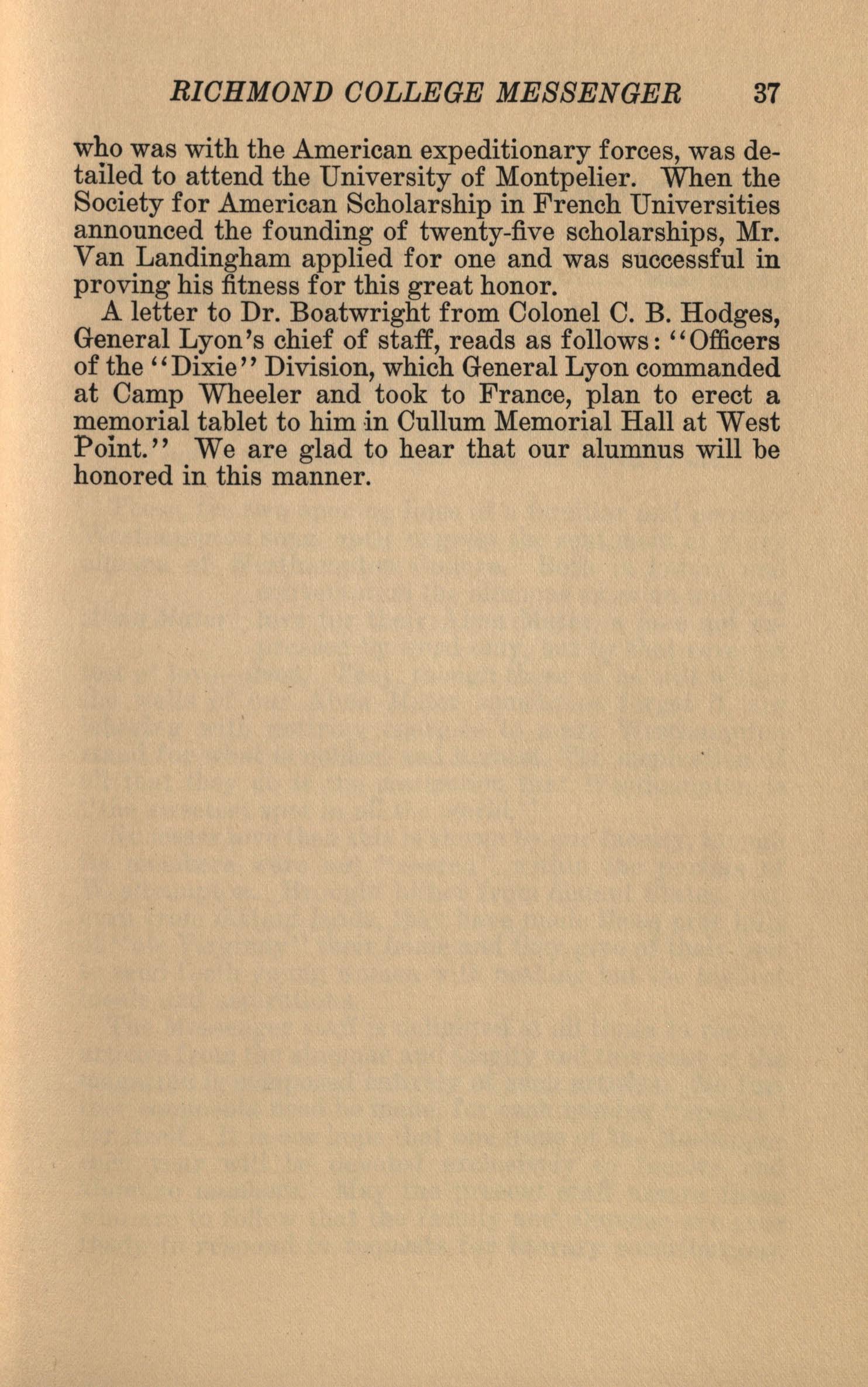
who was with the American expeditionary forces, was detailed to attend the University of Montpelier. When the Society for American Scholarship in French Universities announced the founding of twenty-five scholarships, Mr. Van Landingham applied for one and was successful in proving his fitness for this great honor.
A letter to Dr. Boatwright from Colonel C. B. Hodges, General Lyon's chief of staff, reads as follows: "Officers of the ''Dixie'' Division, which General Lyon commanded at Camp Wheeler and took to France, plan to erect a memorial tablet to him in Cullum Memorial Hall at West Point.'' We are glad to hear that our alumnus will be honored in this manner.
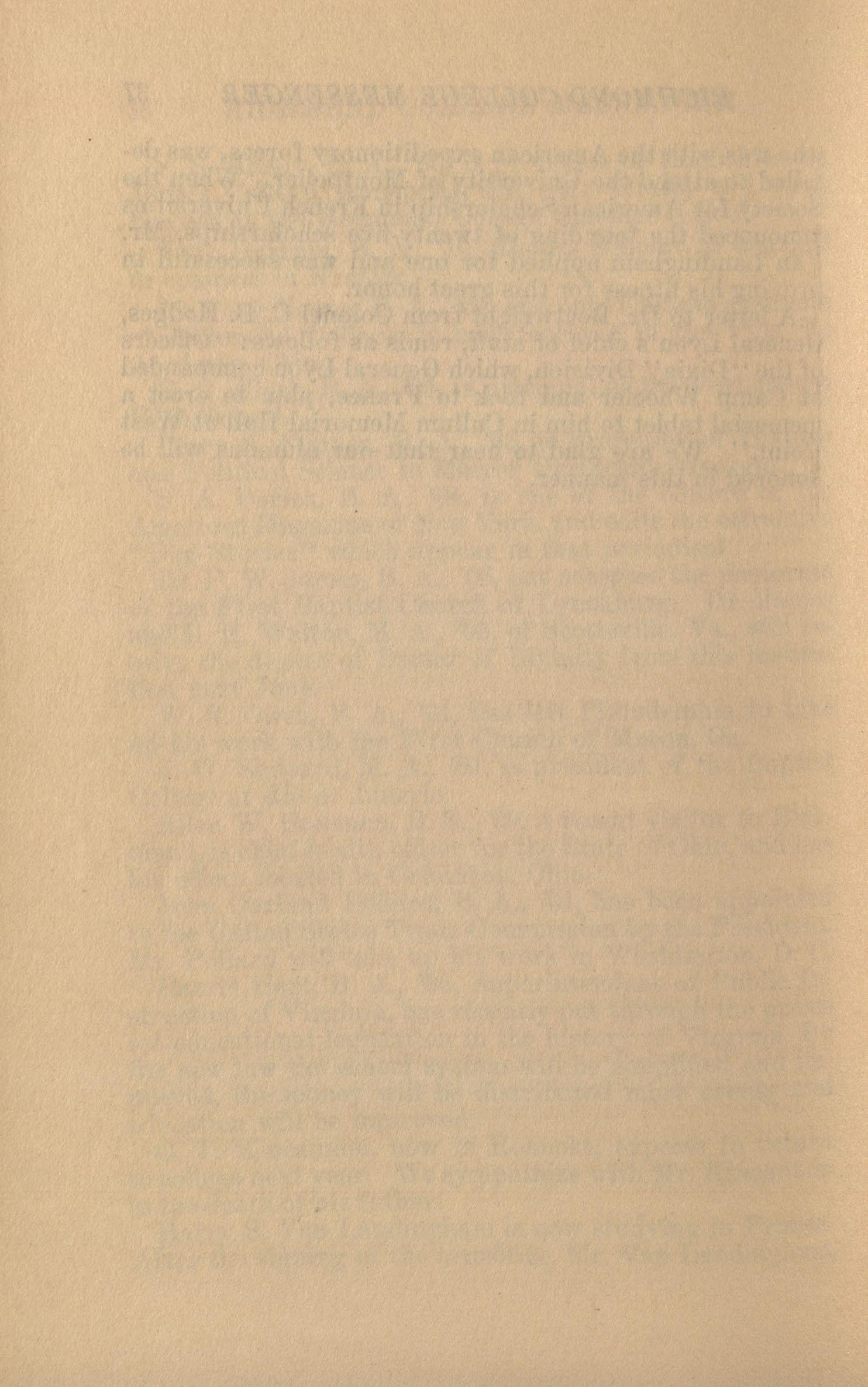
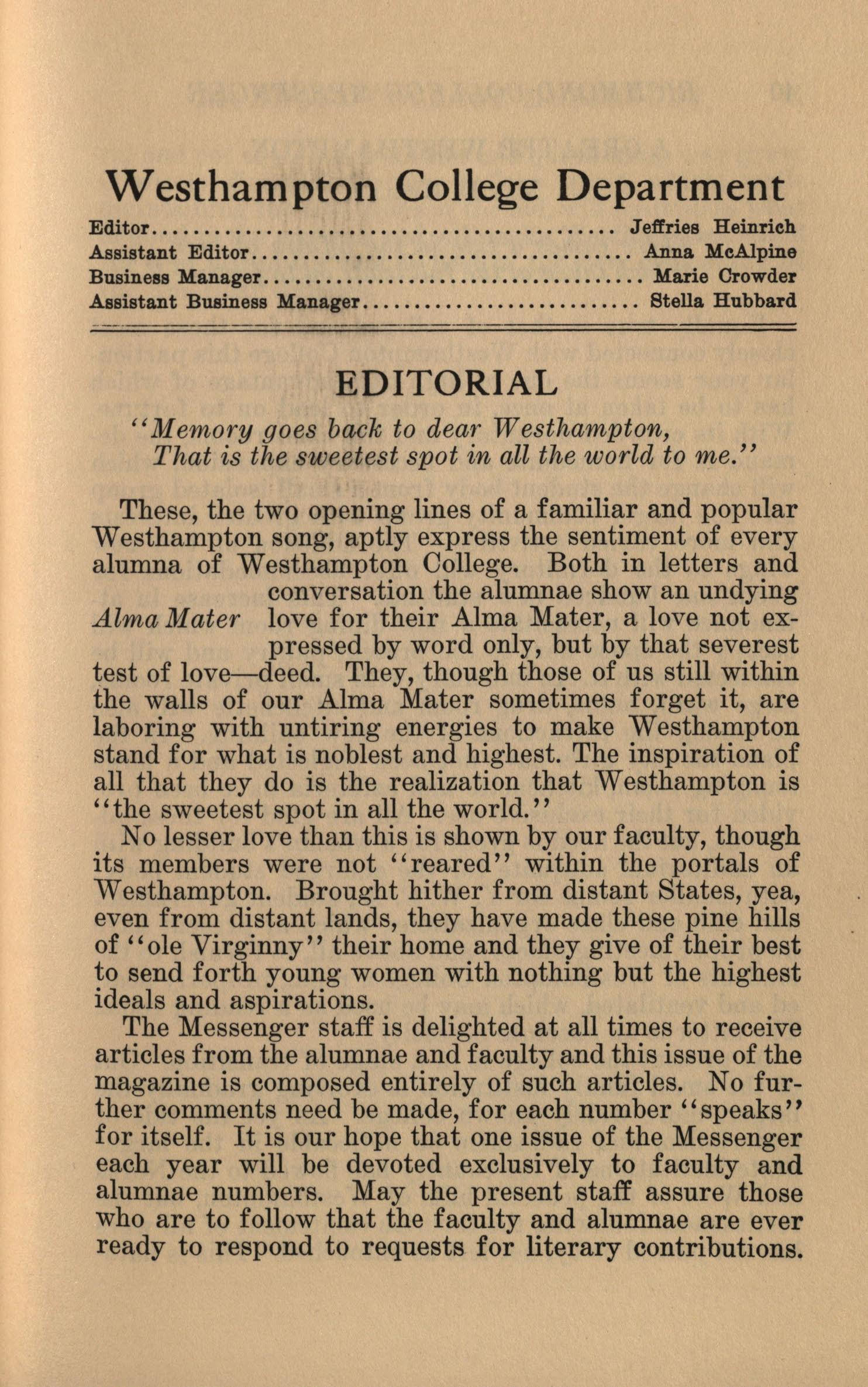
Westhampton College Department
Editor.
J e:ffries Heinrich Assistant Editor.
Marie Crowder
Anna :McAlpine Business :Manager.
Assistant Blll!liness :Manager. Stella Hubbard
EDITORIAL
"Memory goes back to dear Westhampton, That is the sweetest spot in all the world to me."
These, the two opening lines of a familiar and popular Westhampton song, aptly express the sentiment of every alumna of Westhampton College. Both in letters and conversation the alumnae show an undying Alma Mater love for their Alma Mater, a love not expressed by word only, but by that severest {est of love-deed. They, though those of us still within the walls of our Alma Mater sometimes forget it, are laboring with untiring energies to make Westhampton stand for what is noblest and highest. The inspiration of all that they do is the realization that Westhampton is '' the sweetest spot in all the world.''
No lesser love than this is shown by our faculty, though its members were not "reared" within the portals of Westhampton. Brought hither from distant States, yea, even from distant lands, they have made these pine hills of "ole Virginny" their home and they give of their best to send forth young women with nothing but the highest ideals and aspirations.
The Messenger staff is delighted at all times to receive articles from the alumnae and faculty and this issue of the magazine is composed entirely of such articles. No further comments need be made, for each number ''speaks'' for itself. It is our hope that one issue of the Messenger each year will be devoted exclusively to faculty and alumnae numbers. May the present staff assure those who are to follow that the faculty and alumnae are ever ready to respond to requests for literary contributions.
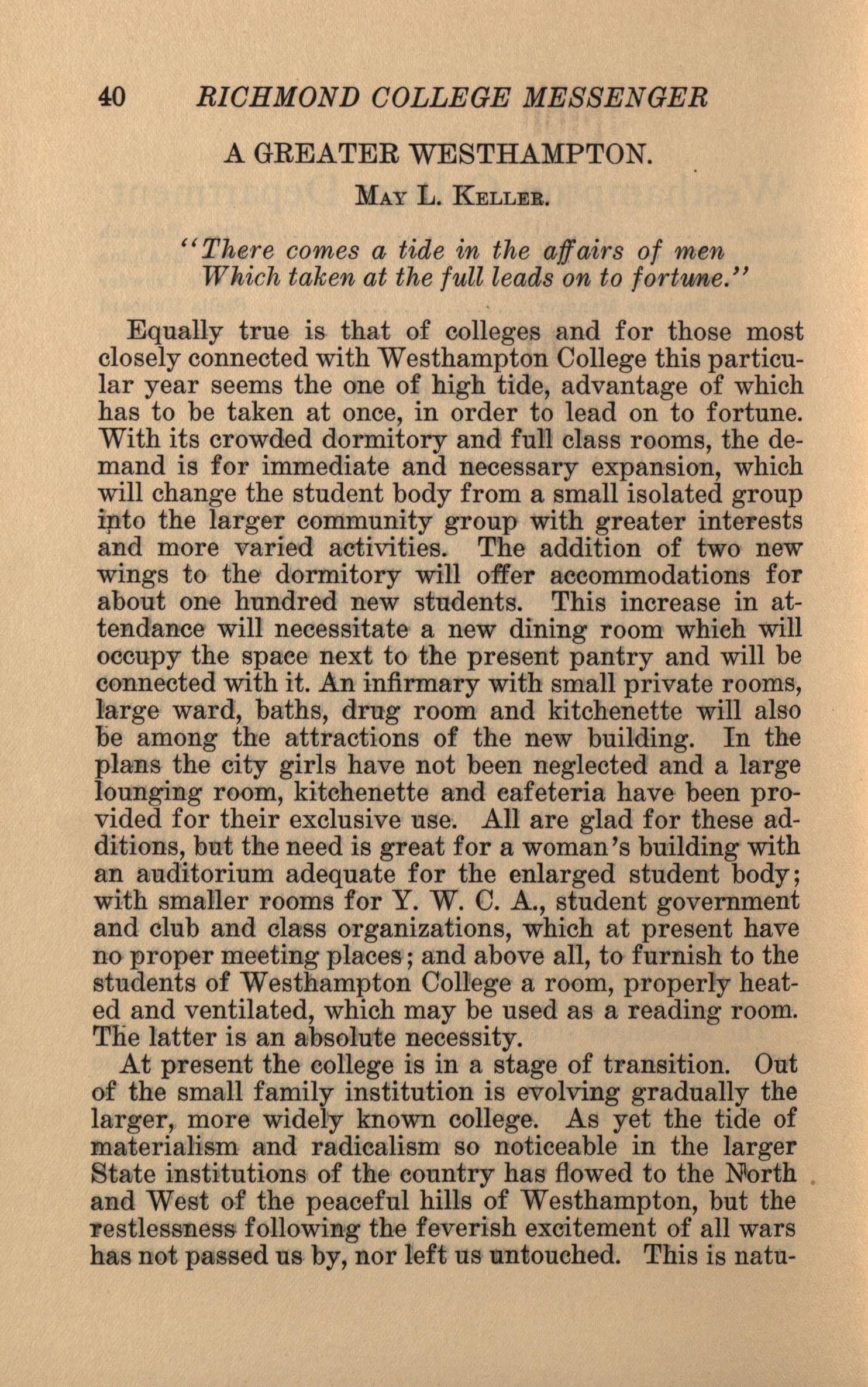
40 RICHMOND COLLEGE MESSENGER
A GREATER WESTHAMPTON.
MAY L. KELLER.
"There comes a tide in the affairs of men Which taken at the full leads on to fortune."
Equally true is - that of colleges and for those most closely connected with Westhampton College this particular year seems the one of high tide, advantage of which has to be taken at once, in order to lead on to fortune. With its crowded dormitory and full class rooms, the demand is for immediate and necessary expansion, which will change the student body from a small isolated group :i:p.tothe larger co:rnmunity group with greater inte · Fests and more varied activities. The addition of two new wings to the- dormitory will offer accommodations for about one hnndred new students. This increase in attendance will necessitate · a new dining room which will occupy the space next to , the present pantry and will be connected with it. An infirmary with small private rooms, large ward, baths, drug room and kitchenette will also be among the attractions of the new building. In the plans - the city girls have not been neglected and a large lounging room, kitchenette and eaf eteria have - been provided for their exclusive use. All are glad for these additions, but the need is great for a woman's building with an auditorium adequate for the enlarged student body; with stnaMer rooms for Y. W. C. A., student government and club and cla:ss organizations, which at present have no proper meeting pla:ces; and above all, to furnish to the students of Westhampton College a room, properly heated and ventilated, which may be used as a reading room. Tlie latter is an absolute necessity.
At present the college is in a stage of transition. Out of the small family institution is evolving gradually the larger, more widely known college. As yet the tide of materialism aind radicalism so noticeable in the larger State institutions of tliie country has flowed to the North . aE.d West of the peaceful hills of Westhampton, but the 1!'estless:nessfollowing the feverish excitement of all wars has not passed us by, nor left us untouched. This is natu-
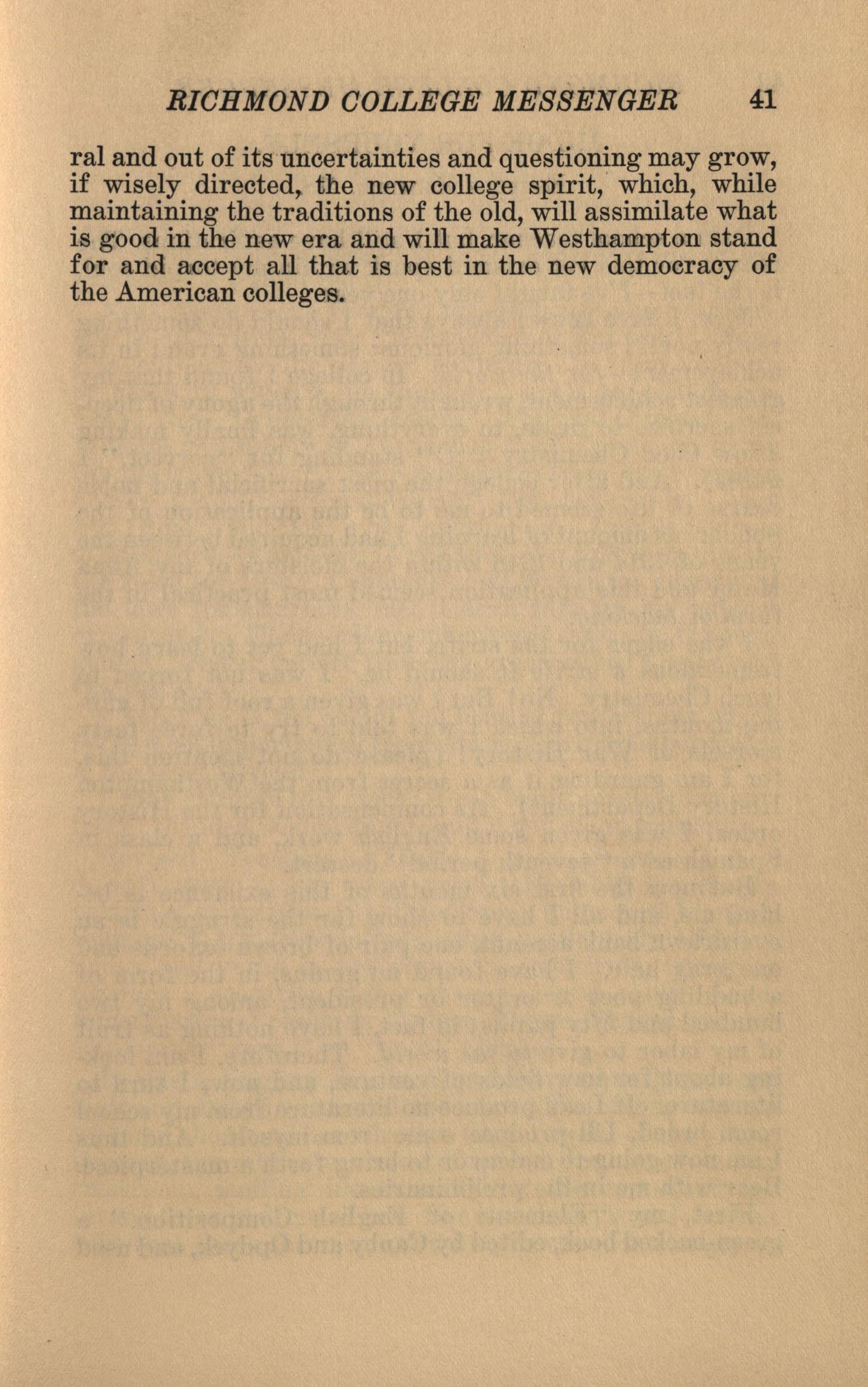
ral and out of its uncertainties and questioning may grow, if wisely directed • the new college spirit, · which, while maintaining the traditions of the old, will assimilate what is good in the new era and will make Westhampton stand for and accept all that is best in the new democracy of the American colleges.
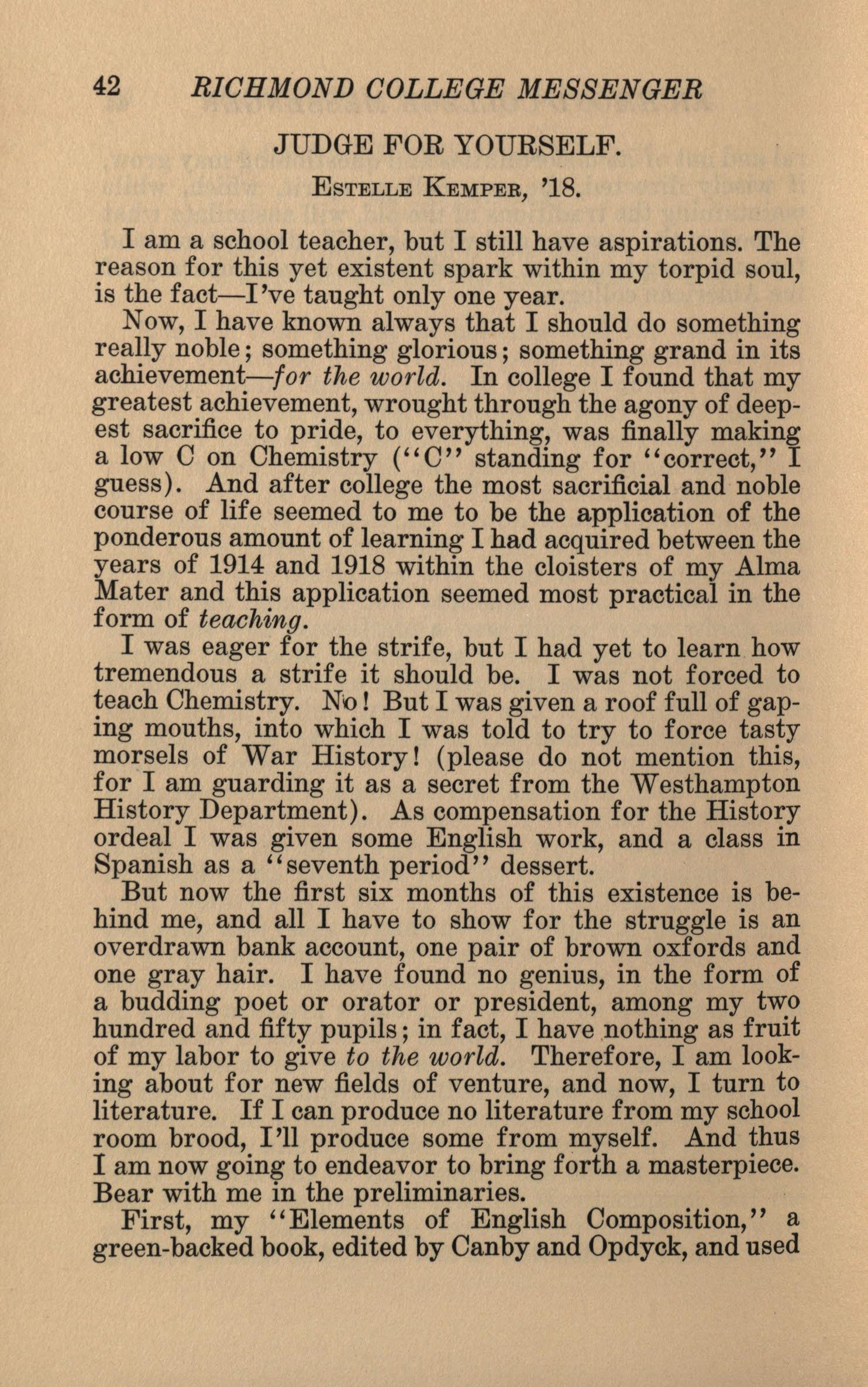
42 RICHMOND COLLEGE MESSENGER
JUDGE FOR YOURSELF.
ESTELLE KEMPER, '18.
I am a school teacher, but I still have aspirations. The reason for this yet existent spark within my torpid soul, is the fact-I've taught only one year.
Now, I have known always that I should do something really noble; something glorious; something grand in its achievement-/ or the world. In college I found that my greatest achievement, wrought through the agony of deepest sacrifice to pride, to everything, was :finally making a low O on Chemistry ("0" standing for "correct," I guess). And after college the most sacrificial and noble course of life seemed to me to be the application of the ponderous amount of learning I had acquired between the years of 1914 and 1918 within the cloisters of my Alma Mater and this application seemed most practical in the form of teaching.
I was eager for the strife, but I had yet to learn how tremendous a strife it should be. I was not forced to teach Chemistry. No! But I was given a roof full of gaping mouths, into which I was told to try to force tasty morsels of War History! (please do not mention this, for I am guarding it as a secret from the Westhampton History Department). As compensation for the History ordeal I was given some English work, and a class in Spanish as a '' seventh period'' dessert.
But now the :first six months of this existence is behind me, and all I have to show for the struggle is an overdrawn bank account, one pair of brown oxfords and one gray hair. I have found no genius, in the form of a budding poet or orator or president, among my two hundred and :fifty pupils ; in fact, I have .nothing as fruit of my labor to give to the world. Therefore, I am looking about for new :fields of venture, and now, I turn to literature. If I can produce no literature from my school room brood, I '11produce some from myself. And thus I am now going to endeavor to bring forth a masterpiece. Bear with me in the preliminaries.
First, my '' Elements of English Composition,'' a green-backed book, edited by Canby and Opdyck, and used
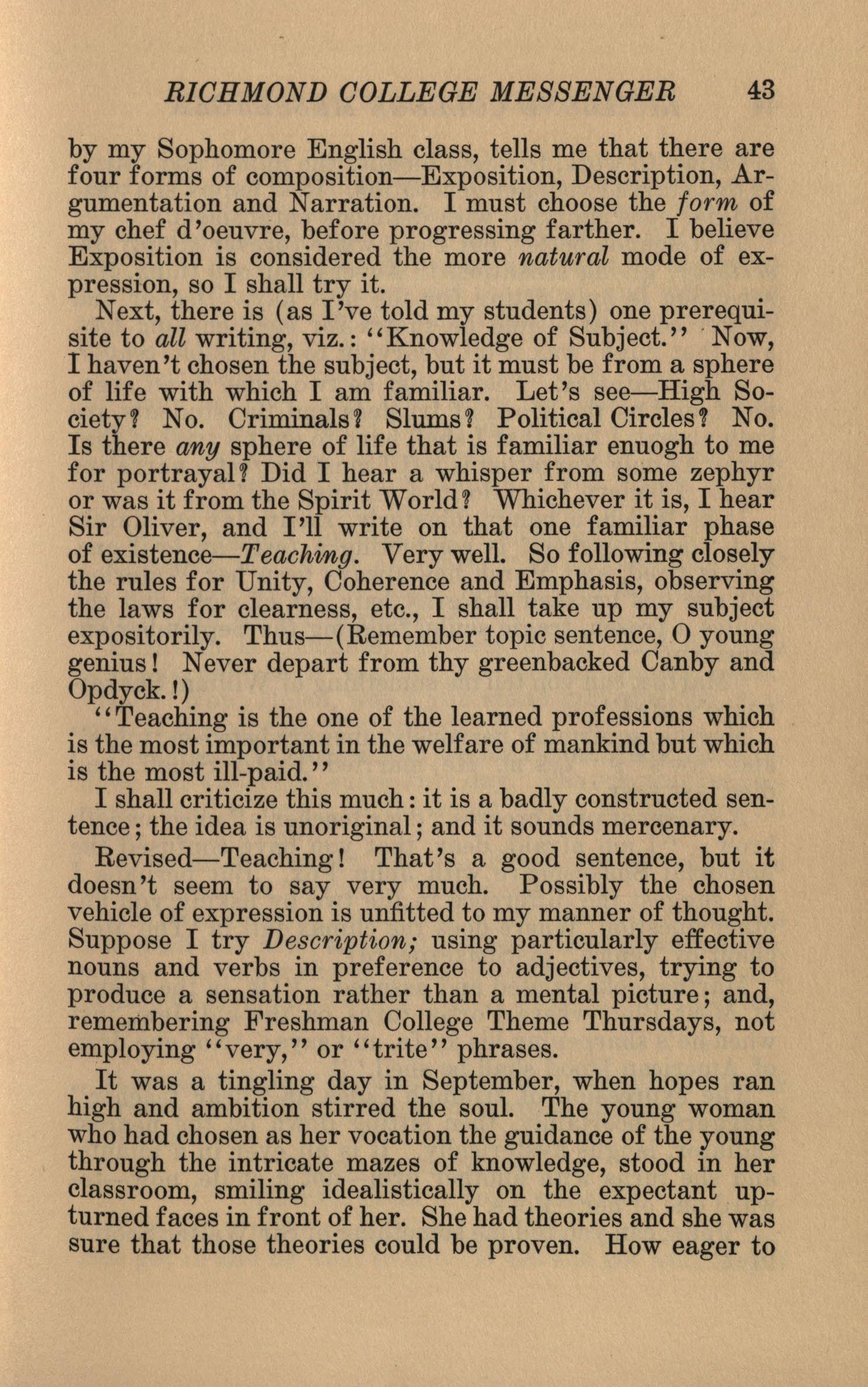
by my Sophomore English class, tells me that there are four forms of composition-Exposition, Description, Argumentation and Narration. I must choose the form of my chef d'oeuvre, before progressing farther. I believe Exposition is considered the more natural mode of expression, so I shall try it.
Next, there is ( as I've told my students) one prerequisite to all writing, viz.: "Knowledge of Subject." ·Now, I haven't chosen the subject, but it must be from a sphere of life with which I am familiar. Let's see-High Society? No. Criminals¥ Slums? Political Circles? No. Is there any sphere of life that is familiar enuogh to me for portrayal¥ Did I hear a whisper from some zephyr or was it from the Spirit World? Whichever it is, I hear Sir Oliver, and I'll write on that one familiar phase of existence-Teaching. Very well. So following closely the rules for Unity, Coherence and Emphasis, observing the laws for clearness, etc., I shall take up my subject expositorily. Thus-(Remember topic sentence, 0 young genius ! Never depart from thy green backed Canby and Opdyck. !)
'' Teaching is the one of the learned professions which is the most important in the welfare of mankind but which is the most ill-paid."
I shall criticize this much: it is a badly constructed sentence; the idea is unoriginal; and it sounds mercenary.
Revised-Teaching! That's a good sentence, but it doesn't seem to say very much. Possibly the chosen vehicle of expression is unfitted to my manner of thought. Suppose I try Description; using particularly effective nouns and verbs in preference to adjectives, trying to produce a sensation rather than a mental picture; and, remembering Freshman College Theme Thursdays, not employing "very," or "trite" phrases.
It was a tingling day in September, when hopes ran high and ambition stirred the soul. The young woman who had chosen as her vocation the guidance of the young through the intricate mazes of knowledge, stood in her classroom, smiling idealistically on the expectant upturned faces in front of her. She had theories and she was sure that those theories could be proven. How eager to
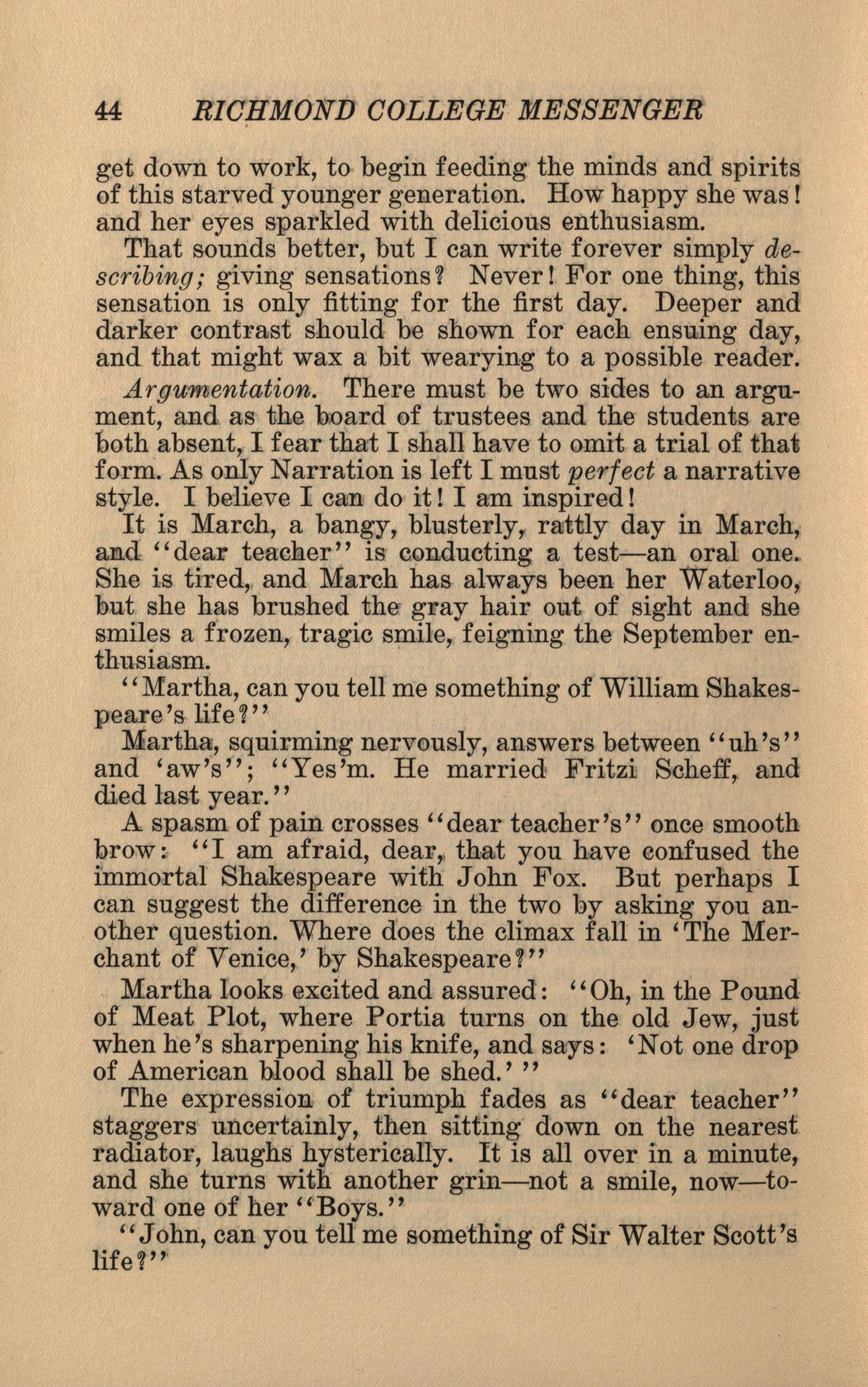
44 RICHMONiJ COLLEGE MESSENGER
get down to work, to begin feeding the minds and spirits of this starved younger ge:neration. How happy she was ! and her eyes sparkled with delicious enthusiasm. That sounds better, but I can write forever simply describing; giving sensations 1 Never!. For one thing, this sensation is only fitting for the first day. Deeper and darker contrast should be shown for each ensuing day, and that might wax a bit wearying to a possible reade-r.
Argumentation. There must be two sides to an argu.~ ment, and as the ·board of trustees and the- students are both absent, I fear that I shall have to omit a trial of that form. As only Narration is left I must perfect a narrative style. I beiieve I cam do it! I am inspired!
It is March, a bangy, blusterly, raittly day in March, and '' dear teacher'' is C.Qnducting a test-an oral one .. She is tired, , and March has always be·en her Waterloo, hut she has brushed the · guay hair out of sight and she smiles a frozen, tragic smile, feigning the September enthusiasm.
' 'Martha, can you tell me something of William Shakespeare's - life 1''
Miarthai, squirming ne1:v<1msly,answers between "uh's" and 'aw 's ,·,; "Yes 'm. He married Fritzii Scheff, and died last year.''
A spasm of pain crosses '' dear teacher's'' once smooth brow: "I am afraid, deau i1that you have eonfused the immortal Shakespeare with John Fox. But perhaps I can suggest the difference in the two by asking you another question. Where does the climax fall in 'The Merchant of Venice,' oyShakespeare 1''
Martha looks excited and assured: '' Oh, in the Pound of Meat Plot, where Portia turns on the old Jew, . just when he's sharpening his knife, and sa'Ys: 'Not one drop of American blood shall be shed. ' ''
The expression of · triumph fades as "de.ar teacher" staggers uncertainly, then sitting down on the nearest radiator, laughs hysterically. It is all over in a minute, and she turns with another grin-not a smile, now-toward one of her ''Boys.''
''John, can you tell me something of Sir Walter Scott's . life 1"
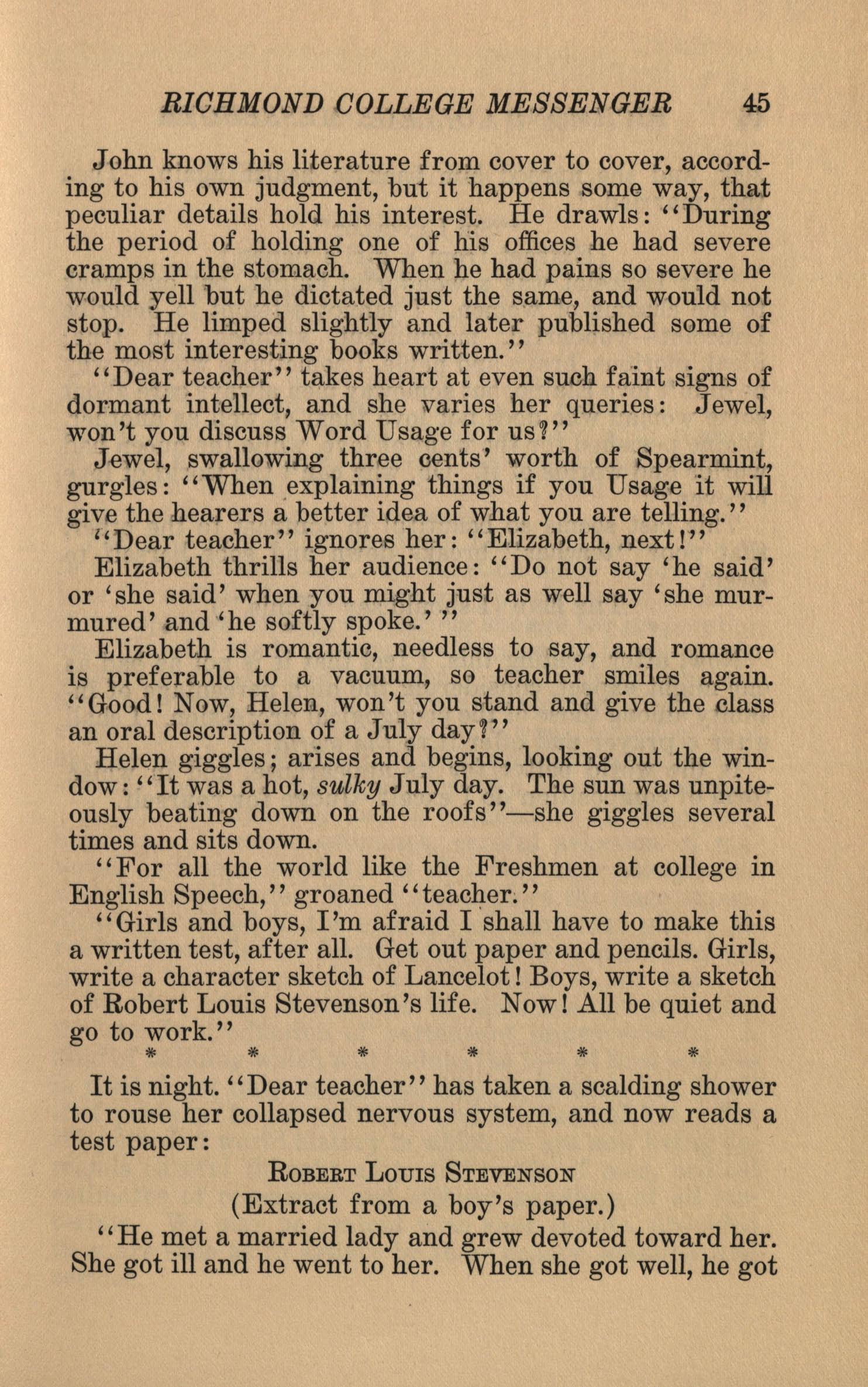
John knows his literature from cover to cover, according to his own judgment, but it happens some way, that peculiar details hold his interest. He drawls: ''During the period of holding one of his offices he had severe cramps in the stomach. When he had pains so severe he would yell ·but he dictated just the s.ame, and would not stop. He limped slightly and later published some of the most interesting books written.''
'' Dear teacher'' t1;1,kesheart at even such fiint signs of dormant intellect, and she varies her queries: Jewel, won't you discuss Word Usage for us 1''
J.ewel, swallowing three cents · ' worth of Spearmint, gurgles: "When explaining things if you Usage it will give the hearers a better idea of what you are telling.''
1 ' Dear teacher'' ignores her : '' Elizabeth, next!''
Elizabeth thrills her audience : '' Do not say 'he said' or 'she said' when you nµght just as well say 'she murmured' and · ' he softly spoke.' ''
Elizabeth is romantic, needless to say, and romance is preferable to a vacuum, so teacher smiles lj,gain. ''Good! Now, HeleR, won't you stand and give the class an oral descripti0n of a July dayr''
Helen giggles ; arises and begins, looking out the window: "It was a hot, sulky July day. The sun was unpiteously beating down on the roofs''-she giggles several times and sits down.
'' For all the world like the Freshmen at college in English Speech,'' groaned ''teacher;''
"Girls and boys, I'm afraid I shall have to make this a written test, after all. Get out paper and pencils. Girls, write a character sketch of Lancelot! Boys, write a sketch of Robert Louis Stevenson's life. Now! All be quiet and go to work.''
* * * * * *
It is night. "Dear teacher" has taken a scalding shower to rouse her collapsed nervous system, and now reads a test paper:
RoBERT Lours STEVENSON (Extract from a boy's paper.)
''He met a married lady and grew devoted toward her. She got ill and he went to her. When she got well, he got
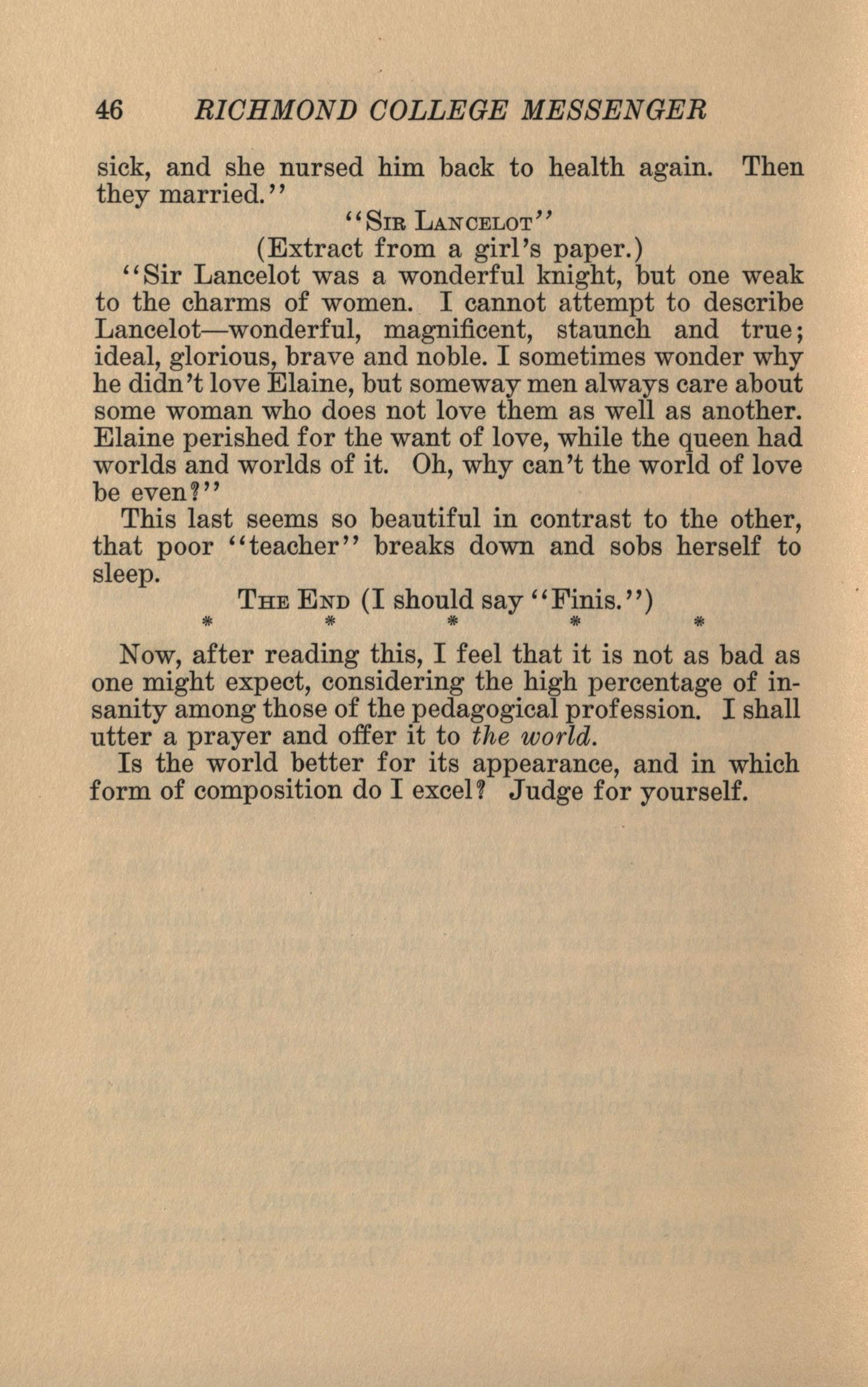
46 RICHMOND COLLEGE MESSENGER
sick, and she nursed him back to health again. Then they married. ''
"Sm LANCELOT"
(Extract from a girl's paper.)
'' Sir Lancelot was a wonderful knight, but one weak to the charms of women. I cannot attempt to describe Lancelot-wonderful, magnificent, staunch and true; ideal, glorious, brave and noble. I sometimes wonder why he didn't love Elaine, but someway men always care about some woman who does not love them as well as another. Elaine perished for the want of love, while the queen had worlds and worlds of it. Oh, why can't the world of love be evenf''
This last seems so beautiful in contrast to the other, that poor "teacher" breaks down and sobs herself to sleep.
THE END (I should say "Finis.") * * * * *
Now, after reading this, I feel that it is not as bad as one might expect, considering the high percentage of insanity among those of the pedagogical profession. I shall utter a prayer and offer it to the world.
Is the world better for its appearance, and in which form of composition do I exceU Judge for yourself.
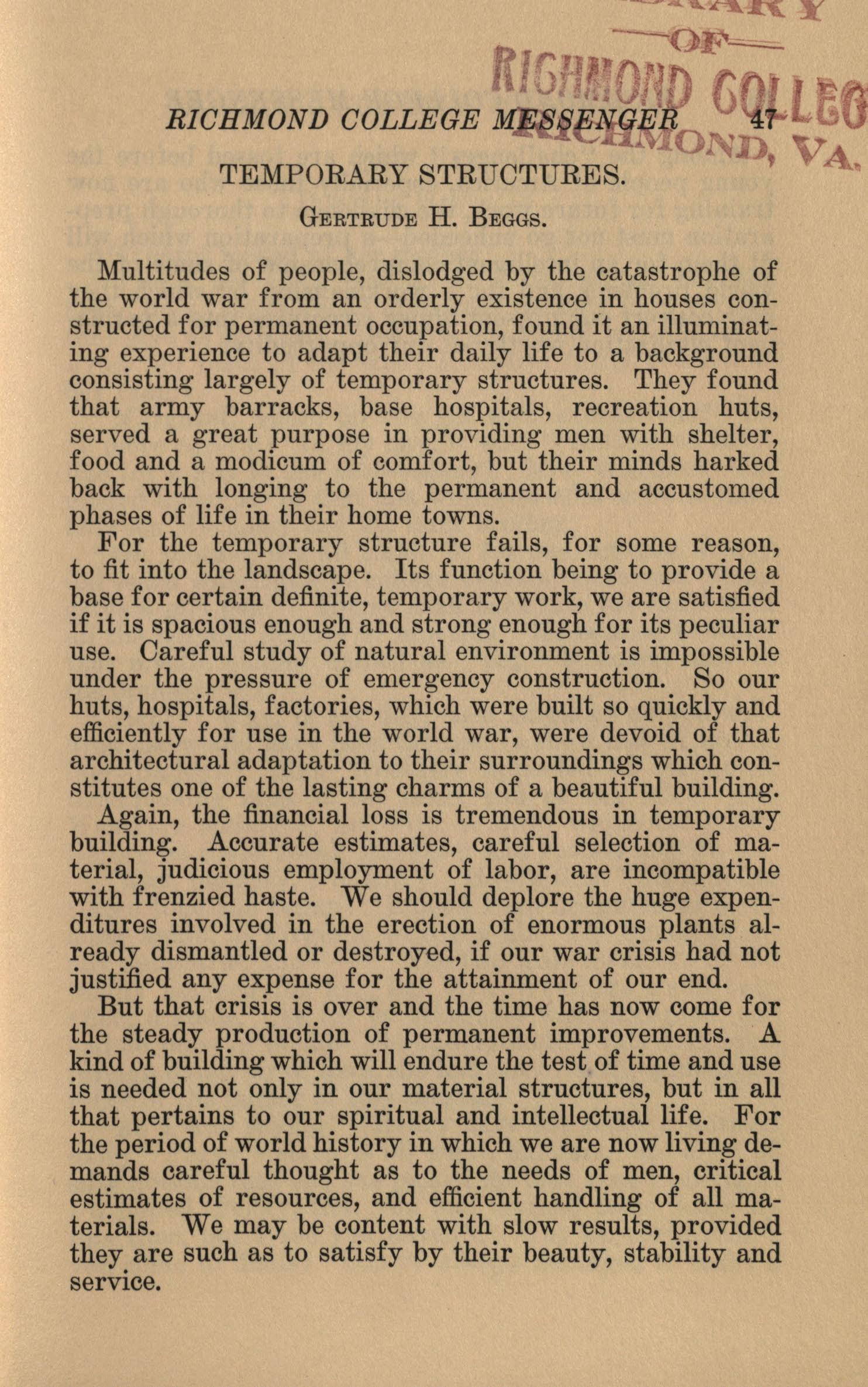
RICHMOND COLLEGE Ml
TEMPORARY STRUCTURES.
GERTRUDE H. BEGGS.
Multitudes of people, dislodged by the catastrophe of the world war from an orderly existence in houses constructed for permanent occupation, found it an illuminating experience to adapt their daily life to a background consisting largely of temporary structures. They found that army barracks, base hospitals, recreation huts, served a great purpose in providing men with shelter, food and a modicum of comfort, but their minds harked back with longing to the permanent and accustomed phases of life in their home towns.
For the temporary structure fails, for some reason, to fit into the landscape. Its function being to provide a base for certain definite, temporary work, we are satisfied if it is spacious enough and strong enough for its peculiar use. Careful study of natural environment is impossible under the pressure of emergency construction. So our huts, hospitals, factories, which were built so quickly and efficiently for use in the world war, were devoid of that architectural adaptation to their surroundings which constitutes one of the lasting charms of a beautiful building.
Again, the financial loss is tremendous in temporary building. Accurate estimates, careful selection of material, judicious employment of labor, are incompatible with frenzied haste. We should deplore the huge expenditures involved in the erection of enormous plants already dismantled or destroyed, if our war crisis had not justified any expense for the attainment of our end.
But that crisis is over and the time has now come for the steady production of permanent improvements. A kind of building which will endure the test of time and use is needed not only in our material structures, but in all that pertains to our spiritual and intellectual life. For the period of world history in which we are now living demands careful thought as to the needs of men, critical estimates of resources, and efficient handling of all materials. We may be content with slow results, provided they are such as to satisfy by their beauty, stability and service.
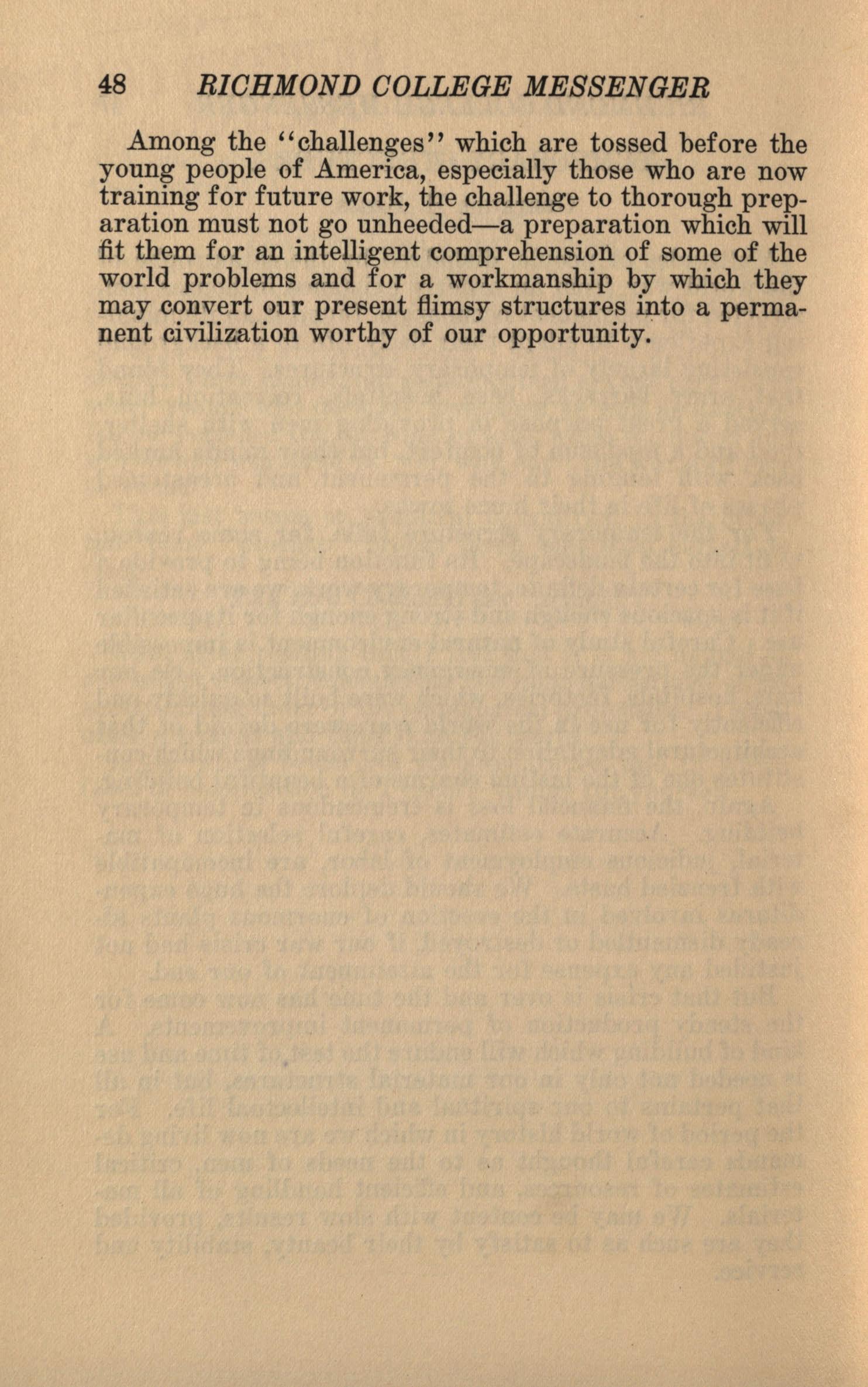
48 RICHMOND COLLEGE MESSENGER
Among the "challenges" which are tossed before the young people of America, especially those who are now training for future work, the challenge to thorough preparation must not go unheeded-a preparation which will :fit them for an intelligent comprehension of some of the world problems and for a workmanship by which they may convert our present flimsy structures into a permanent civilization worthy of our opportunity.
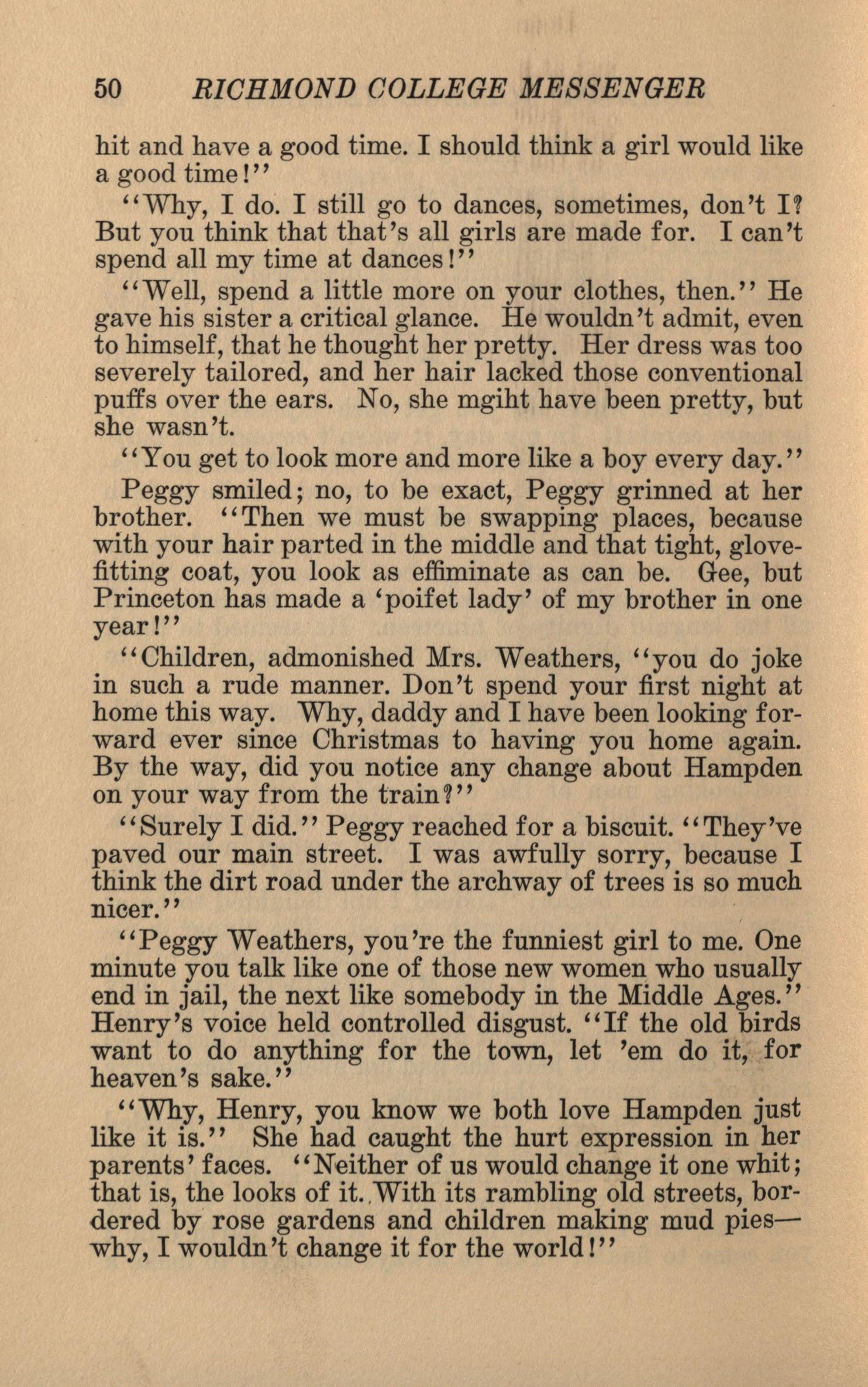
hit and have a good time. I should think a girl would like a good time !''
"Why, I do. I still go to dances, sometimes, don't n But you think that that's all girls are made for. I can't spend all my time at dances !''
''Well, spend a little more on your clothes, then.'' He gave his sister a critical glance. He wouldn't admit, even to himself, that he thought her pretty. Her dress was too severely tailored, and her hair lacked those conventional puffs over the ears. No, she mgiht have been pretty, but she wasn't.
"You get to look more and more like a boy every day."
Peggy smiled; no, to be exact, Peggy grinned at her brother. '' Then we must be swapping places, because with your hair parted in the middle and that tight, glovefitting coat, you look as effiminate as can be. Gee, but Princeton has made a 'poifet lady' of my brother in one year!''
"Children, admonished Mrs. Weathers, "you do joke in such a rude manner. Don't spend your first night at home this way. Why, daddy and I have been looking forward ever since Christmas to having you home again. By the way, did you notice any change about Hampden on your way from the train 1''
"Surely I did." Peggy reached for a biscuit. "They've paved our main street. I was awfully sorry, because I think the dirt road under the archway of trees is so much nicer.'' ,
"Peggy Weathers, you're the funniest girl to me. One minute you talk like one of those new women, who usually end in jail, the next like somebody in the Middle Ages." Henry's voice held controlled disgust. "If the old birds want to do anything for the town, let 'em do it, for heaven's sake.''
"Why, Henry, you know we both love Hampden just like it is.'' She had caught the hurt expression in her parents' faces. '' Neither of us would change it one whit; that is, the looks of it. ,With its rambling old streets, bordered by rose gardens and children making mud pieswhy, I wouldn't change it for the world!''
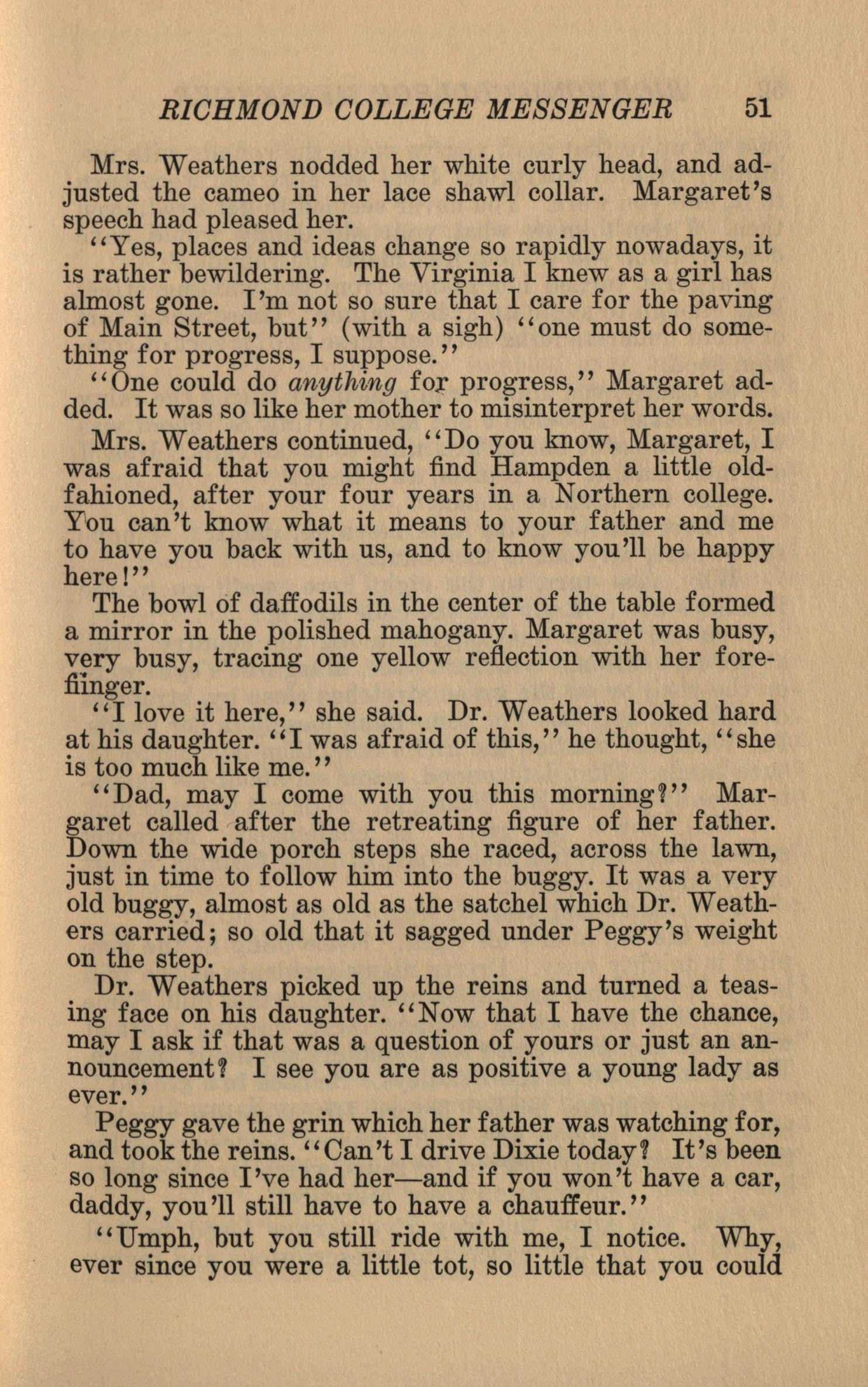
Mrs. Weathers nodded her white curly head, and adjusted the cameo in her lace shawl collar. Margaret's speech had pleased her.
"Yes, places and ideas change so rapidly nowadays, it is rather bewildering. The Virginia I knew as a girl has almost gone. I'm not so sure that I care for the paving of Main Street, but" (with a sigh) "one must do something for progress, I suppose.''
"One could do anything fot progress," Margaret added. It was so like her mother to misinterpret her words.
Mrs. Weathers continued, '' Do you know, Margaret, I was afraid that you might find Hampden a little old£ahioned, after your four years in a Northern college. Y'ou can't know what it means to your father and me to have you back with us, and to know you '11be happy here!''
The bowl of daffodils in the center of the table formed a mirror in the polished mahogany. Margaret was busy, very busy, tracing one yellow reflection with her fore:fiinger.
"I love it here," she said. Dr. Weathers looked hard at his daughter. '' I was afraid of this,'' he thought, '' she is too much like me. ''
"Dad, may I come with you this morning?" Margaret called after the retreating figure of her father. Down the wide porch steps she raced, across the lawn, just in time to follow him into the buggy. It was a very old buggy, almost as old as the satchel which Dr. W eathers carried; so old that it sagged under Peggy's weight on the step.
Dr. Weathers picked up the reins and turned a teasing face on his daughter. "Now that I have the chance, may I ask if that was a question of yours or just an announcement? I see you are as positive a young lady as ever.''
Peggy gave the grin which her father was watching for, and took the reins. "Can't I drive Dixie today? It's been so long since I've had her-and if you won't have a car, daddy, you '11 still have to have a chauffeur."
"Umph, but you still ride with me, I notice. Why, ever since you were a little tot, so little that you could
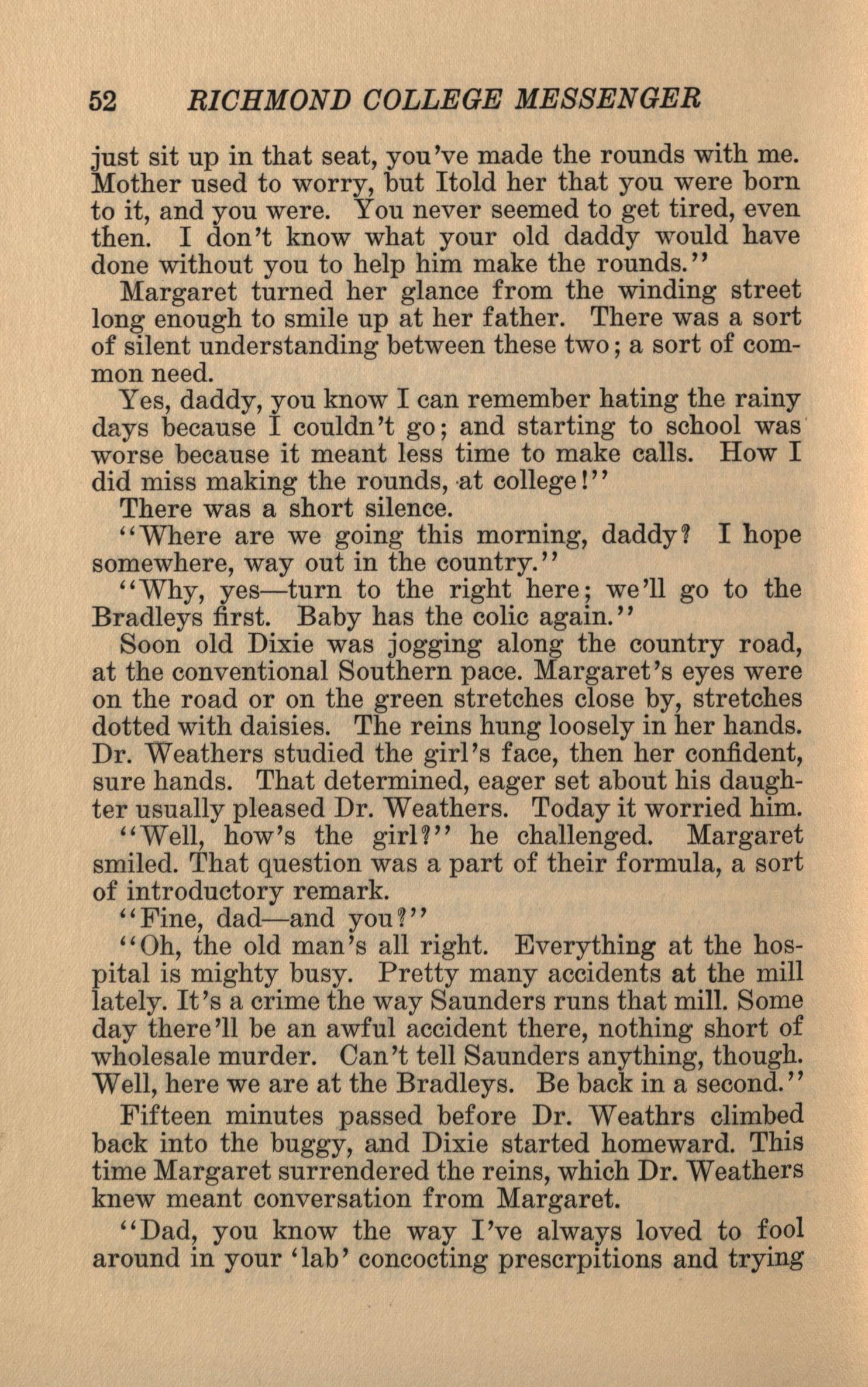
52 RICHMOND COLLEGE MESSENGER
just sit up in that seat, you've made the rounds with me. Mother used to worry, but Itold her that you were born to it, and you were. You never seemed to get tired, even then. I don't know what your old daddy would have done without you to help him make the rounds.''
Margaret turned her glance from the winding street long enough to smile up at her father. There was a sort of silent understanding between these two ; a sort of common need.
Yes, daddy, you know I can remember hating the rainy days because I couldn't go ; and starting to school was · worse because it meant less time to make calls. How I did miss making the rounds, -at college!''
There was a short silence.
"Where are we going this morning, daddy? I hope somewhere, way out in the country.''
'' Why, yes-turn to the right here ; we '11go to the Bradleys first. Baby has the colic again.''
Soon old Dixie was jogging along the country road, at the conventional Southern pace. Margaret's eyes were on the road or on the green stretches close by, stretches dotted with daisies. The reins hung loosely in her hands. Dr. Weathers studied the girl's face, then her confident, sure hands. That determined, eager set about his daughter usually pleased Dr. Weathers. Today it worried him.
'' Well, how's the girl?'' he challenged. Margaret smiled. That question was a part of their formula, a sort of introductory remark.
'' Fine, dad-and you 1''
"Oh, the old man's all right. Everything at the hospital is mighty busy. Pretty many accidents at the mill lately. It's a crime the way Saunders runs that mill. Some day there '11be an awful accident there, nothing short of wholesale murder. Can't tell Saunders anything, though. Well, here we are at the Bradleys. Be back in a second.''
Fifteen minutes passed before Dr. W eathrs climbed back into the buggy, and Dixie started homeward. This time Margaret surrendered the reins, which Dr. Weathers knew meant conversation from Margaret.
'' Dad, you know the way I've always loved to fool around in your 'lab' concocting prescrpitions and trying
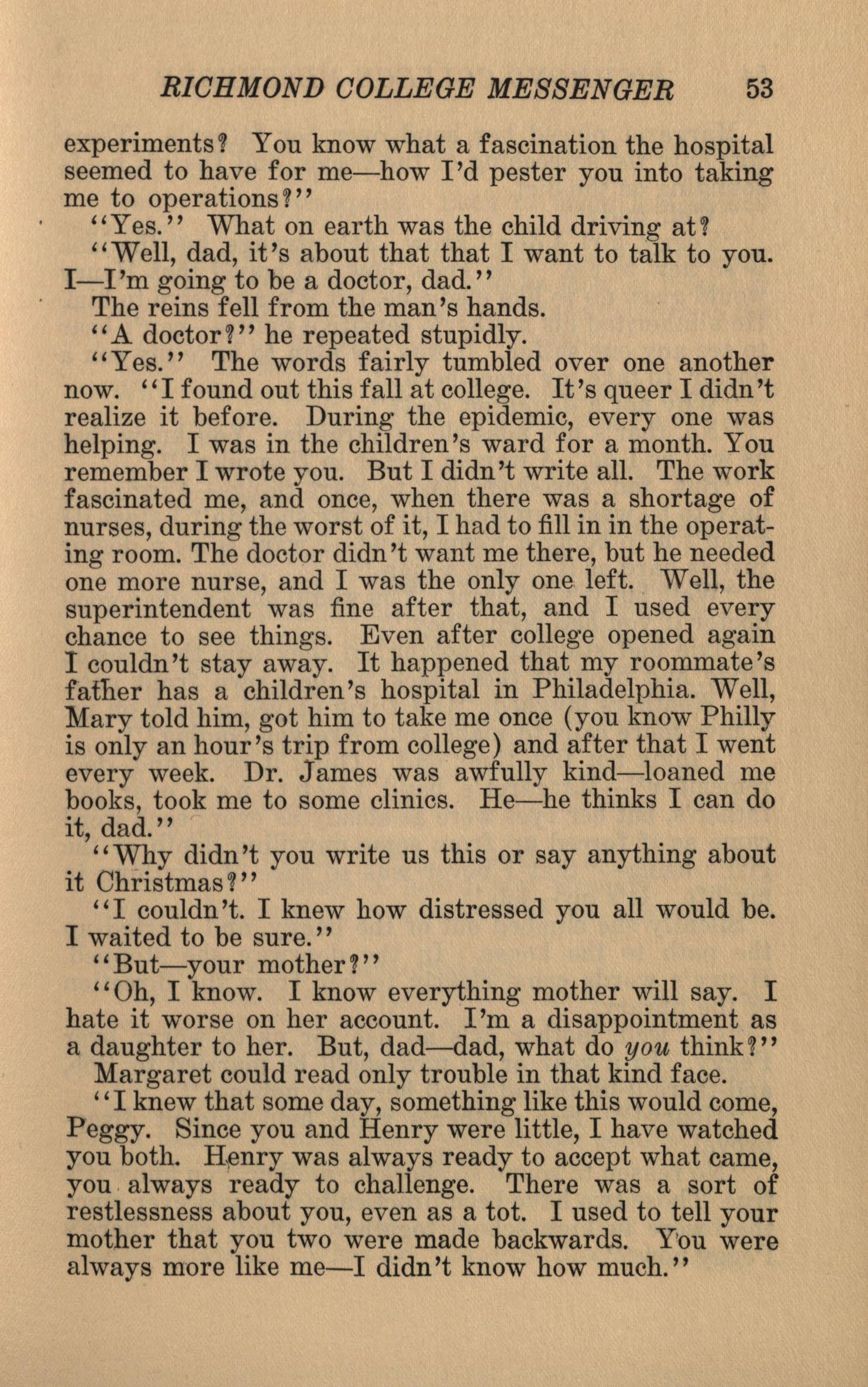
experiments? You know what a fascination the hospital seemed to have for me-how I'd pester you into taking me to operations?''
"Yes." What on earth was the child driving aU
"Well, dad, it's about that that I want to talk to you. I-I'm going to be a doctor, dad."
The reins fell from the man's hands.
'' A doctor?'' he repeated stupidly.
"Yes." The words fairly tumbled over one another now. "I found out this fall at college. It's queer I didn't realize it before. During the epidemic, every one was helping. I was in the children's ward for a month. You remember I wrote you. But I didn't write all. The work fascinated me, and once, when there was a shortage of nurses, during the worst of it, I had to fill in in the operating room. The doctor didn't want me there, but he needed one more nurse, and I was the only one left. Well, the superintendent was fine after that, and I used every chance to see things. Even after college opened again I couldn't stay away. It happened that my roommate's father has a children's hospital in Philadelphia. Well, Mary told him, got him to take me once (you know Philly is only an hour's trip from college) and after that I went every week. Dr. James was awfully kind-loaned me books, took me to some clinics. He-he thinks I can do it, dad.''
"Why didn't you write us this or say anything about it Christmas t ''
' 'I couldn't. I knew how distressed you all would be. I waited to be sure."
''But-your mother?''
'' Oh, I know. I know everything mother ,vill say. I hate it worse on her account. I'm a disappointment as a daughter to her. But, dad-dad, what do you think?" Margaret could read only trouble in that kind face.
''I knew that some day, something like this would come, Peggy. Since you and Henry were little, I have watched you both. H )enry was always ready to accept what came, you . always ready to challenge. There was a sort of restlessness about you, even as a tot. I used to tell your mother that you two were made backwards. Y!ou were always more like me-I didn't know how much.''
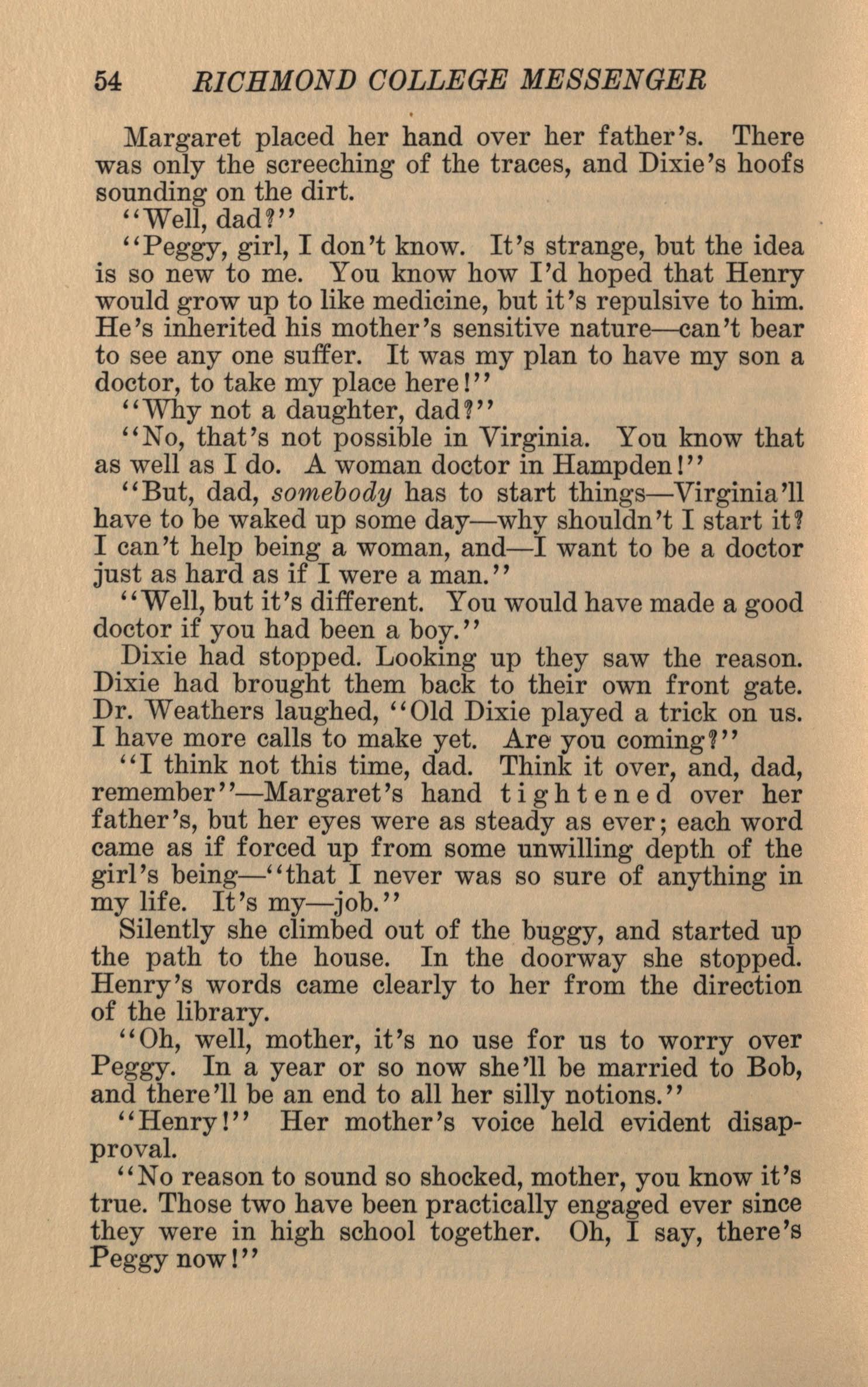
Margaret placed her hand over her father's. There was only the screeching of the traces, and Dixie's hoofs sounding on the dirt.
"Well, dad?"
"Peggy, girl, I don't know. It's strange, but the idea is so new to me. You know how I'd hoped that Henry would grow up to like medicine, but it's repulsive to him. He's inherited his mother's sensitive nature---can't bear to see any one suffer. It was my plan to have my son a doctor, to take my place here!''
"Why not a daughter, dad1"
''No, that's not possible in Virginia. You know that as well as I do. A. woman doctor in Hampden!''
"But, dad, somebody has to start things-Virginia'll have to be waked up some day-why shouldn't I start it T I can't help being a woman, and-I want to be a doctor just as hard as if I were a man. ' '
"Well, but it's different. You would have made a good doctor if you had been a boy.''
Dixie had stopped. Looking up they saw the reason. Dixie had brought them back to their own front gate. Dr. Weathers laughed, "Old Dixie played a trick on us. I have more calls to make yet. A.re you coming?"
"I think not this time, dad. Think it over, and, dad, remember"-Margaret's hand tightened over her father's, but her eyes were as steady as ever; each word came as if forced up from some unwilling depth of the girl's being-"that I never was so sure of anything in my life. It's my-job."
Silently she climbed out of the buggy, and started up the path to the house. In the doorway she stopped. Henry's words came clearly to her from the direction of the library.
"Oh, well, mother, it's no use for us to worry over Peggy. In a year or so now she '11be married to Bob, and there '11be an end to all her silly notions.''
''Henry!'' Her mother's voice held evident disapproval.
"No reason to sound so shocked, mother, you know it's true. Those two have been practically engaged ever since they were in high school together. Oh, I say, there's Peggy now!''
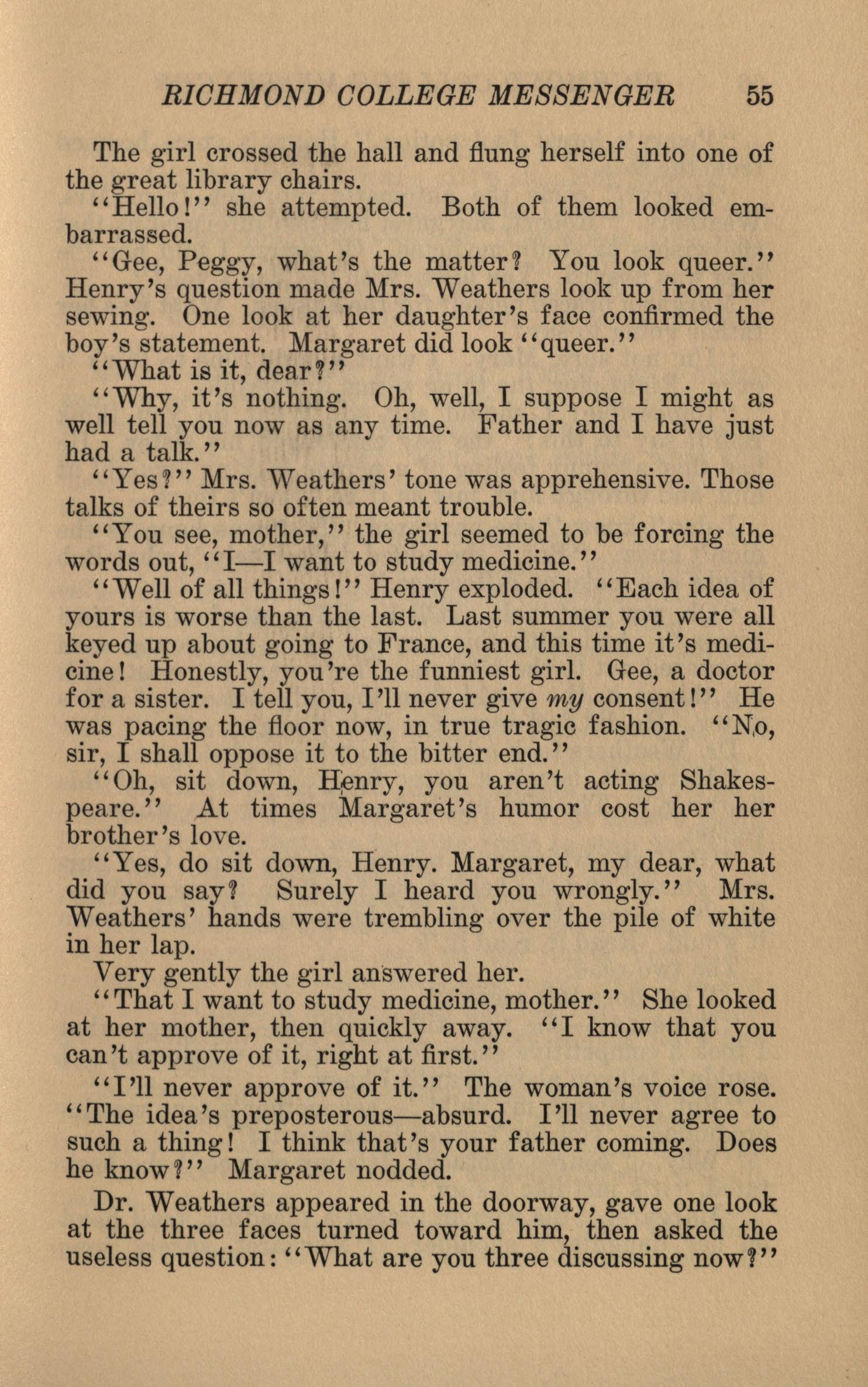
The girl crossed the hall and flung herself into one of the great library chairs.
'' Hello ! '' she attempted. Both of them looked embarrassed.
"Gee, Peggy, what's the matted You look queer." Henry's question made Mrs. Weathers look up from her sewing. One look at her daughter's face confirmed the boy's statement. Margaret did look "queer."
"What is it, dead"
"Why, it's nothing. Oh, well, I suppose I might as well tell you now as any time. Father and I have just had a talk. ''
''Yes f'' Mrs. Weathers' tone was apprehensive. Those talks of theirs so often meant trouble.
"You see, mother," the girl seemed to be forcing the words out, "I-I want to study medicine."
''Well of all things !'' Henry exploded. '' Each idea of yours is worse than the last . Last summer you were all keyed up about going to France, and this time it's medicine! Honestly, you 're the funniest girl. Gee, a doctor for a sister. I tell you, I'll never give my consent!" He was pacing the floor now, in true tragic fashion. '' N.o, sir, I shall oppose it to the bitter end."
"Oh, sit down, H,.enry, you aren't acting Shakespeare . " At times Margaret's humor cost her her brother's love.
"Yes, do sit down, Henry. Margaret, my dear, what did you sayf Surely I heard you wrongly." Mrs. Weathers' hands were trembling over the pile of white in her lap.
Very gently the girl answered her.
'' That I want to study medicine, mother.'' She looked at her mother, then quickly away. "I know that you can't approve of it, right at first.''
"I'll never approve of it." The woman's voice rose. "The idea's preposterous-absurd. I'll never agree to such a thing! I think that's your father coming. Does he know 1'' Margaret nodded.
Dr. Weathers appeared in the doorway, gave one look at the three faces turned toward him, then asked the useless question: "What are you three discussing nowt"
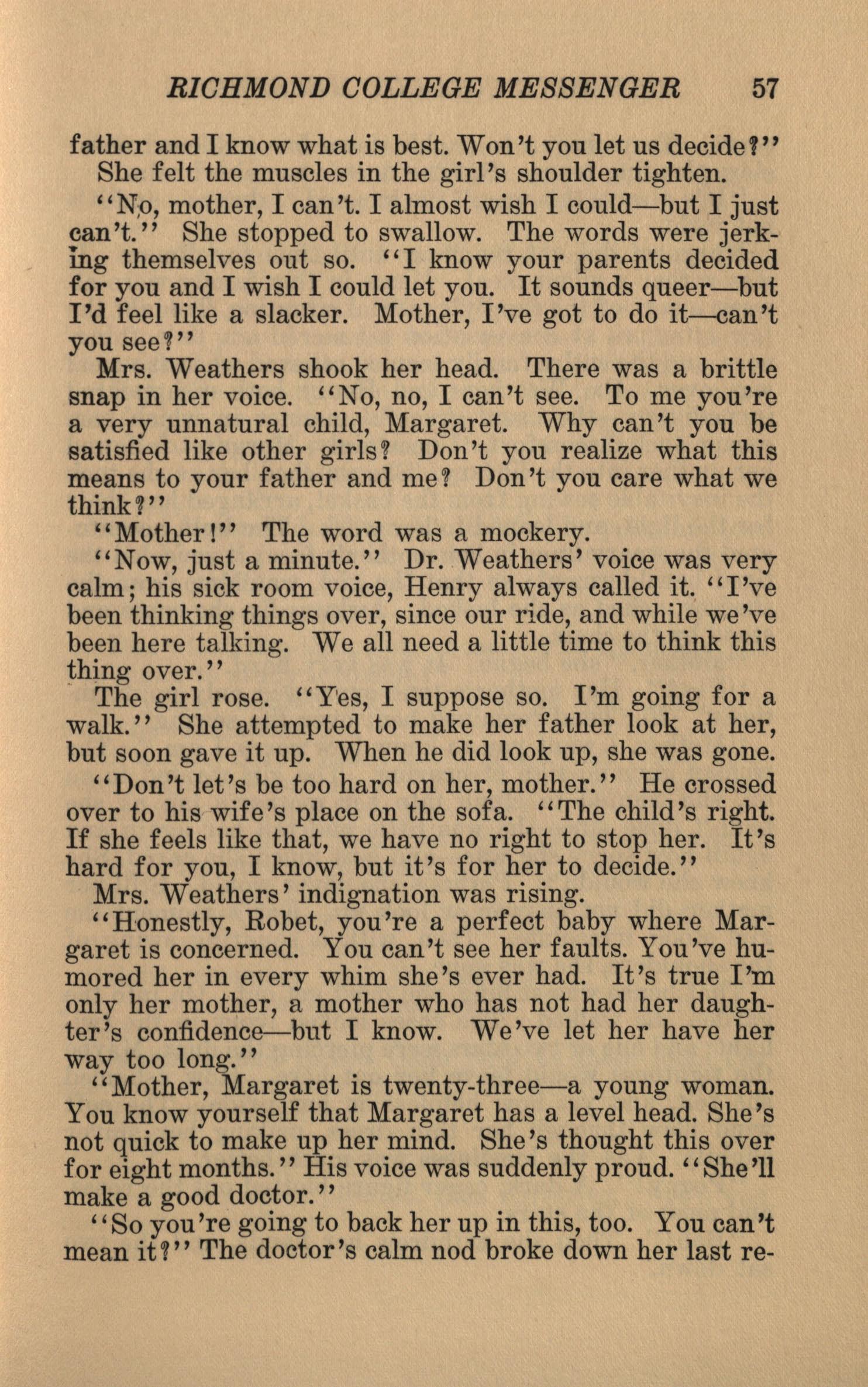
father and I know what is best. Won't you let us decide T''
She felt the muscles in the girl's shoulder tighten.
"N ;o, mother, I can't. I almost wish I could-but I just can't." She stopped to swallow. The words were jerking themselves out so. '' I know your parents decided for you and I wish I could let you. It sounds queer-but I'd feel like a slacker. Mother, I've got to do it-can't you see1''
Mrs. Weathers shook her head. There was a brittle snap in her voice. ''No, no, I can't see. To me you 're a very unnatural child, Margaret. Why can't you be satisfied like other girls f Don't you realize what this means to your father and me i Don't you care what we think1 ''
''Mother!'' The word was a mockery.
"Now, just a minute." Dr. Weathers' voice was very calm; his sick room voice, Henry always called it. "I've been thinking things over, since our ride, and while we've been here talking. We all need a little time to think this thing over. ''
The girl rose. "Y 'es, I suppose so. I'm going for a walk." She attempted to make her father look at her, but soon gave it up. When he did look up, she was gone.
"Don't let's be too hard on her, mother." He crossed over to his wife's place on the sofa. '' The child's right. If she feels like that, we have no right to stop her. It's hard for you, I know, but it's for her to decide.''
Mrs. Weathers' indignation was rising.
'' Honestly, Ro bet, you 're a perfect baby where Margaret is concerned. You can't see her faults. You've humored her in every whim she's ever had. It's true I'm only her mother, a mother who has not had her daughter's confidence-but I know. We've let her have her way too long.''
"Mother, Margaret is twenty-three-a young woman. You know yourself that Margaret has a level head. She's not quick to make up her mind. She's thought this over for eight months.'' His voice was suddenly proud. '' She '11 make a good doctor."
'' So you 're going to back her up in this, too. You can't mean iU" The doctor's calm nod broke down her last re-
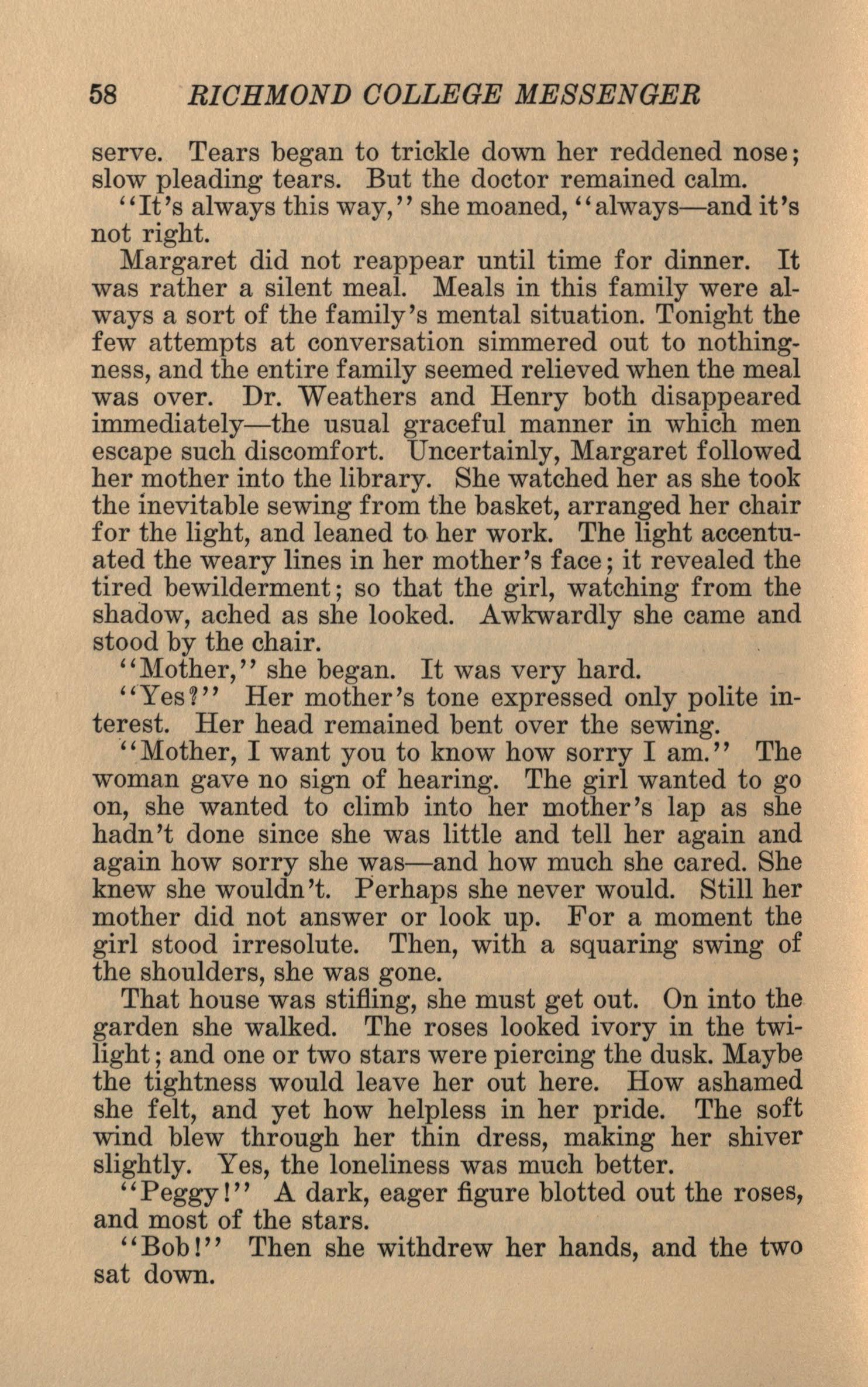
serve. Tears began to trickle down her reddened nose; slow pleading tears. But the doctor remained calm. "It's always this way," she moaned, "always-and it's not right.
Margaret did not reappear until time for dinner. It was rather a silent meal. Meals in this family were always a sort of the family's mental situation. Tonight the few attempts at conversation simmered out to nothingness, and the entire family seemed relieved when the meal was over. Dr. Weathers and Henry both disappeared immediately-the usual graceful manner in which men escape such discomfort. Uncertainly, Margaret followed her mother into the library. She watched her as she took the inevitable sewing from the basket, arranged her chair for the light, and leaned to her work. The light accentuated the weary lines in her mother's face; it revealed the tired bewilderment; so that the girl, watching from the shadow, ached as she looked. Awkwardly she came and stood by the chair.
"Mother," she began. It was very hard.
''Yes i '' Her mother's tone expressed only polite interest. Her head remained bent over the sewing.
"Mother, I want you to know how sorry I am." The woman gave no sign of hearing. The girl wanted to go on, she wanted to climb into her mother's lap as she hadn't done since she was little and tell her again and again how sorry she was-and how much she cared. She knew she wouldn't. Perhaps she never would. Still her mother did not answer or look up. For a moment the girl stood irresolute. Then, with a squaring swing of the shoulders, she was gone.
That house was stifling, she must get out. On into the garden she walked. The roses looked ivory in the twilight; and one or two stars were piercing the dusk. Maybe the tightness would leave her out here. How ashamed she felt, and yet how helpless in her pride. The soft wind blew through her thin dress, making her shiver slightly. Yes, the loneliness was much better.
''Peggy!'' A dark, eager figure blotted out the roses, and most of the stars.
"Bob!" Then she withdrew her hands, and the two sat down.
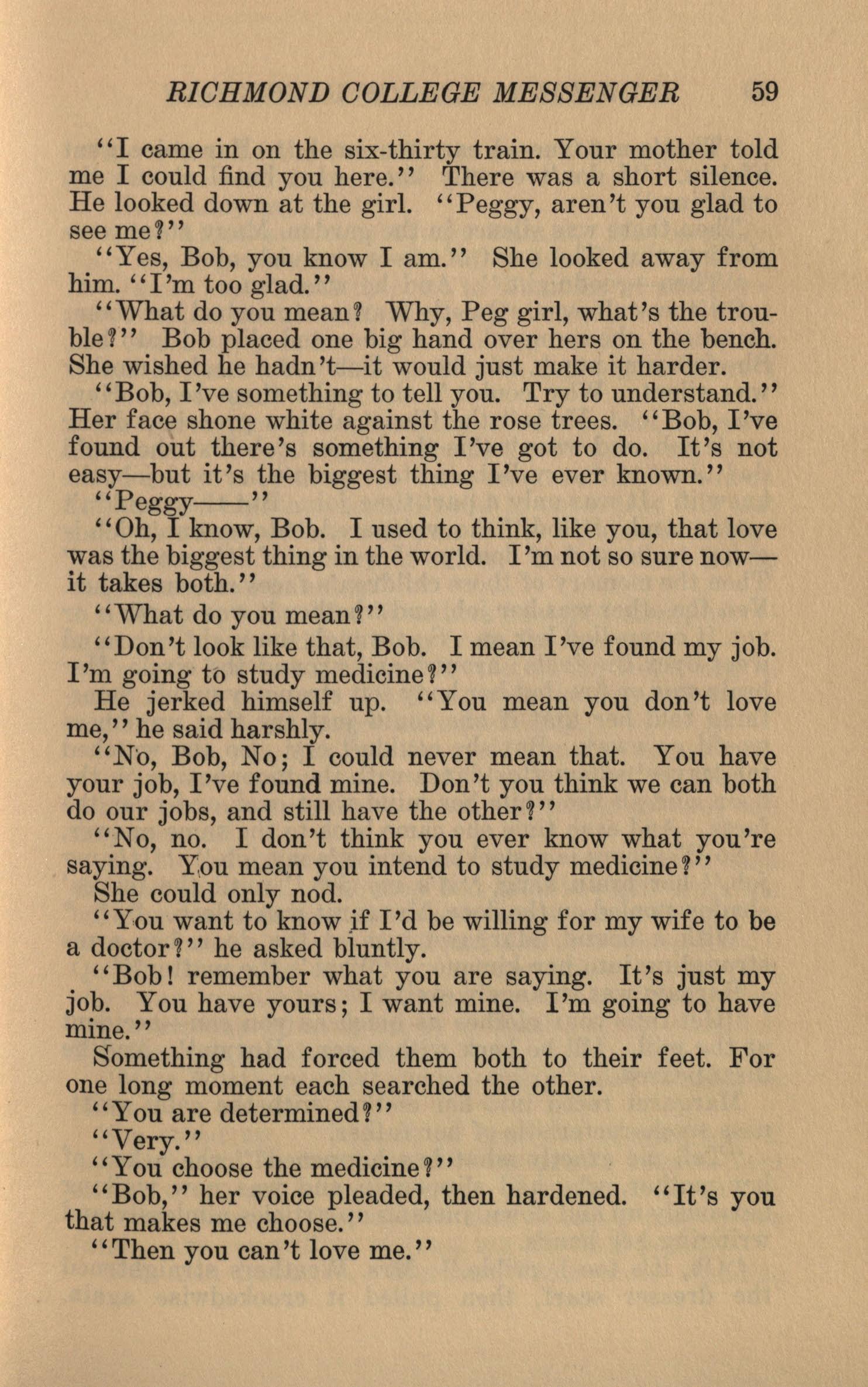
"I came in on the six-thirty train. Your mother told me I could find you here.' ' There was a short silence. He looked down at the girl. "Peggy, aren't you glad to see me7"
"Yes, Bob, you know I am." She looked away from him. "I'm too glad."
"What do you mean1 Why, Peg girl, what's the trouble 7" Bob placed one big hand over hers on the bench. She wished he hadn't-it would just make it harder.
"Bob, I've something to tell you. Try to understand." Her face shone white against the rose trees. "Bob, I've found out there's something I've got to do. It's not easy-but it's the biggest thing I've ever known."
"Peggy--"
'' Oh, I know, Bob. I used to think, like you, that love was the biggest thing in the world. I'm not so sure nowit takes both."
"What do you mean 7"
"Don't look like that, Bob. I mean I've found my job. I'm going to study medicine 7''
He jerked himself up. "You mean you don't love me," he said harshly.
"No, Bob, No; I could never mean that. You have your job, I've found mine. Don't you think we can both do our jobs, and still have the other7"
"No, no. I don't think you ever know what you're saying. Y,ou mean you intend to study medicine 7''
She could only nod.
"You want to know if I'd be willing for my wife to be a doctor7" he asked bluntly.
"Bob! remember what you are saying. It's just my job. You have yours; I want mine. I'm going to have mine.''
Something had forced them both to their feet. For one long moment each searched the other.
''You are determined 7''
"Very."
' 'You choose the medicine 7'' ''Bob,'' her voice pleaded, then hardened. ''It's you that makes me choose.''
'' Then you can't love me.''
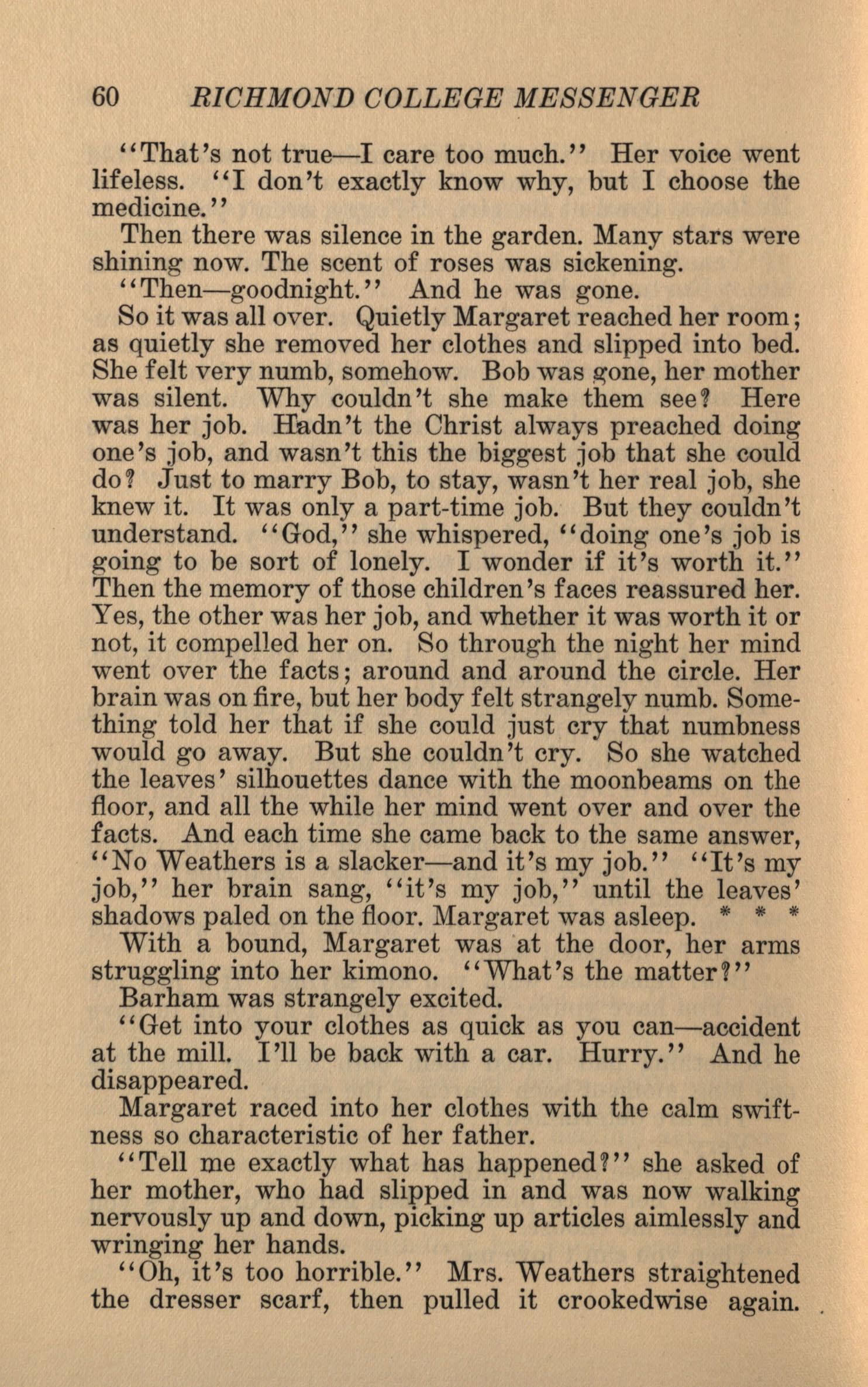
"That's not true-I care too much." Her voice went lifeless. "I don't exactly know why, but I choose the medicine. ''
Then there was silence in the garden. Many stars were shining now. The scent of roses was sickening. ''Then-goodnight.'' And he was gone.
So it was all over. Quietly Margaret reached her room; as quietly she removed her clothes and slipped into bed. She felt very numb, somehow. Bob was gone, her mother was silent. Why couldn't she make them see 1 Here was her job. Hadn't the Christ always preached doing one's job, and wasn't this the biggest job that she could do1 Just to marry Bob, to stay, wasn't her real job, she knew it. It was only a part-time job. But they couldn't understand. ''God,'' she whispered, '' doing one's job is going to be sort of lonely. I wonder if it's worth it."
Then the memory of those children's faces reassured her. Yes, the other was her job, and whether it was worth it or not, it compelled her on. So through the night her mind went over the facts ; around and around the circle. Her brain was on fire, but her body felt strangely numb. Something told her that if she could just cry that numbness would go away.
But she couldn't cry. So she watched the leaves' silhouettes dance with the moonbeams on the floor, and all the while her mind went over and over the facts. And each time she came back to the same answer, "No Weathers is a slacker-and it's my job." "It's my job," her brain sang, "it's my job," until the leaves' shadows paled on the floor. Margaret was asleep. * * *
With a bound, Margaret was ·at the door, her arms struggling into her kimono. "What's the matted" Barham was strangely excited.
'' Get into your clothes as quick as you can-accident at the mill. I'll be back with a car. Hurry." And he disappeared.
Margaret raced into her clothes with the calm swiftness so characteristic of her father.
'' Tell me exactly what has happened 1'' she asked of her mother, who had slipped in and was now walking nervously up and down, picking up articles aimlessly and wringing her hands.
'' Oh, it's too horrible.'' Mrs. Weathers straightened the dresser scarf, then pulled it crooked wise again.
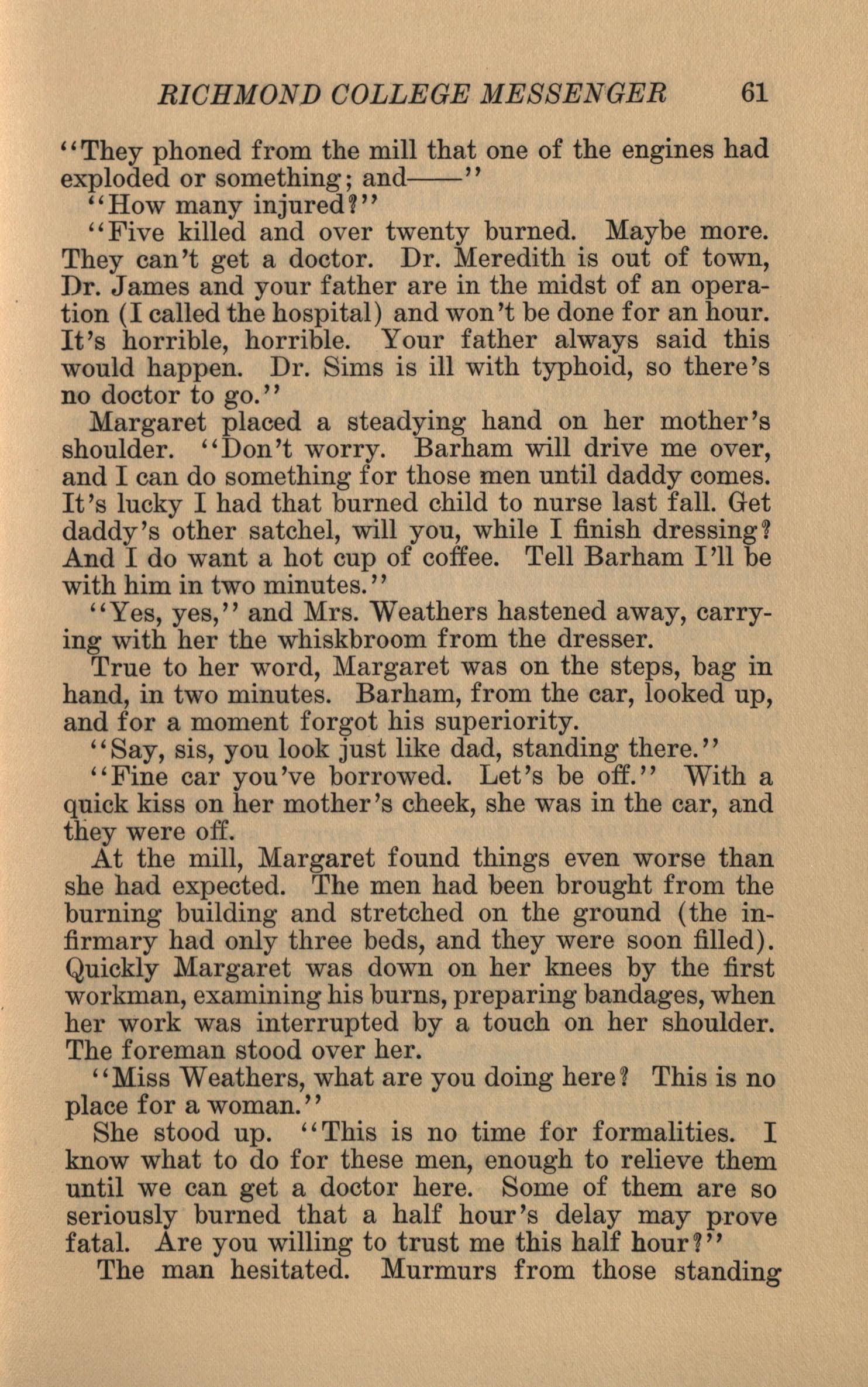
'' They phoned from the mill that one of the engines had exploded or something; and--"
'' How many injured 1''
'' Five killed and over twenty burned. Maybe more. They can't get a doctor. Dr. Meredith is out of town, Dr. James and your father are in the midst of an operation (I called the hospital) and won't be done for an hour. It's horrible, horrible. Your father always said this would happen. Dr. Sims is ill with typhoid, so there's no doctor to go.''
Margaret placed a steadying hand on her mother's shoulder. "Don't worry. Barham will drive me over, and I can do something for those men until daddy comes. It's lucky I had that burned child to nurse last fall. Get daddy's other satchel, will you, while I finish dressing? And I do want a hot cup of coffee. Tell Barham I '11be with him in two minutes.''
"Yes, yes," and Mrs. Weathers hastened away, carrying with her the whiskbroom from the dresser.
True to her word, Margaret was on the steps, bag in hand, in two minutes. Barham, from the car, looked up, and for a moment forgot his superiority.
"Say, sis, you look just like dad, standing there."
'' Fine car you've borrowed. Let's be off.'' With a quick kiss on her mother's cheek, she was in the car, and they were off.
At the mill, Margaret found things even worse than she had expected. The men had been brought from the burning building and stretched on the ground ( the infirmary had only three beds, and they were soon filled). Quickly Margaret was down on her knees by the first workman, examining his burns, preparing bandages, when her work was interrupted by a touch on her shoulder. The foreman stood over her.
'' Miss Weathers, what are you doing here 1 This is no place for a woman.''
She stood up. '' This is no time for formalities. I know what to do for these men, enough to relieve them until we can get a doctor here. Some of them are so seriously burned that a half hour's delay may prove fatal. Are you willing to trust me this half hour 1''
The man hesitated. Murmurs from those standing
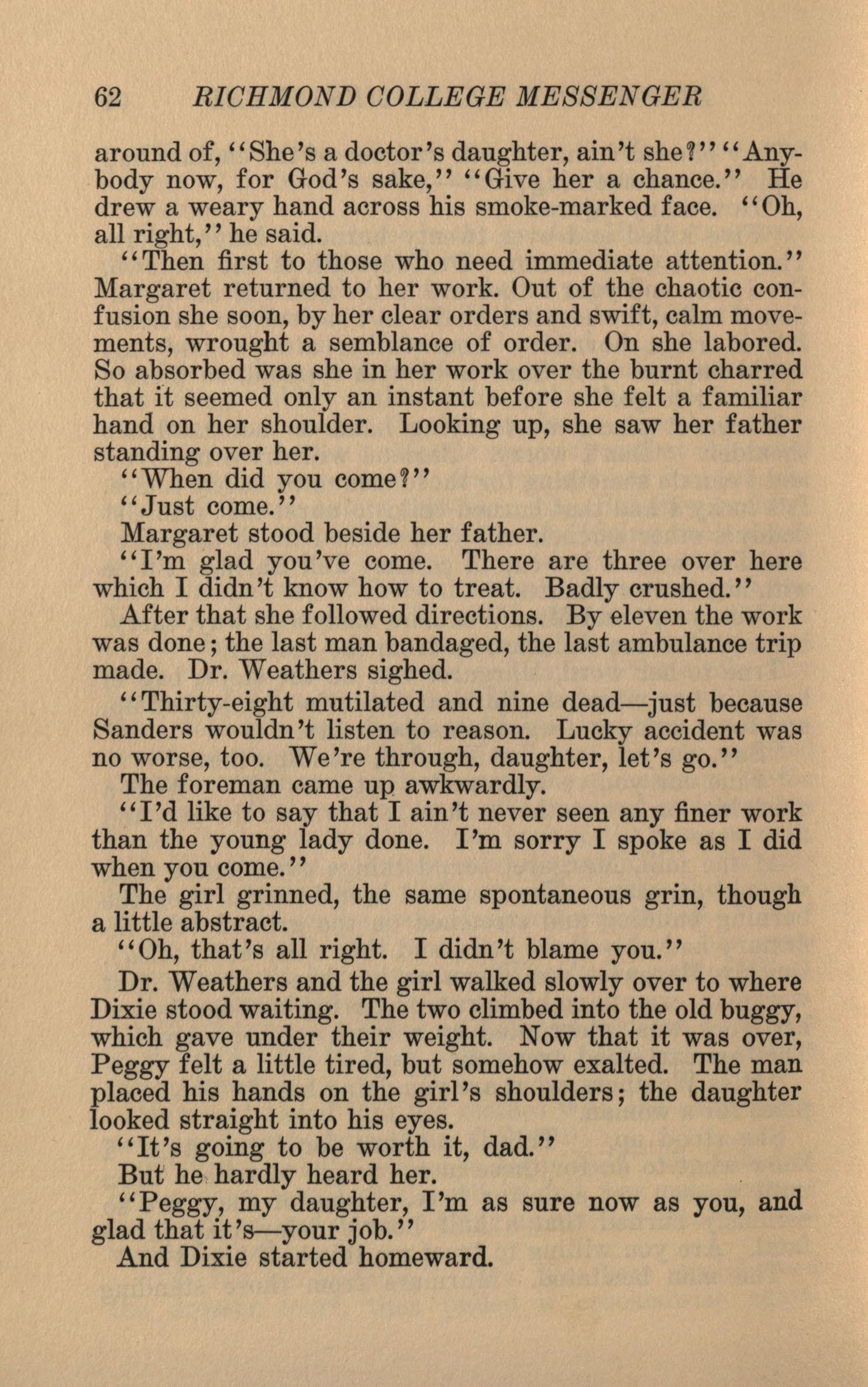
around of, "She's a doctor's daughter, ain't she?" "Anybody now, for God's sake," "Give her a chance." He drew a weary hand across his smoke-marked face. '' Oh, all right,'' he said.
"Then first to those who need immediate attention." Margaret returned to her work. Out of the chaotic confusion she soon, by her clear orders and swift, calm movements, wrought a semblance of order. On she labored. So absorbed was she in her work over the burnt charred that it seemed only an instant before she felt a familiar hand on her shoulder. Looking up, she saw her father standing over her.
'' When did you come?''
''Just come.''
Margaret stood beside her father.
''I'm glad you've come. There are three over here which I didn't know how to treat. Badly crushed.''
After that she followed directions. By eleven the work was done; the last man bandaged, the last ambulance trip made. Dr. Weathers sighed.
'' Thirty-eight mutilated and nine dead-just because Sanders wouldn't listen to reason. Lucky accident was no worse, too. We 're through, daughter, let's go.''
The foreman came up awkwardly.
"I'd like to say that I ain't never seen any finer work than the young lady done. I'm sorry I spoke as I did when you come.''
The girl grinned, the same spontaneous grin, though a little abstract.
"Oh, that's all right. I didn't blame you."
Dr. Weathers and the girl walked slowly over to where Dixie stood waiting. The two climbed into the old buggy, which gave under their weight. Now that it was over, Peggy felt a little tired, but somehow exalted. The man placed his hands on the girl's shoulders; the daughter looked straight into his eyes.
"It's going to be worth it, dad."
But he , hardly heard her.
"Peggy, my daughter, I'm as sure now as you, and glad that it's-your job.''
And Dixie started homeward.
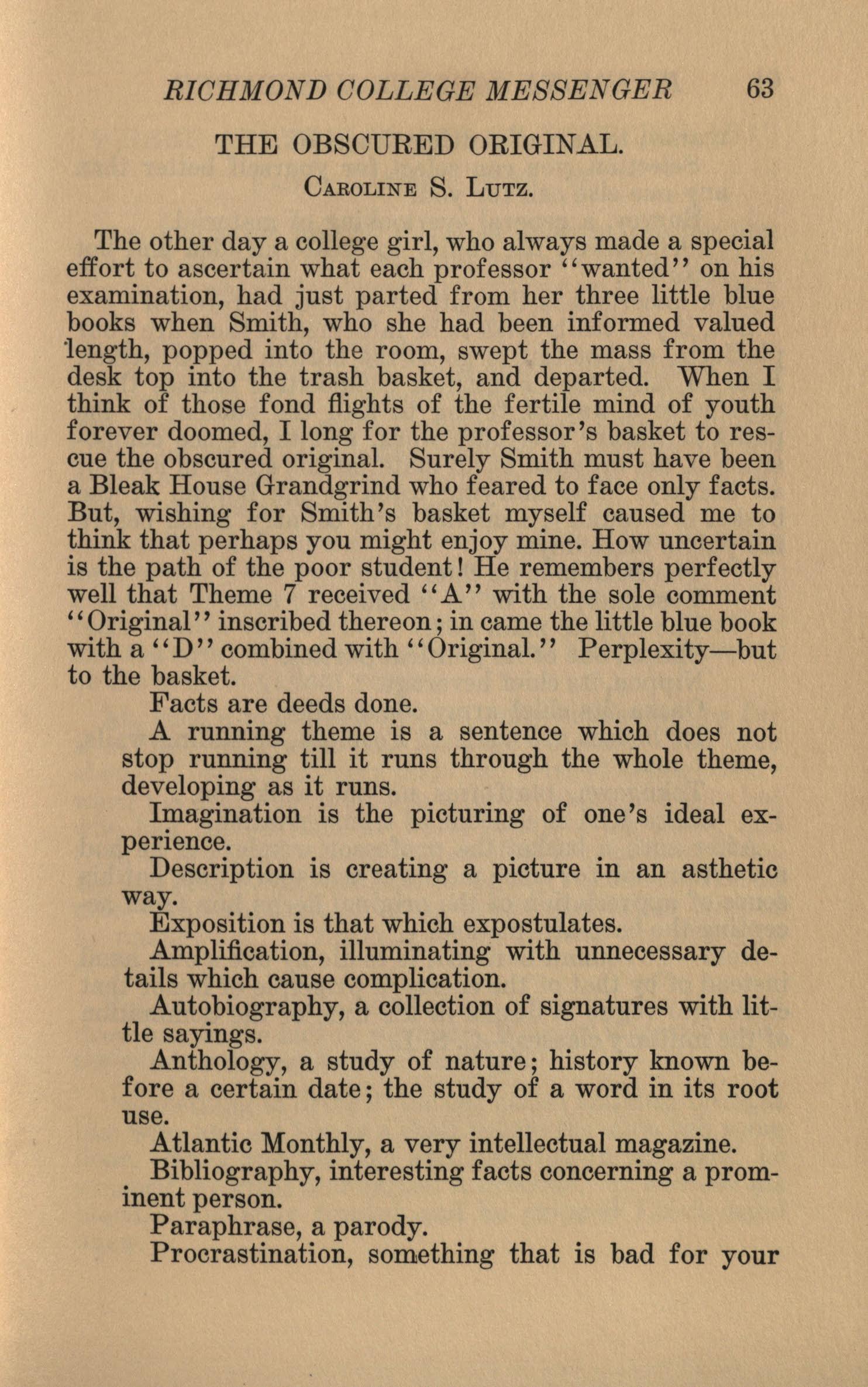
THE OBSCURED ORIGINAL.
CAROLINE s. LUTZ.
The other day a college girl, who always made a special effort to ascertain what each professor "wanted" on his examination, had just parted from her three little blue books when Smith, who she had been informed valued 'length, popped into the room, swept the mass from the desk top into the trash basket, and departed. When I think of those fond flights of the fertile mind of youth forever doomed, I long for the professor's basket to rescue the obscured original. Surely Smith must have been a Bleak House Grandgrind who feared to face only facts. But, wishing for Smith's basket myself caused me to think that perhaps you might enjoy mine. How uncertain is the path of the poor student! He remembers perfectly well that Theme 7 received "A" with the sole comment ''Original'' inscribed thereon; in came the little blue book with a '' D '' combined with ''Original.'' Perplexity-but to the basket.
Facts are deeds done.
A running theme is a sentence which does not stop running till it runs through the whole theme, developing as it runs.
Imagination is the picturing of one's ideal experience.
Description is creating a picture in an asthetic way.
Exposition is that which expostulates.
Amplification, illuminating with unnecessary details which cause complication.
Autobiography, a collection of signatures with little sayings.
Anthology, a study of nature; history known before a certain date; the study of a word in its root use.
Atlantic Monthly, a very intellectual magazine.
Bibliography, interesting facts concerning a prominent person.
Paraphrase, a parody.
Procrastination, something that is bad for your
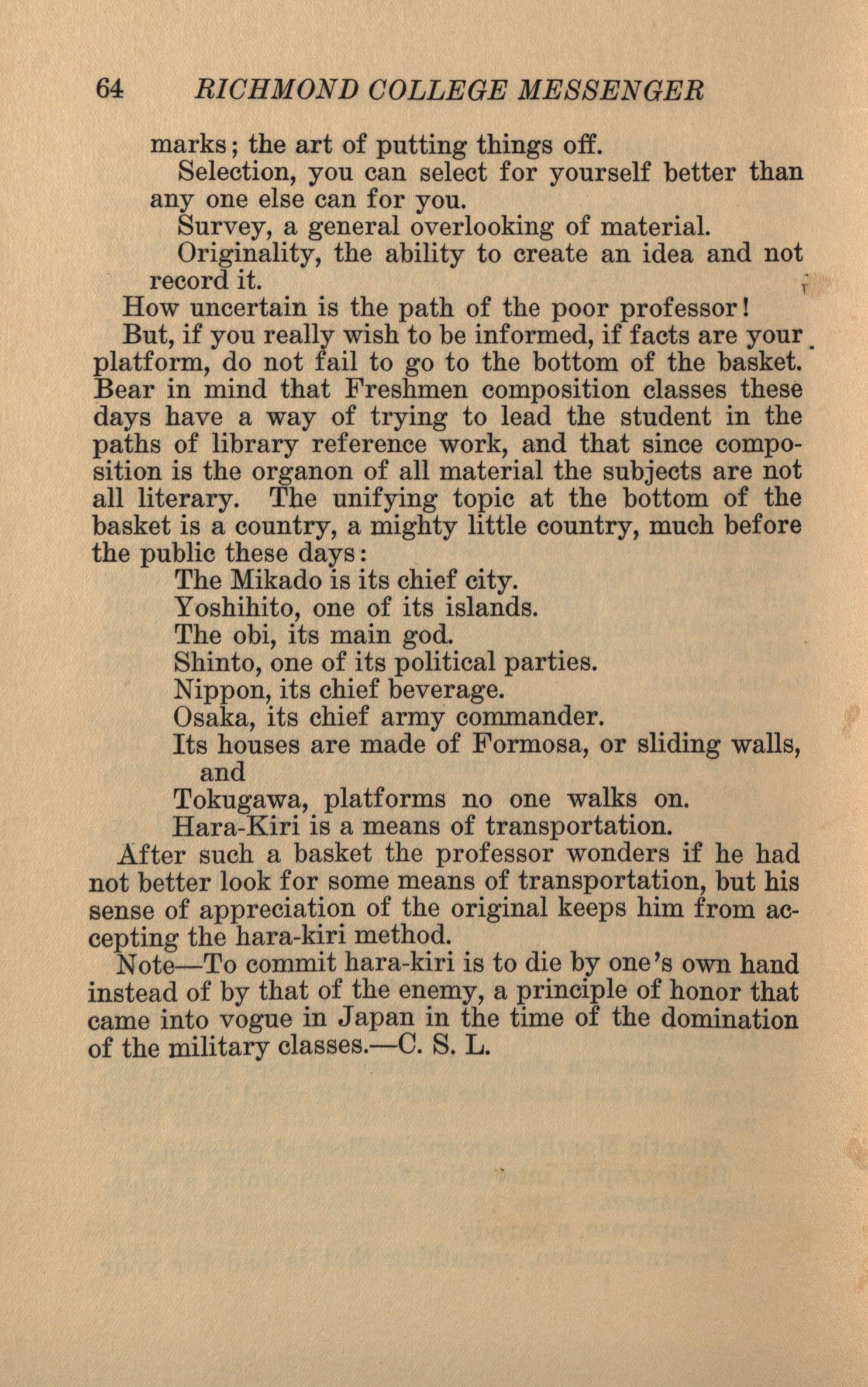
marks; the art of putting things off. Selection, you can select for yourself better than any one else can for you.
Survey, a general overlooking of material. Originality, the ability to create an idea and not record it. . T
How uncertain is the path of the poor professor !
But, if you really wish to be informed, if facts are your . platform, do not fail to go to the bottom of the basket. Bear in mind that Freshmen composition classes these days have a way of trying to lead the student in the paths of library reference work, and that since composition is the organon of all material the subjects are not all literary. The unifying topic at the bottom of the basket is a country, a mighty little country, much before the public these days:
The Mikado is its chief city. Yoshihito, one of its islands.
The obi, its main god.
Shinto, one of its political parties.
Nippon, its chief beverage.
Osaka, its chief army commander. Its houses are made of Formosa, or sliding walls, and Tokugawa, platforms no one walks on.
Hara-Kiri is a means of transportation.
After such a basket the professor wonders if he had not better look for some means of transportation, but his sense of appreciation of the original keeps him from accepting the hara-kiri method.
Note-To commit hara-kiri is to die by one's own hand instead of by that of the enemy, a principle of honor that came into vogue in Japan in the time of the domination of the military classes.-C. S. L.
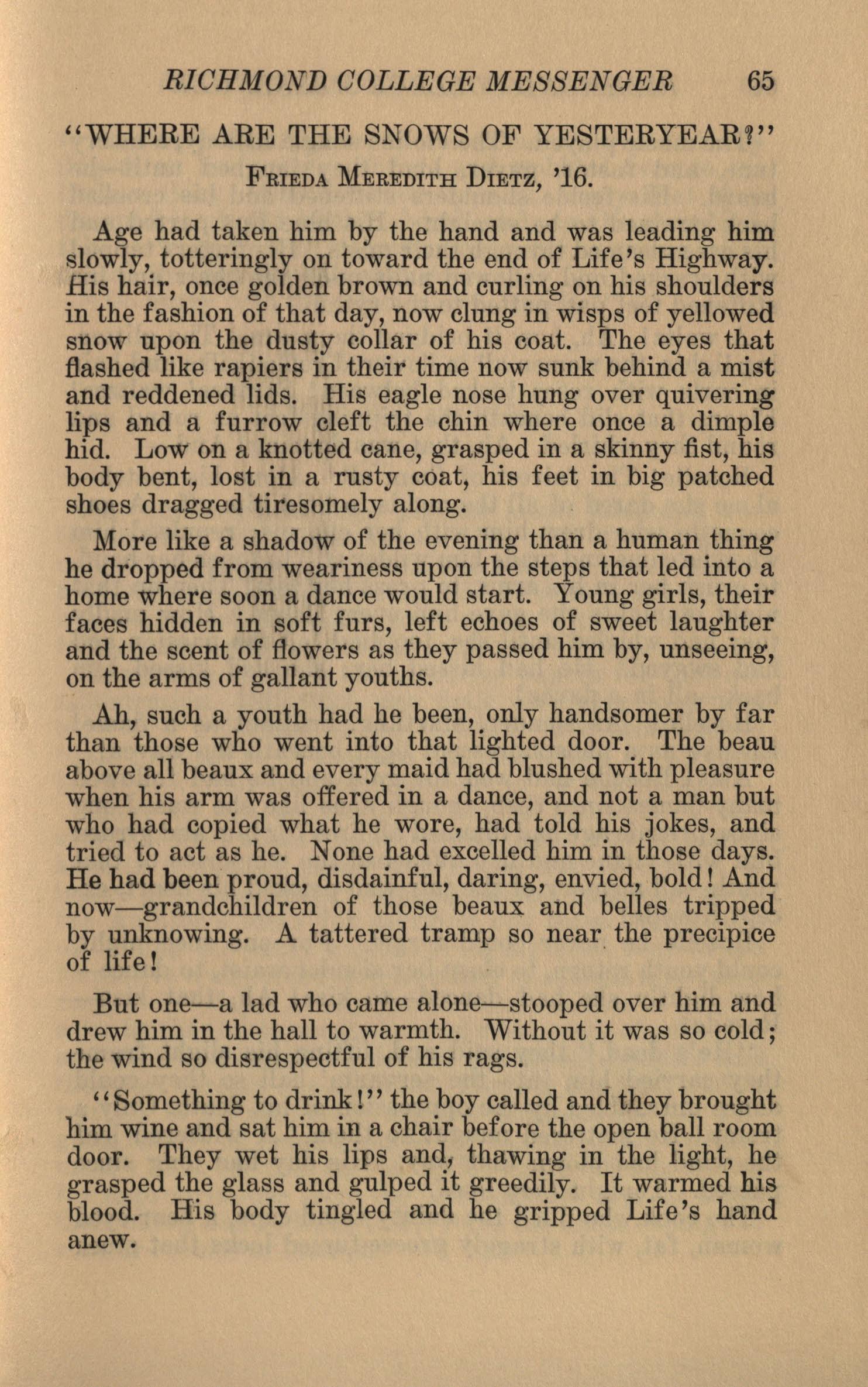
"WHERE
ARE THE SNOWS OF YESTERYEAR1"
FRIEDA MEREDITH DIETZ, '16.
Age had taken him by the hand and was leading him slowly, totteringly on toward the end of Life's Highway. His hair, once golden brown and curling on his shoulders in the fashion of that day, now clung in wisps of yellowed snow upon the dusty collar of his coat. The eyes that flashed like rapiers in their time now sunk behind a mist and reddened lids. His eagle nose hung over quivering lips and a furrow cleft the chin where once a dimple hid. Low on a knotted cane, grasped in a skinny fist, his body bent, lost in a rusty coat, his feet in big patched shoes dragged tiresomely along.
More like a shadow of the evening than a human thing he dropped from weariness upon the steps that led into a home where soon a dance would start. Young girls, their faces hidden in soft furs, left echoes of sweet laughter and the scent of flowers as they passed him by, unseeing, on the arms of gallant youths.
Ah, such a youth had he been, only handsomer by far than those who went into that lighted door. The beau above all beaux and every maid had blushed with pleasure when his arm was offered in a dance, and not a man but who had copied what he wore, had told his jokes, and tried to act as he. None had excelled him in those days. He had been proud, disdainful, daring, envied, bold! And now-grandchildren of those beau~ and belles tripped by unknowing. A tattered tramp so near . the precipice of life!
But one-a lad who came alone-stooped over him and drew him in the hall to warmth. Without it was so cold; the wind so disrespectful of his rags.
'' Something to drink!'' the boy called and they brought him wine and sat him in a chair before the open ball room door. They wet his lips and; thawing in the light, he grasped the glass and gulped it greedily. It warmed his blood. His body tingled and he gripped Life's hand anew.
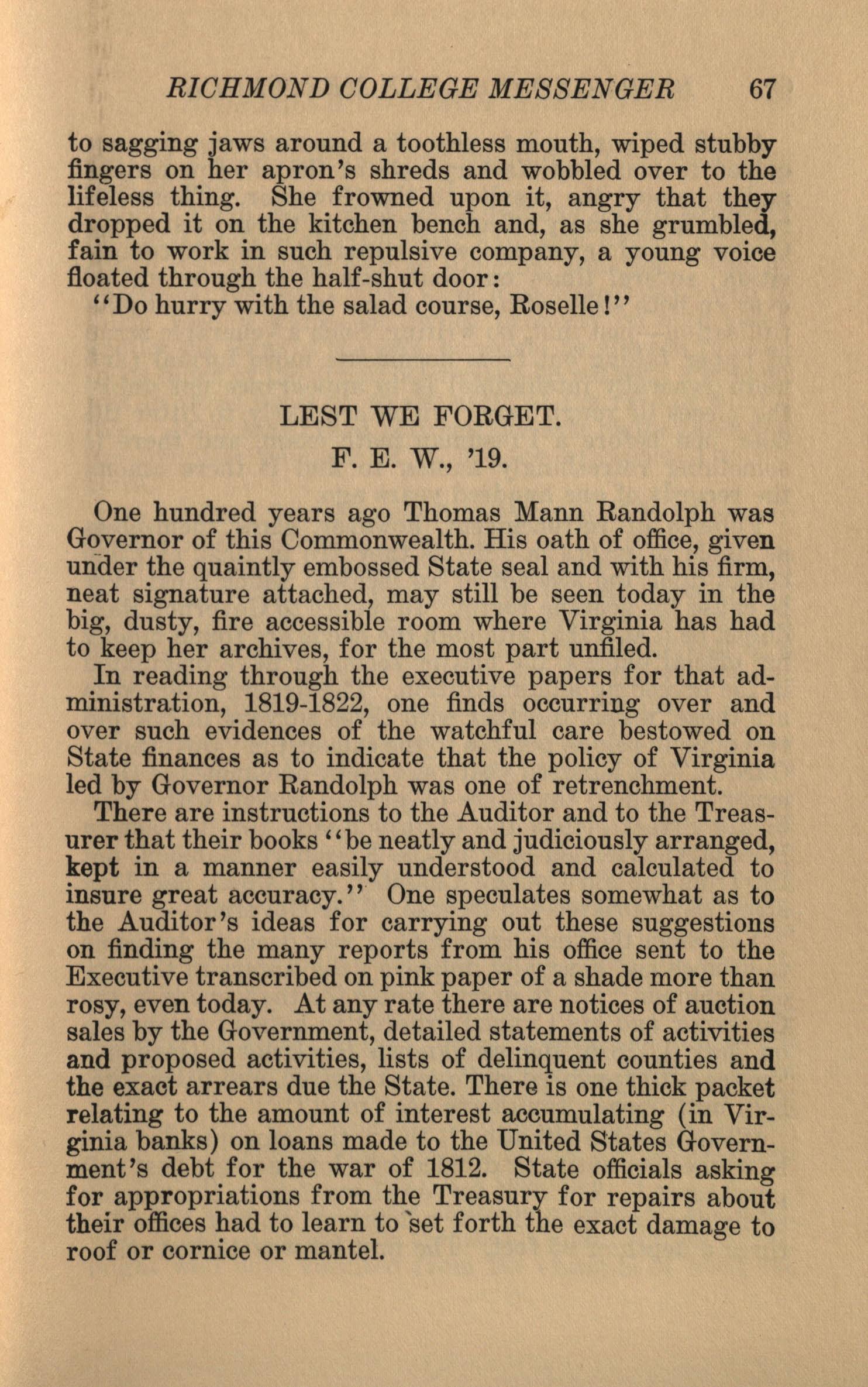
to sagging jaws around a toothless mouth, wiped stubby fingers on her apron's shreds and wobbled over to the lifeless thing. She frowned upon it, angry that they dropped it on the kitchen bench and, as she grumbled, fain to work in such repulsive company, a young voice floated through the half-shut door: ''Do hurry with the salad course, Roselle!''
LEST WE FORGET.
F. E. W., '19.
One hundred years ago Thomas Mann Randolph was Governor of this Commonwealth. His oath of office, given under the quaintly embossed State seal and with his firm, neat signature attached, may still be seen today in the big, dusty, fire accessible room where Virginia has had to keep her archives, for the most part un:filed.
In reading through the executive papers for that administration, 1819-1822, one finds occurring over and over such evidences of the watchful care bestowed on State :finances as to indicate that the policy of Virginia led by Governor Randolph was one of retrenchment.
There are instructions to the Auditor and to the Treasurer that their books '' be neatly and judiciously arranged, kept in a manner easily understood and calculated to insure great accuracy.', . One speculates somewhat as to the Auditor's ideas for carrying out these suggestions on finding the many reports from his office sent to the Executive transcribed on pink paper of a shade more than rosy, even today. At any rate there are notices of auction sales by the Government, detailed statements of activities and proposed activities, lists of delinquent counties and the exact arrears due the State. There is one thick packet relating to the amount of interest accumulating (in Virginia banks) on loans made to the United States Government's debt for the war of 1812. State officials asking for appropriations from the Treasury for repairs about their offices had to learn to set forth the exact damage to roof or cornice or mantel.
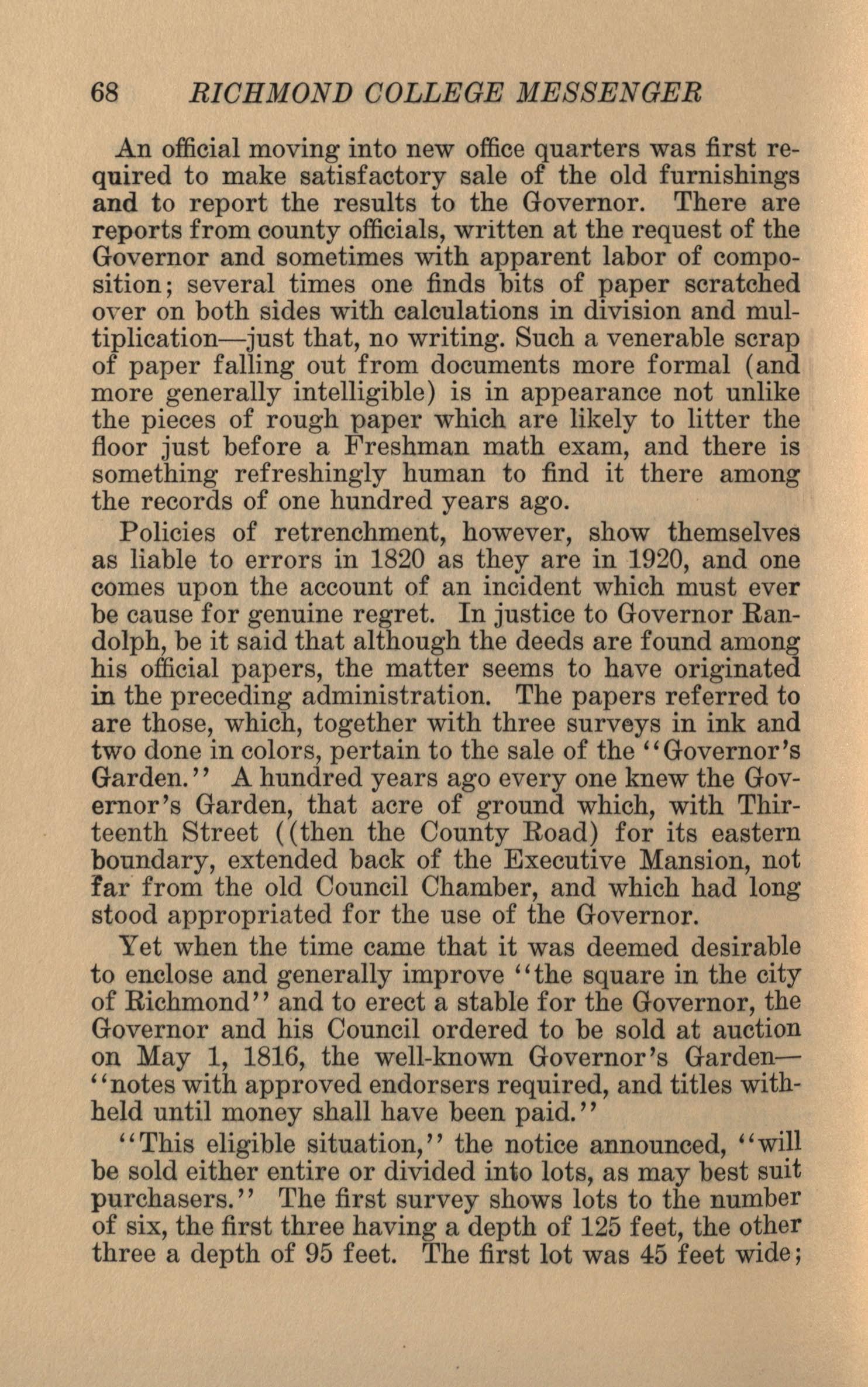
An official moving into new office quarters was :first required to make satisfactory sale of the old furnishings and to report the results to the Governor. There are reports from county officials, written at the request of the Governor and sometimes with apparent labor of composition; several times one :finds bits of paper scratched over on both sides with calculations in division and multiplication-just that, no writing. Such a venerable scrap of paper falling out from documents more formal ( and more generally intelligible) is in appearance not unlike the pieces of rough paper which are likely to litter the floor just before a Freshman math exam, and there is something refreshingly human to find it there among the records of one hundred years ago.
Policies of retrenchment, however, show themselves as liable to errors in 1820 as they are in 1920, and one comes upon the account of an incident which must ever be cause for genuine regret. In justice to Governor Randolph, be it said that although the deeds are found among his official papers, the matter seems to have originated in the preceding administration. The papers ref erred to are those, which, together with three surveys in ink and two done in colors, pertain to the sale of the "Governor's Garden.'' A hundred years ago every one knew the Governor's Garden, that acre of ground which, with Thirteenth Street ( (then the County Road) for its eastern boundary, extended back of the Executive Mansion, not iar from the old Council Chamber, and which had long stood appropriated for the use of the Governor.
Yet when the time came that it was deemed desirable to enclose and generally improve '' the square in the city of Richmond" and to erect a stable for the Governor, the Governor and his Council ordered to be sold at auction on May 1, 1816, the well-known Governor's Garden"notes with approved endorsers required, and titles withheld until money shall have been paid.''
"This eligible situation," the notice announced, "will be sold either entire or divided into lots, as may best suit purchasers.'' The first survey shows lots to the number of six, the first three having a depth of 125 feet, the other three a depth of 95 feet. The :first lot was 45 feet wide;
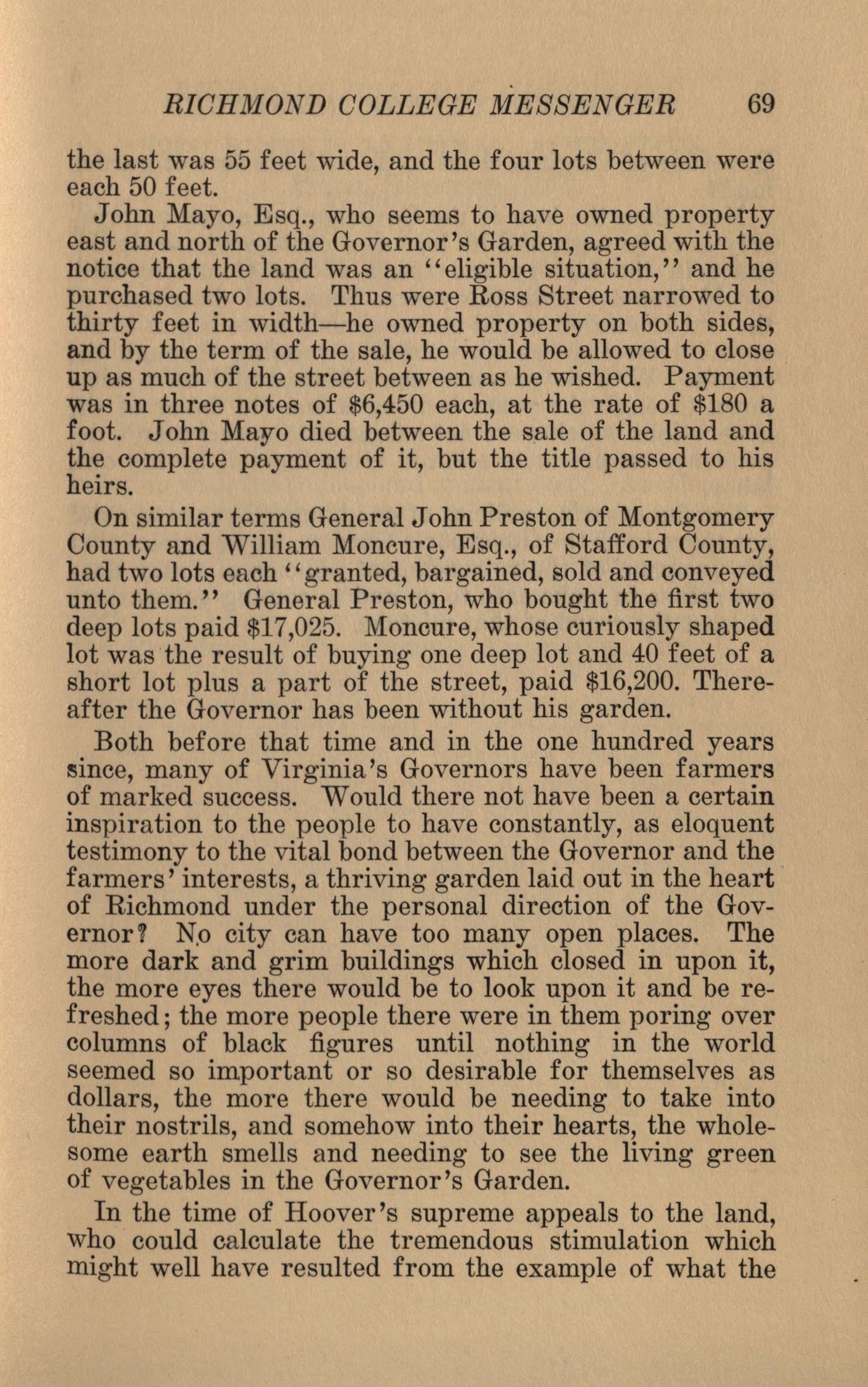
the last was 55 feet wide, and the four lots between were each 50 feet.
John Mayo, Esq., who seems to have owned property east and north of the Governor's Garden, agreed with the notice that the land was an '' eligible situation,'' and he purchased two lots. Thus were Ross Street narrowed to thirty feet in width-he owned property on both sides, and by the term of the sale, he would be allowed to close up as much of the street between as he wished. Payment was in three notes of $6,450 each, at the rate of $180 a foot. John Mayo died between the sale of the land and the complete payment of it, but the title passed to his heirs.
On similar terms General John Preston of Montgomery County and William Moncure, Esq., of Stafford County, had two lots each '' granted, bargained, sold and conveyed unto them.'' General Preston, who bought the first two deep lots paid $17,025. Moncure, whose curiously shaped lot was the result of buying one deep lot and 40 feet of a short lot plus a part of the street, paid $16,200. Thereafter the Governor has been without his garden.
Both before that time and in the one hundred years 5ince, many of Virginia's Governors have been farmers of marked success. Would there not have been a certain inspiration to the people to have constantly, as eloquent testimony to the vital bond between the Governor and the farmers' interests, a thriving garden laid out in the heart of Richmond under the personal direction of the Governor? N.o city can have too many open places. The more dark and grim buildings which closed in upon it, the more eyes there would be to look upon it and be refreshed; the more people there were in them poring over columns of black :figures until nothing in the world seemed so important or so desirable for themselves as dollars, the more there would be needing to take into their nostrils, and somehow into their hearts, the wholesome earth smells and needing to see the living green of vegetables in the Governor's Garden.
In the time of Hoover's supreme appeals to the land, who could calculate the tremendous stimulation which might well have resulted from the example of what the
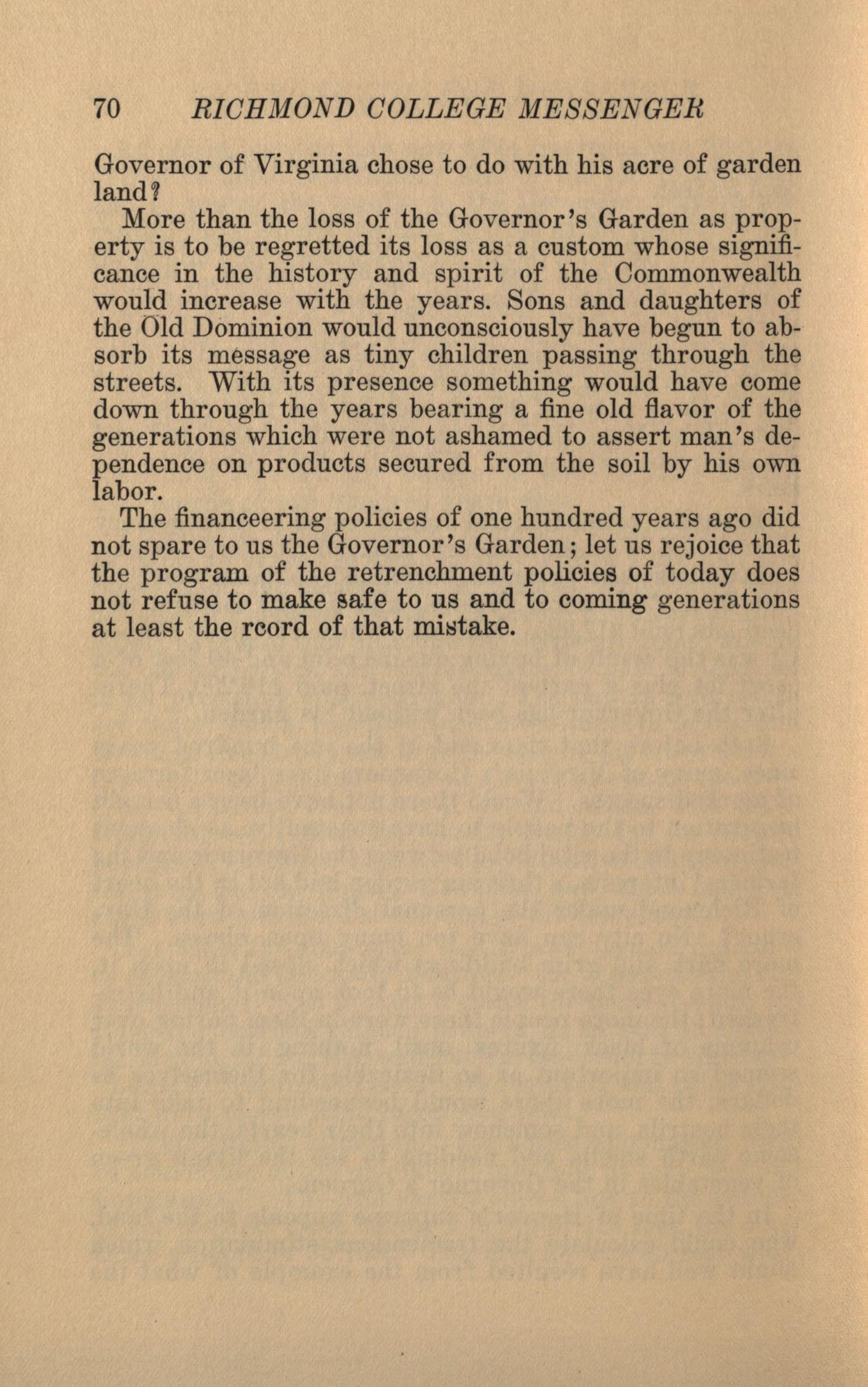
70 RICHMOND COLLEGE MESSENGER
Governor of Virginia chose to do with his acre of garden land1
More than the loss of the Governor's Garden as property is to be regretted its loss as a custom whose significance in the history and spirit of the Commonwealth would increase with the years. Sons and daughters of the Old Dominion would unconsciously have begun to absorb its message as tiny children passing through the streets. With its presence something would have come down through the years bearing a fine old flavor of the generations which were not ashamed to assert man's dependence on products secured from the soil by his own labor.
The :financeering policies of one hundred years ago did not spare to us the Governor's Garden; let us rejoice that the program of the retrenchment policies of today does not refuse to make safe to us and to coming generations at least the rcord of that mistake.
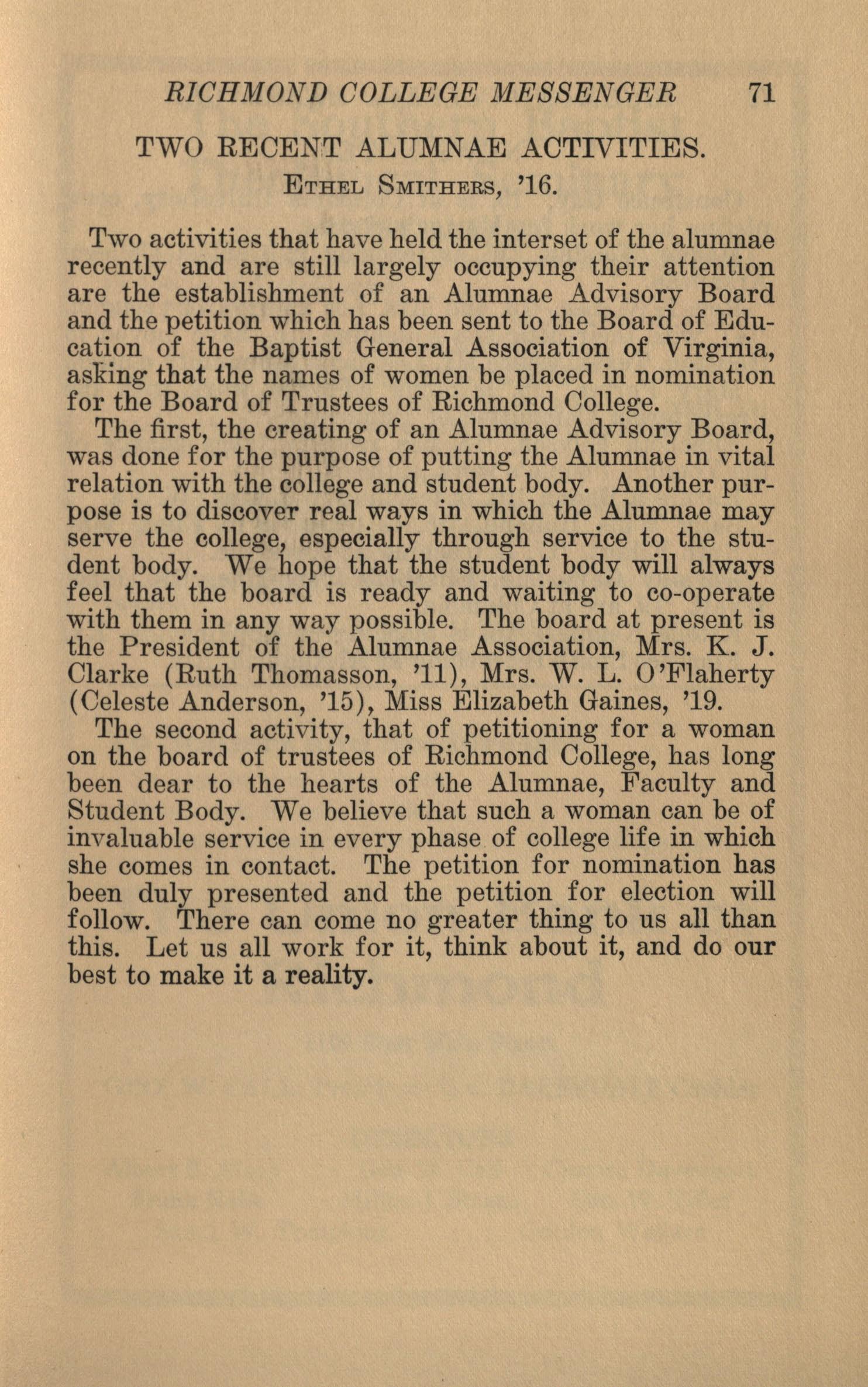
TWO RECEN.T ALUMNAE ACTIVITIES.
ETHEL SMITHERS, '16.
Two activities that have held the interset of the alumnae recently and are still largely occupying their attention are the establishment of an Alumnae Advisory Board and the petition which has been sent to the Board of Education of the Baptist General Association of Virginia, asking that the names of women be placed in nomination for the Board of Trustees of Richmond College.
The first, the creating of an Alumnae Advisory Board, was done for the purpose of putting the Alumnae in vital relation with the college and student body. Another purpose is to discover real ways in which the Alumnae may serve the college, especially through service to the student body. We hope that the student body will always feel that the board is ready and waiting to co-operate with them in any way possible. The board at present is the President of the Alumnae Association, Mrs. K. J. Clarke (Ruth Thomasson, '11), Mrs. W. L. O'Flaherty ( Celeste Anderson, '15), Miss Elizabeth Gaines, '19.
The second activity, that of petitioning for a woman on the board of trustees of Richmond College, has long been dear to the hearts of the Alumnae, Faculty and Student Body. We believe that such a woman can be of invaluable service in every phase of college life in which she comes in contact. The petition for nomination has been duly presented and the petition for election will follow. There can come no greater thing to us all than this. Let us all work for it, think about it, and do our best to make it a reality.
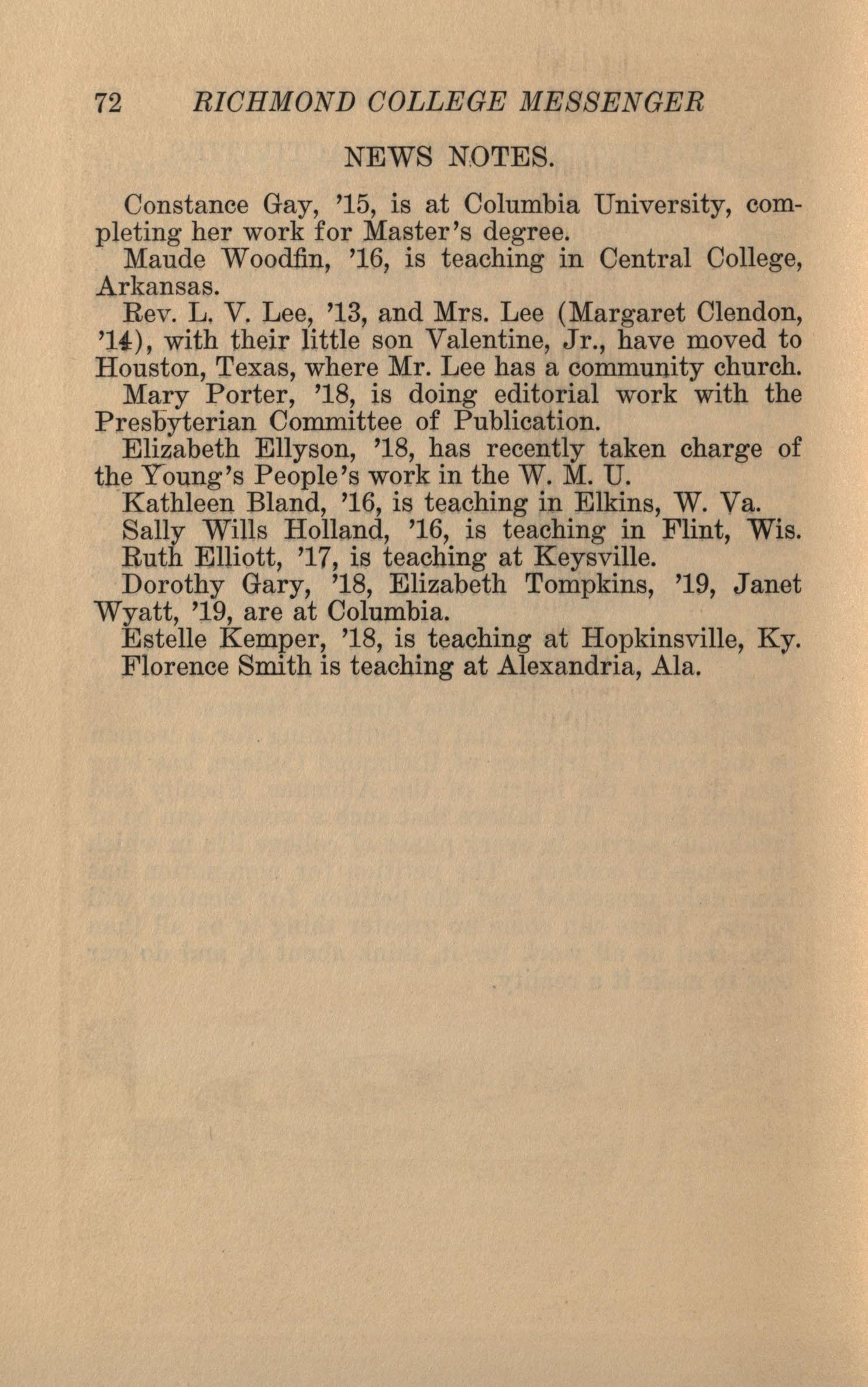
NEWS NOTES.
Constance Gay, '15, is at Columbia University, completing her work for Master's degree.
Maude Woodfin, '16, is teaching in Central College, Arkansas.
Rev. L. V. Lee, '13, and Mrs. Lee (Margaret Clendon, '14:),with their little son Valentine, Jr., have moved to Houston, Texas, where Mr. Lee has a community church.
Mary Porter, '18, is doing editorial work with the Presoyterian Committee of Publication.
Elizabeth Ellyson, '18, has recently taken charge of the Young's People's work in the W. M. U.
Kathleen Bland, '16, is teaching in Elkins, W. Va.
Sally Wills Holland, '16, is teaching in Flint, Wis.
Ruth Elliott, '17, is teaching at Keysville.
Dorothy Gary, '18, Elizabeth Tompkins, '19, Janet Wyatt, '19, are at Columbia.
Estelle Kemper, '18, is teaching at Hopkinsville, Ky.
Florence Smith is teaching at Alexandria, Ala.
The Southern Baptist Theological Seminary
LOUISVILLE, KY.
Courses of study include all departments usually found
in theological semi:µaries.
TUITION FREE MOD ERA TE COST
SESSION OPENS OCT. 1st.
·- SPECIAL ·F:gATUR'.ES .
English Bible courses, devoting 9 hours per week to careful study . under . professors who are experts in the original languages of Scripture.
School of Biblical Theology.
School of Comparative Religion and Missions.
School of Suqday School Pedagogy.
School of Christian Sociology.
Catalqgue ~iving GOmplete information sent free upo:q request.
Address E. Y. MULLIN$, Pres. Norton Hall, Louisville, Ky.
To Spiders and Spideresses
Success in your Class work.
Good luck in your Athletics.
Pleasure in tqe many activities of your College r,ife.
The Union Bank of ,
Richmond
1104 East Main Street
GEO. W . CALL, President C. C. BARKSDALE,Cashier
DIRECTORS
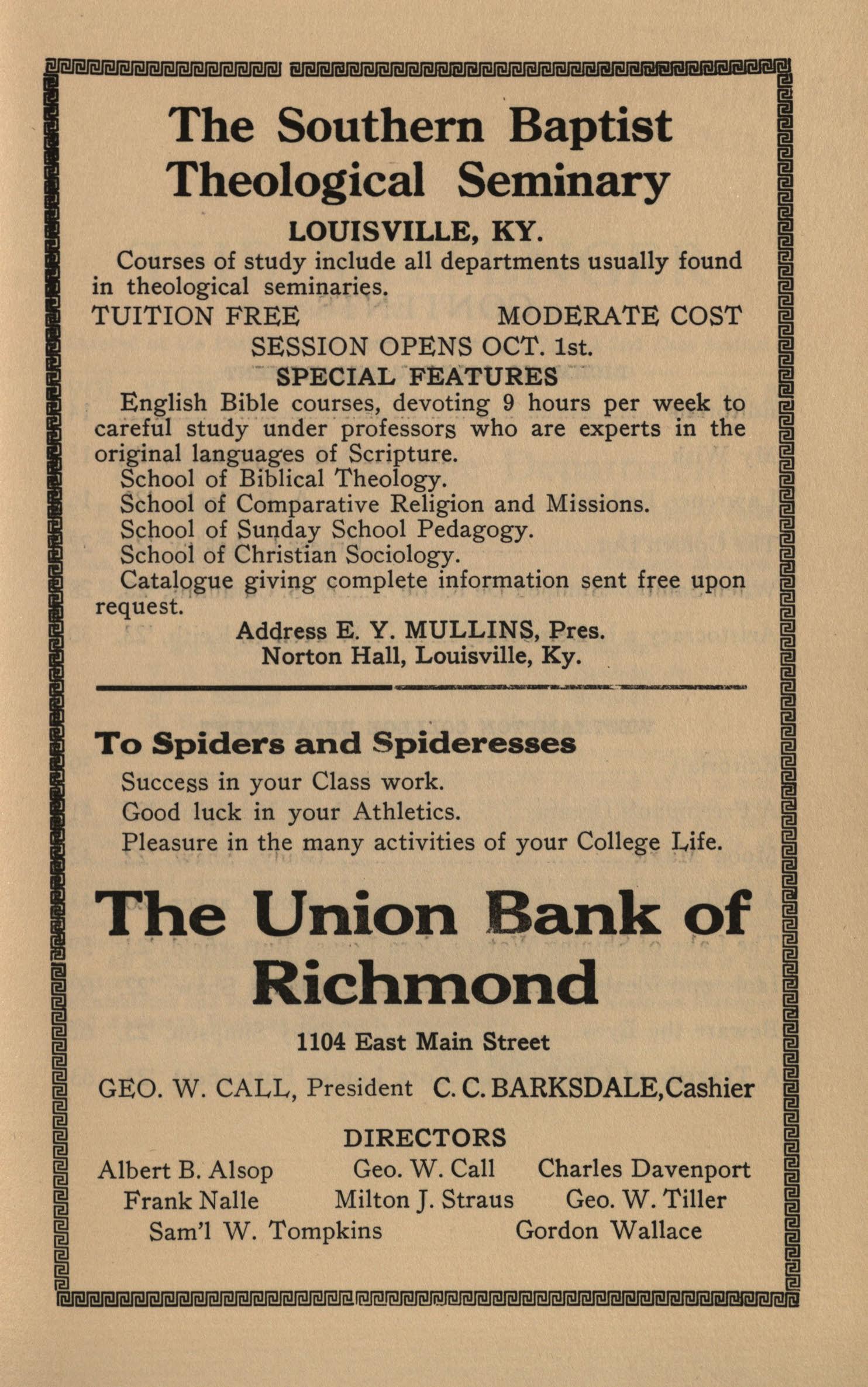
Albert B. Alsop
Frank Nalle
Geo. W. Call
Milton J. Straus
Sam'l W. Tompkins
Charles Davenport
Geo. W. Tiller
Gordon Wallace
